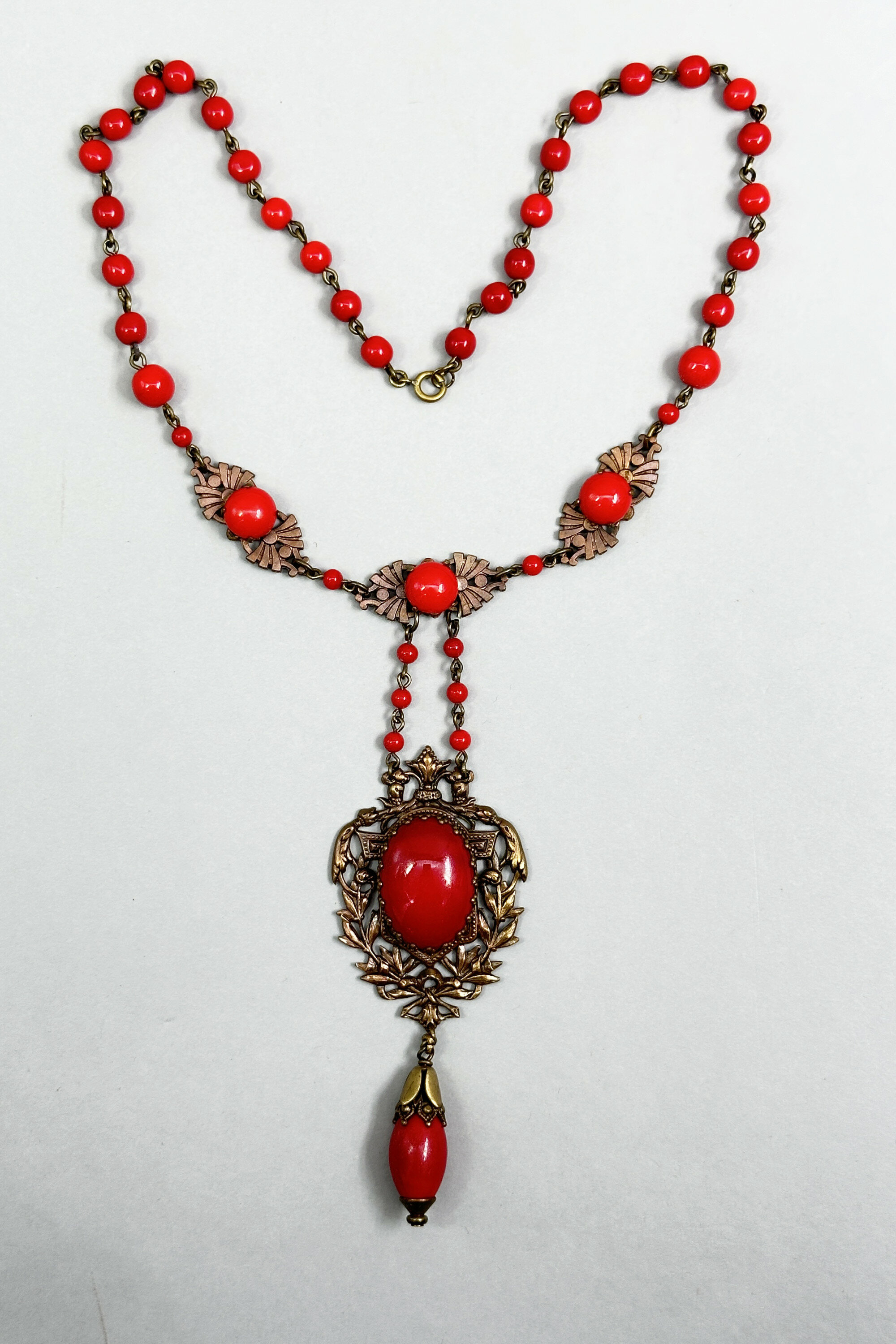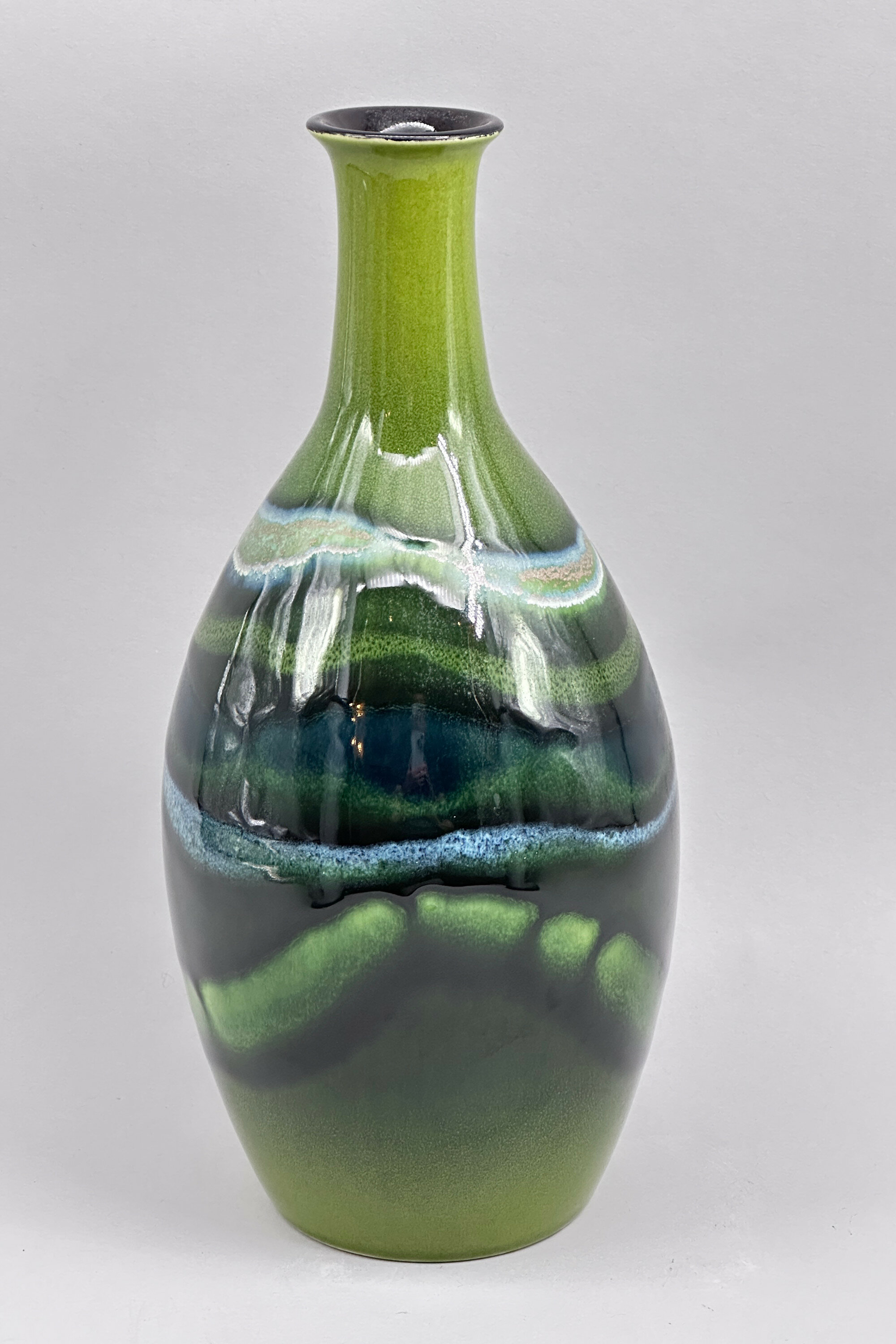
Poole Pottery Maya Pattern Bottle Vase, early C21st
Price: £85This fine quality vase is from the Maya range made by Poole Pottery, some of the pieces still being in production today and described in the maker’s catalogue as follows “Poole Pottery’s Maya collection is inspired by British landscapes and earthy tones. The greens and blues in this stunning range represent the earth meeting the sky in a natural yet bold design. Here at Poole Pottery, all our Maya ceramics are hand-cast and made using our signature reactive glaze in the famous Middleport Pottery in Staffordshire. The distinctive pieces you see here are created via our Living Glaze technique, where layers of colourful glazes react with one another to create a unique, glossy and dynamic finish.” But this particular form does not appear in the current catalogue and does not seem to be otherwise available. The form of the mark appears on other Poole pieces of more recent manufacture and dating is probably to around twenty years ago. The initials are for the artist’s signature and Poole write “Items are personalised with the artist's own individual mark, adding value to the collectability of each piece.” Given its scarcity, this vase would make an interesting addition to a collection of Poole Pottery aside from being a highly decorative item in its own right.
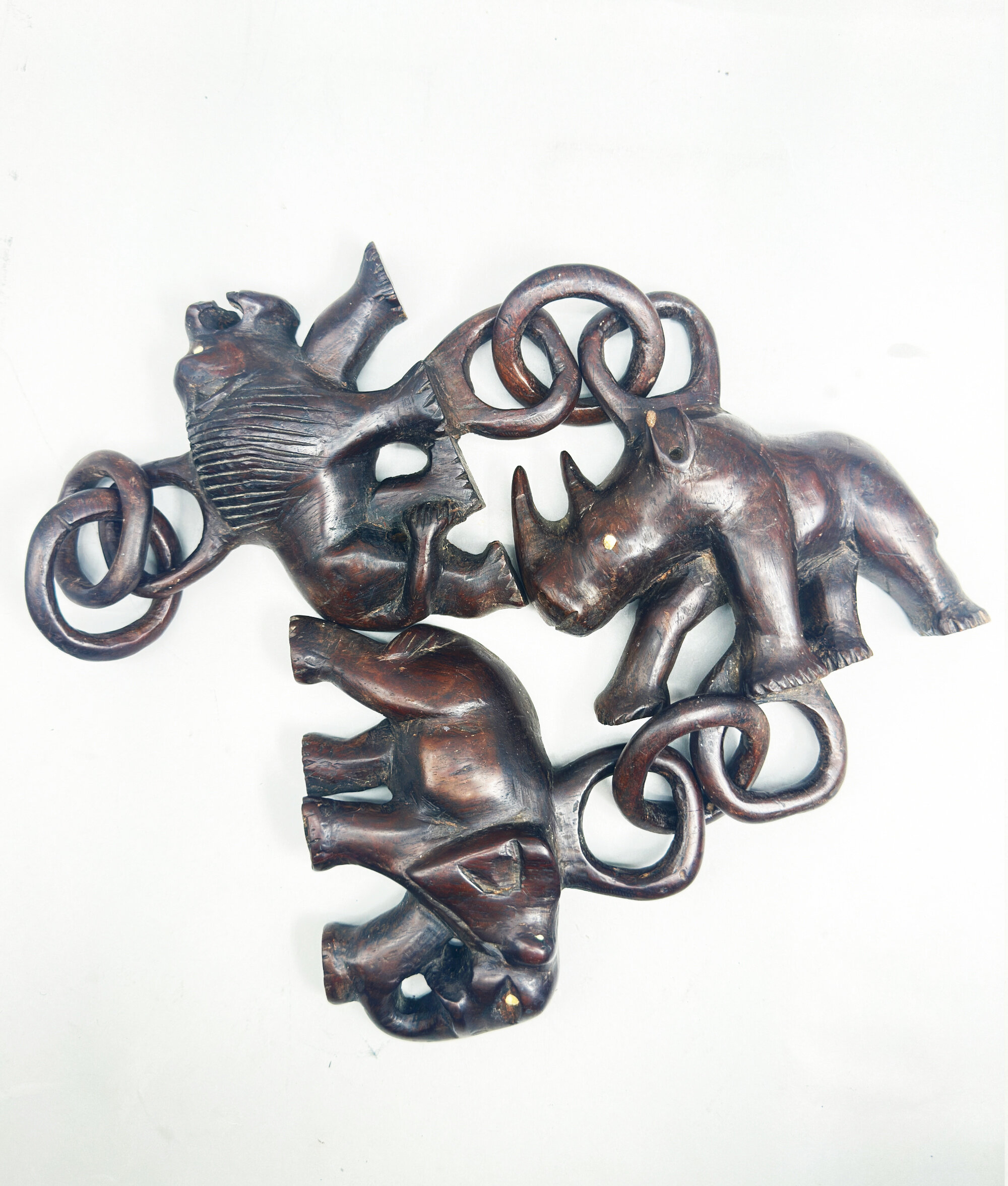
Large African wall decoration carved from one piece of ebony wood c1950
Price: £85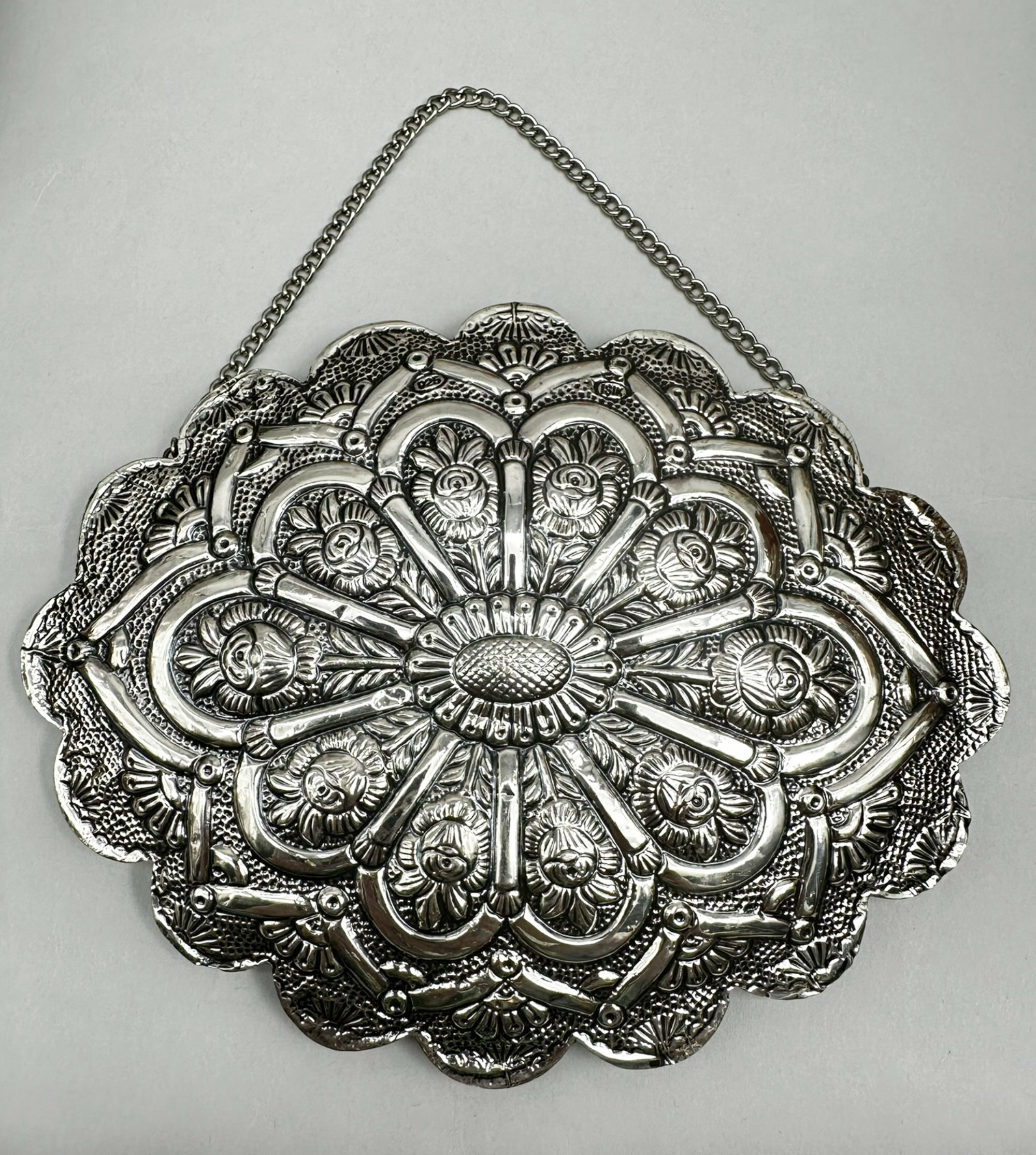
Outstanding Ottoman silver marriage mirror, Turkey early 20th century
Price: £125
Outstanding Suede Lanvin Clutch in original box 1950s
Price: £250
Unique 40 strand micro coral bead necklace, India 1910
Price: £150
Pair of Edwardian Chinese silver brooches, c. 1910
Price: £25
Victorian silver bracelet set with garnets 1900
Price: £35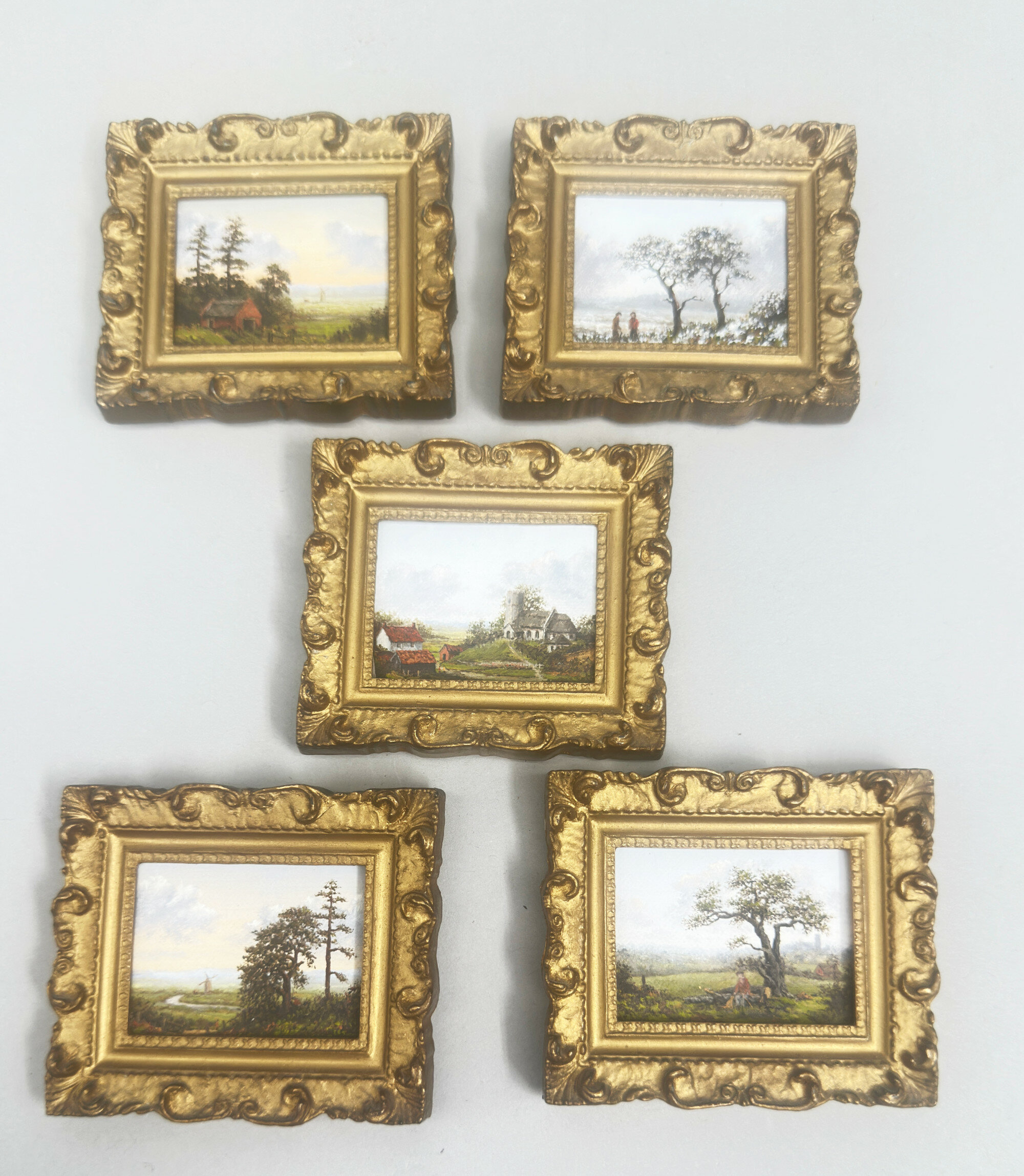
Set of five small landscape paintings attributed to Charles Boyland Turner, C20th
Price: £110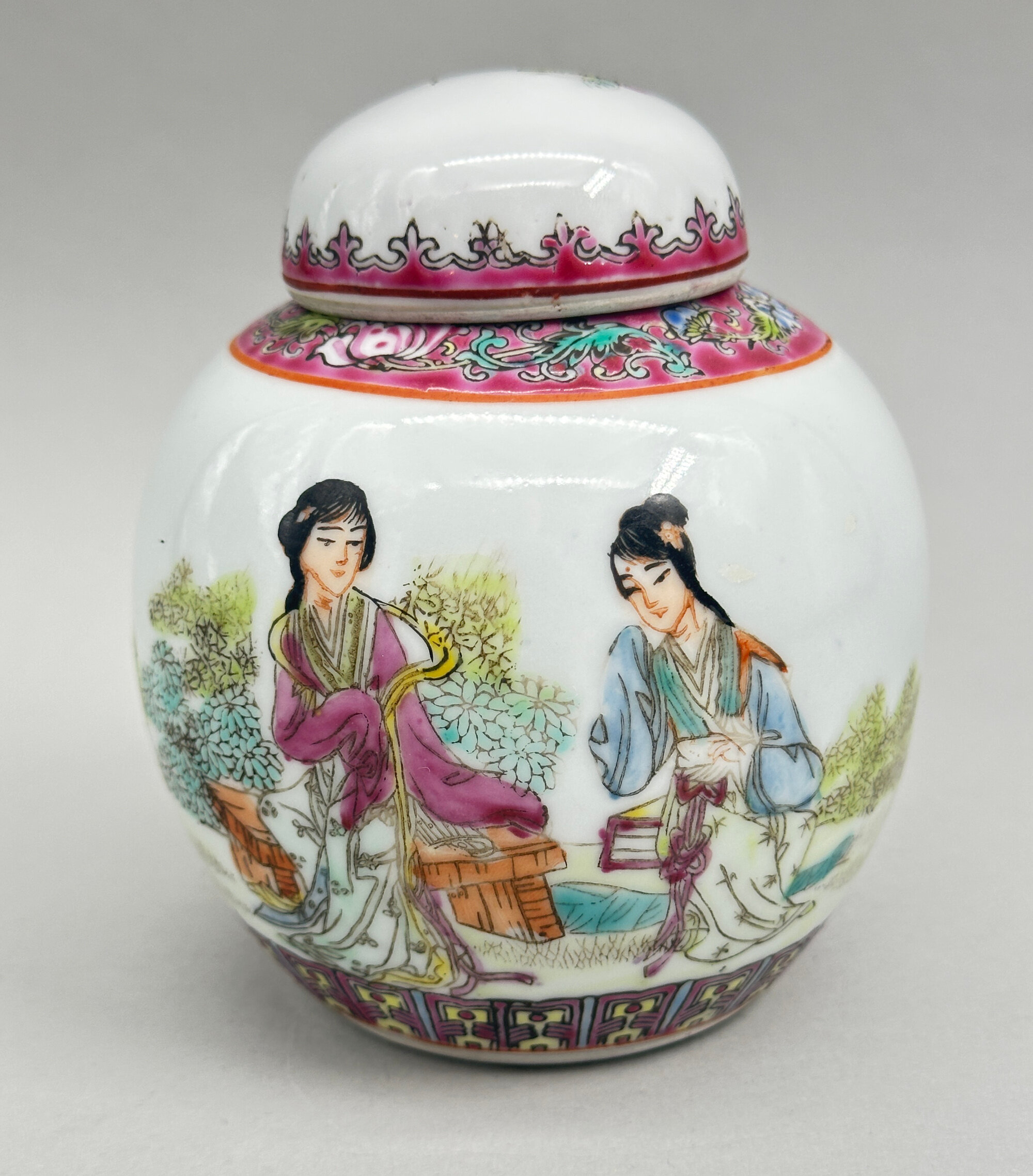
Chinese Republican Style small Famille Rose Ginger Jar and Cover, late c20th
Price: £20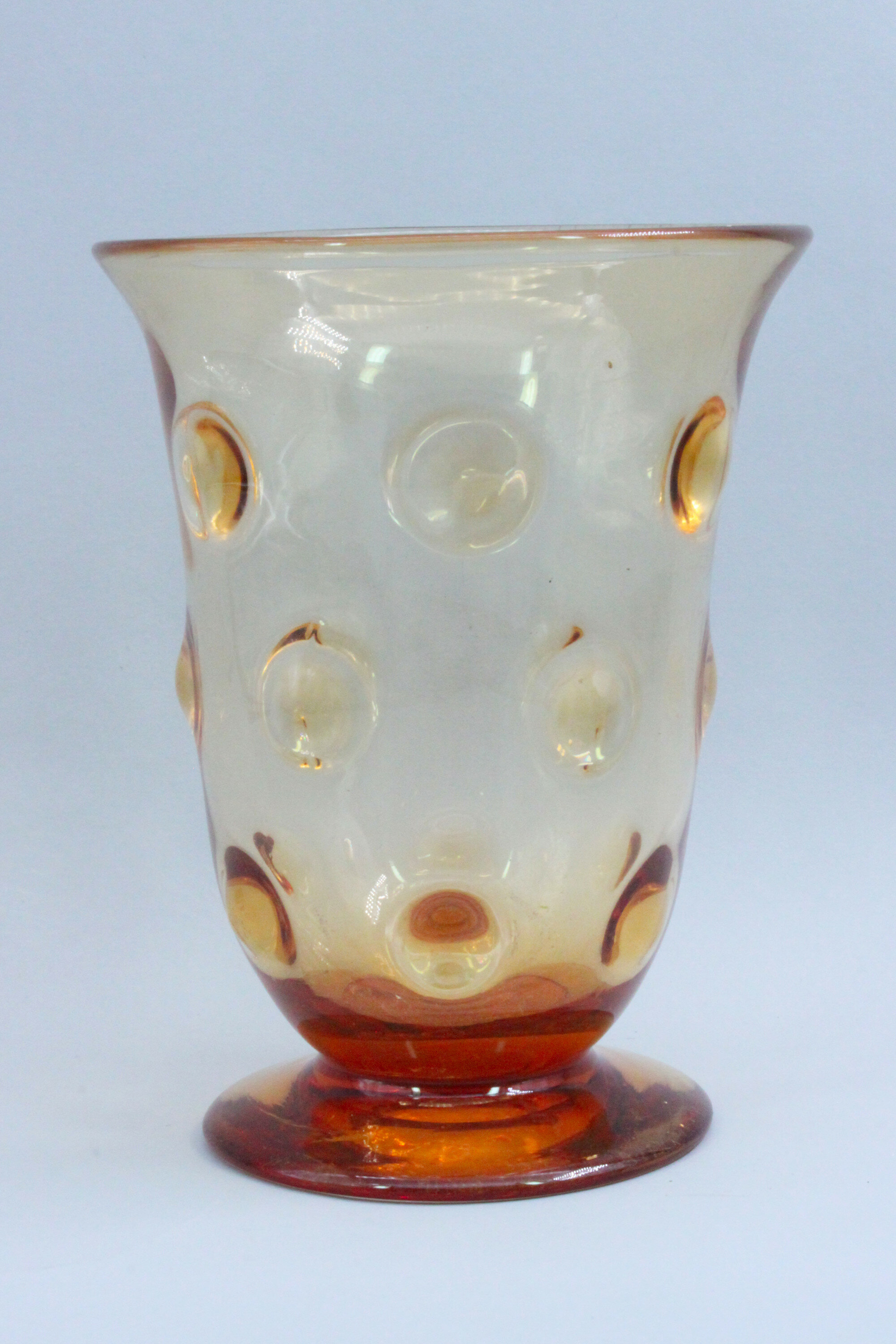
Golden Amber Webb Glass Vase, marked, 1950s
Price: £45Thomas Webb began his glass career in 1829, when he became a partner in the Wordsley Glassworks. Various career changes followed and in 1859 he was joined by his sons Thomas Wilkes Webb and Charles Webb and began trading as Thomas Webb & Sons based in Stourbridge. The firm was run by various family members until mergers started to occur in the early twentieth century and Sven Fogelberg, previously from Swedish glassworks Kosta, became manager in 1932. Production continued with more mergers in the 1960s and 1970s until the firm closed in 1990. This vase was made by Thomas Webb during the 1950s as part of their 'Gay Glass' range in a design called 'Old English Bull's Eye' and has the typical 'Webb England' mark to the base.
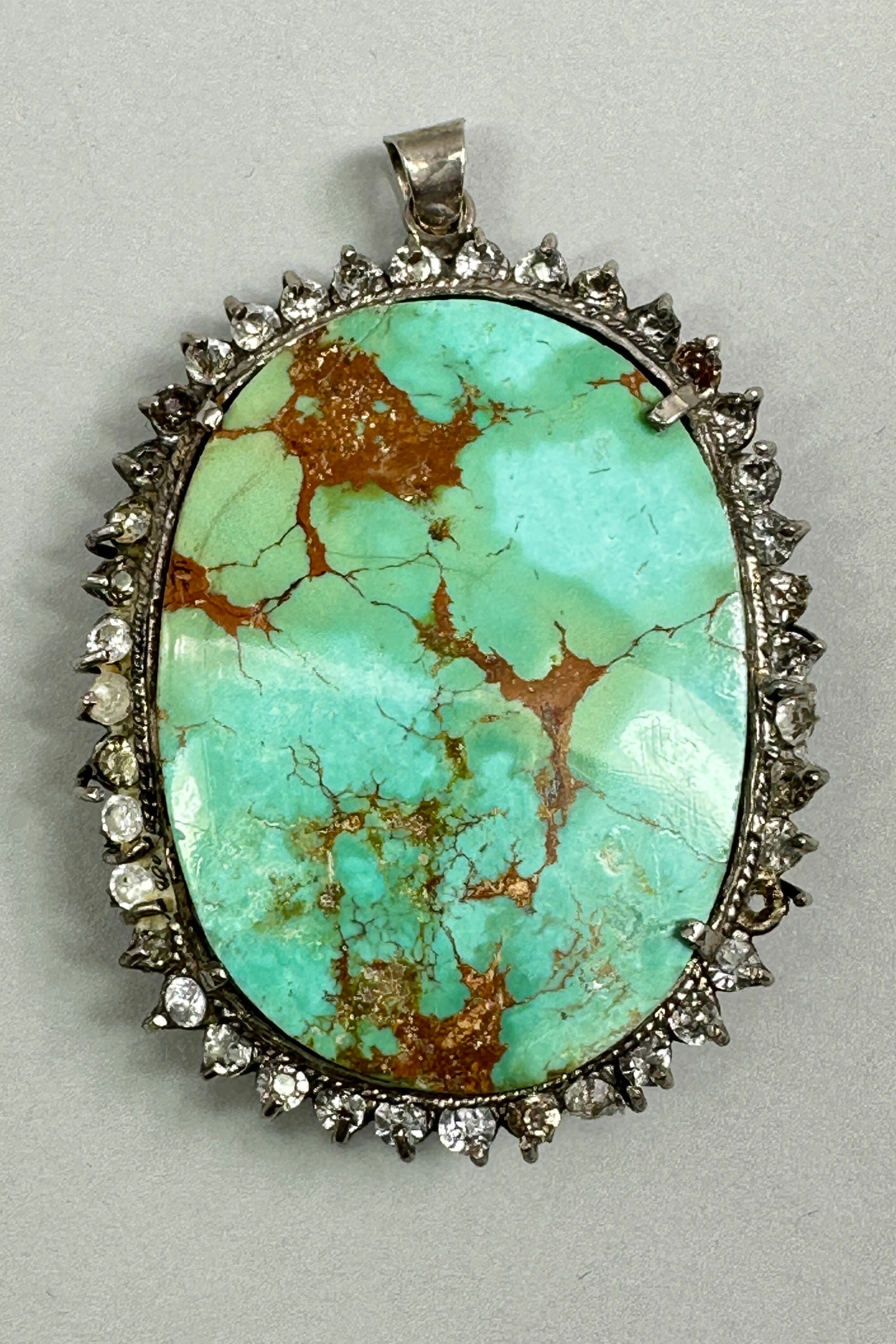
Large Victorian turquoise Pendant, Indian c1900
Price: £95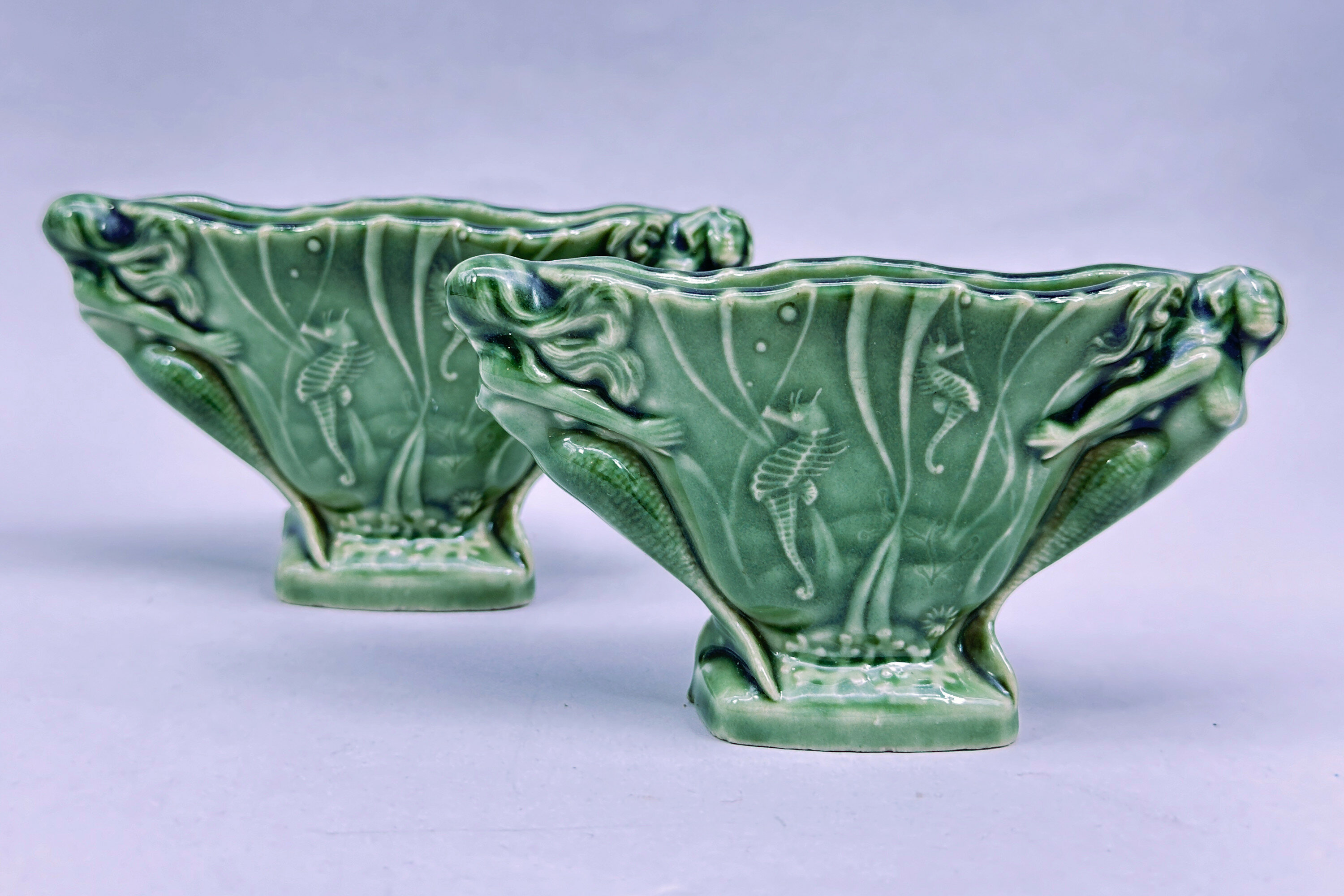
Pair of Wade green glazed Mermaid salts, 1950s
Price: £55Wade Ceramics Ltd was a manufacturer of porcelain and earthenware, headquartered in Stoke-on-Trent, England. Founded in 1867, it was run by various members of the Wade family until the death of George Anthony Wade in 1987 after which there was a succession of management buyouts. Despite substantial investment in 2009, the firm eventually went into administration in 2022. Wade produced a wide variety of ceramics, including the well known Wade Whimsies animal figurines.
This pair of salts is rather different to many of their productions and have a distinctly ‘Art Nouveau’ feel but, in fact, date to the 1950s when this particular format of the factory mark was used. It seems to be one of the rarer forms and pairs are even rarer still, so definitely one for Wade collectors!
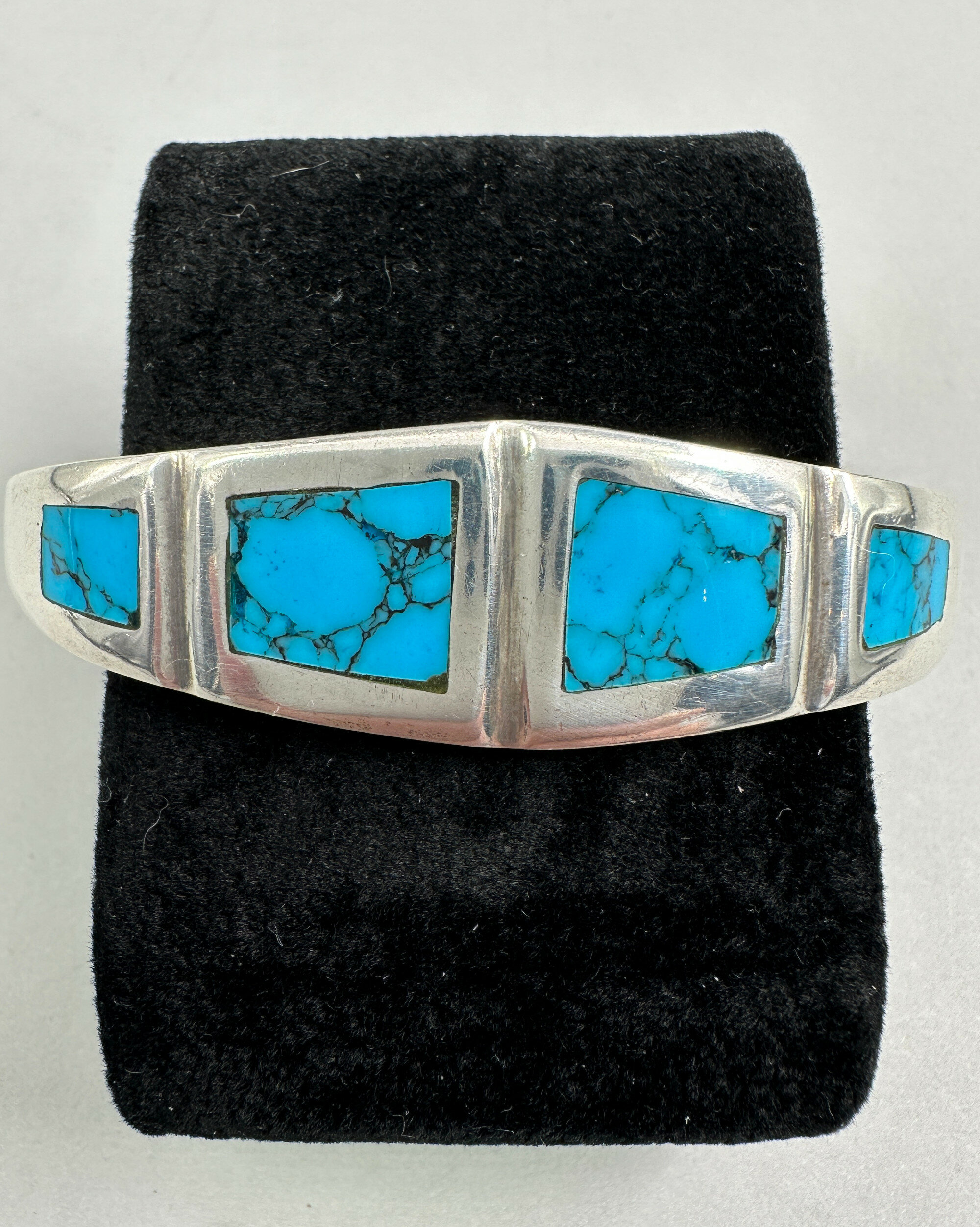
Mexican silver bracelet set with turquoise plaques, c1990
Price: £75
An Arts and Crafts small Brass Tray, English early twentieth century
Price: £40
An Arts and Crafts small Brass serving Tray, English early twentieth century
Price: £40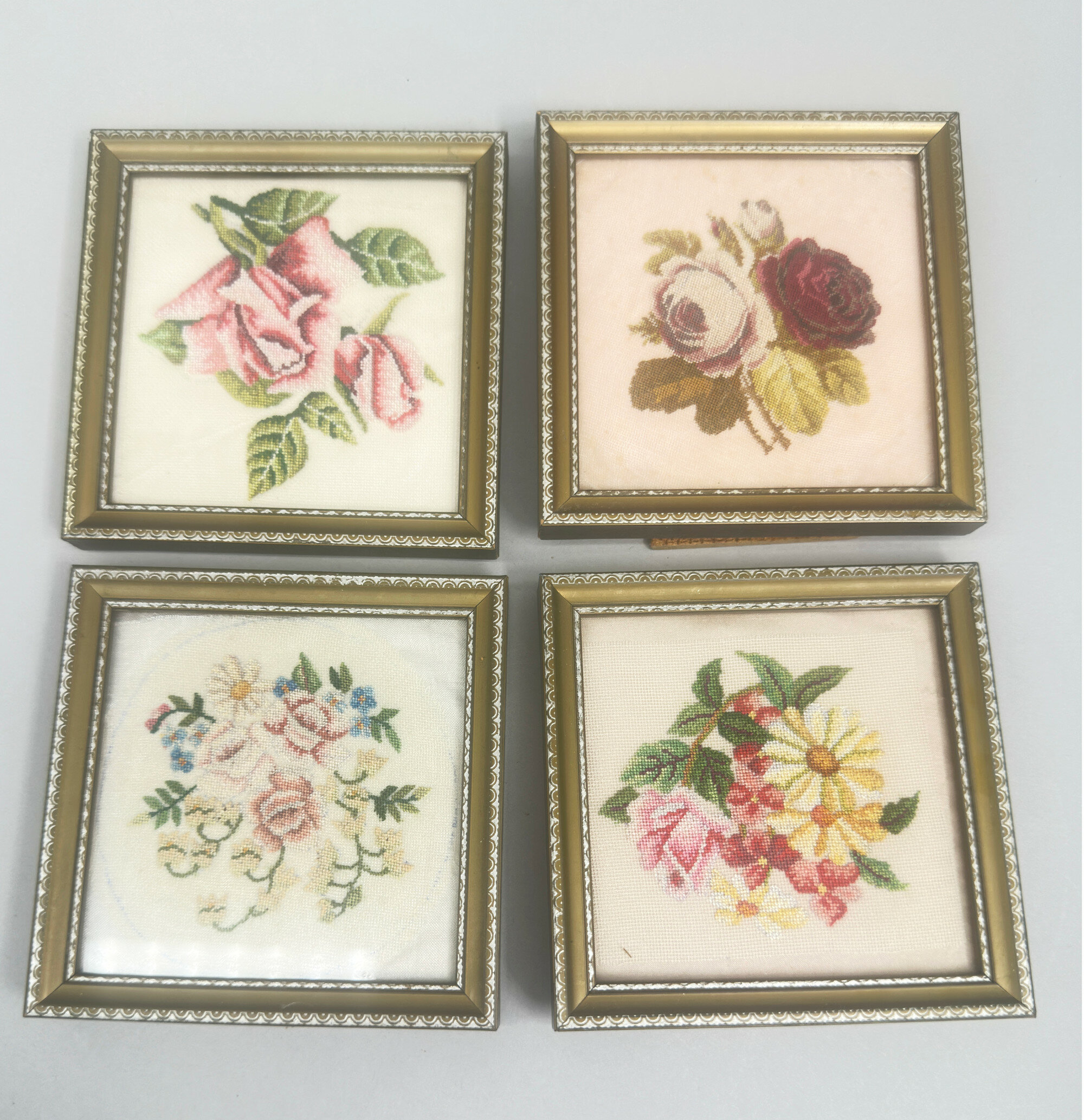
Set of four Petit Point needlepoint stitch framed floral Wall Hangings, mid C20th
Price: £45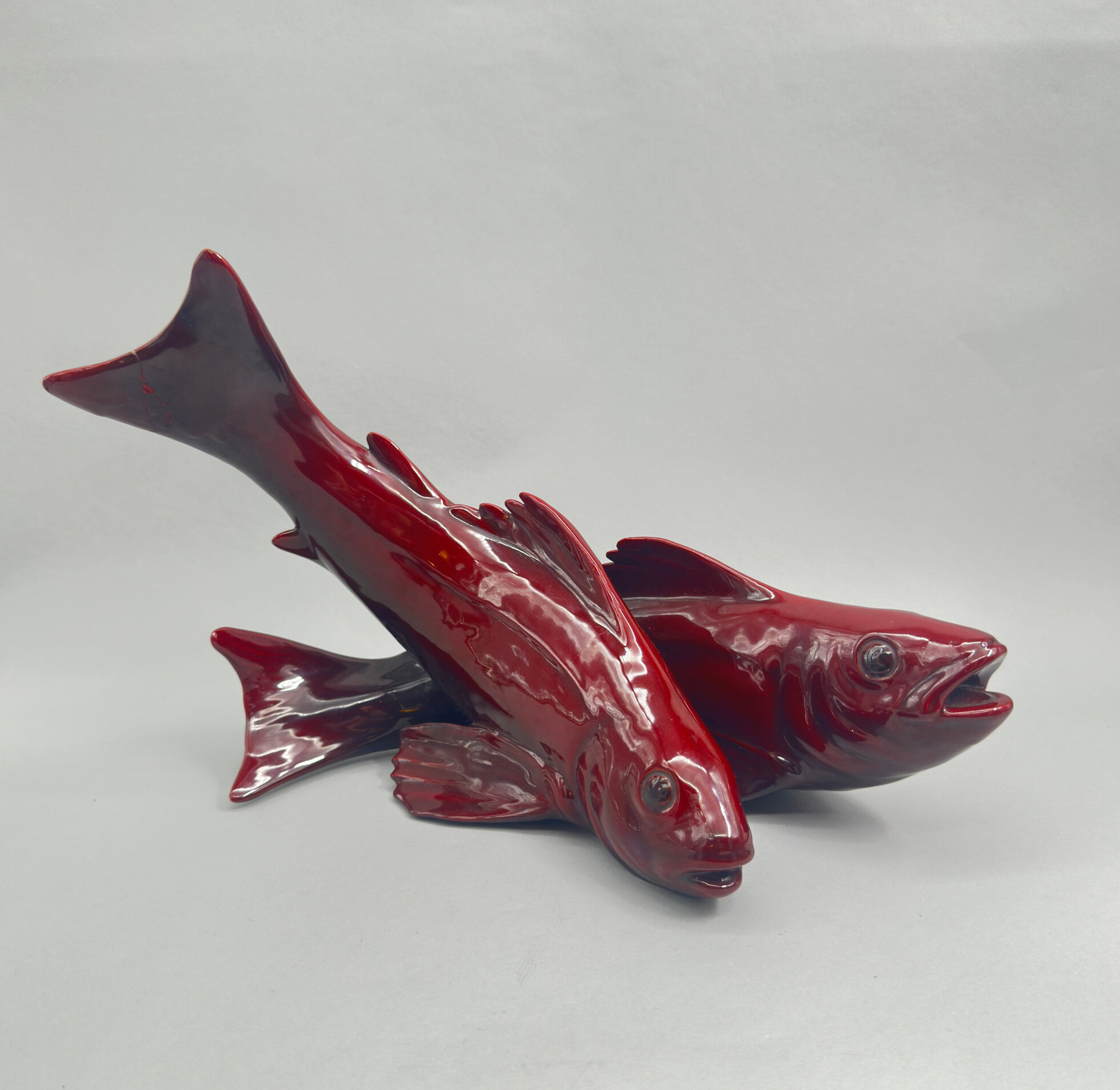
An Art Deco ceramic group of two Fish by Guido Cacciapuoti, signed, 1930s
Price: £150Guido Cacciapuoti was a celebrated Italian ceramicist. Born in Naples in 1892 and from a family with a tradition in the creation of majolica pottery, Guido exhibited his work widely in the 1920s and finally, in collaboration with his brother, Mario, and Angelo Bignami as the administrative and commercial director, he founded the factory ‘Gres d'Arte Cacciapuoti Bignami & C.' in Milan in 1927. Mario unfortunately died three years later leaving Guido to carry on on his own until his death in 1953.
In the 1930s, Guido’s workshop became famous for the production of ceramic animal sculptures with fish being a particular speciality. More commonly seen are groups of John Dory, again with a red glaze, but the smoother lines here and the particularly intense colour reflect more closely the contemporary Art Deco style. Sought after in their own time, with patrons such as the King of Italy and Mussolini, Guido’s works are highly collectible today and this group would make a striking addition to a collection of Art Deco ceramics with considerable decorative appeal.
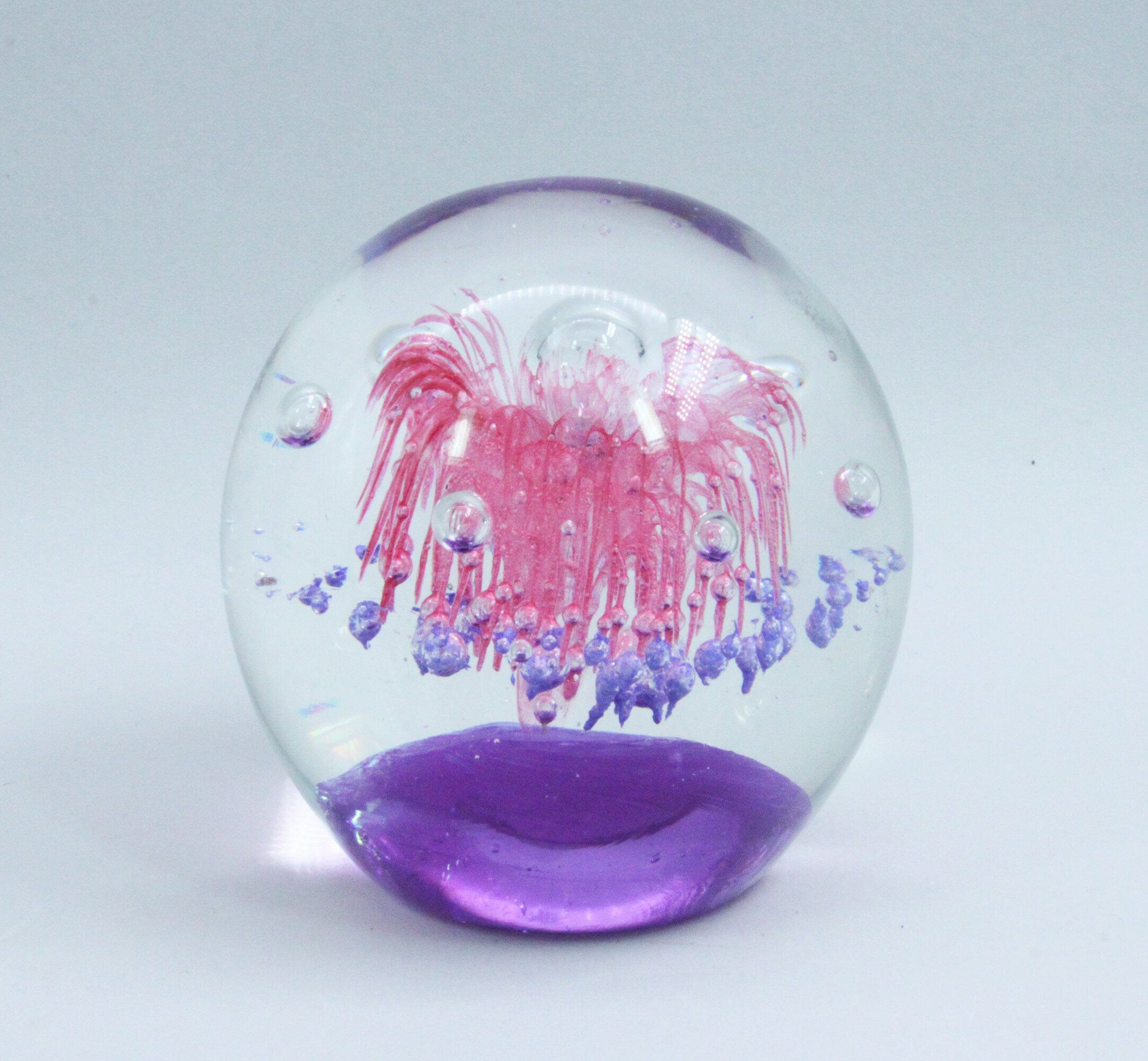
Art Glass Doorstop with Starburst and Bubble designs, perhaps British, late C20th
Price: £45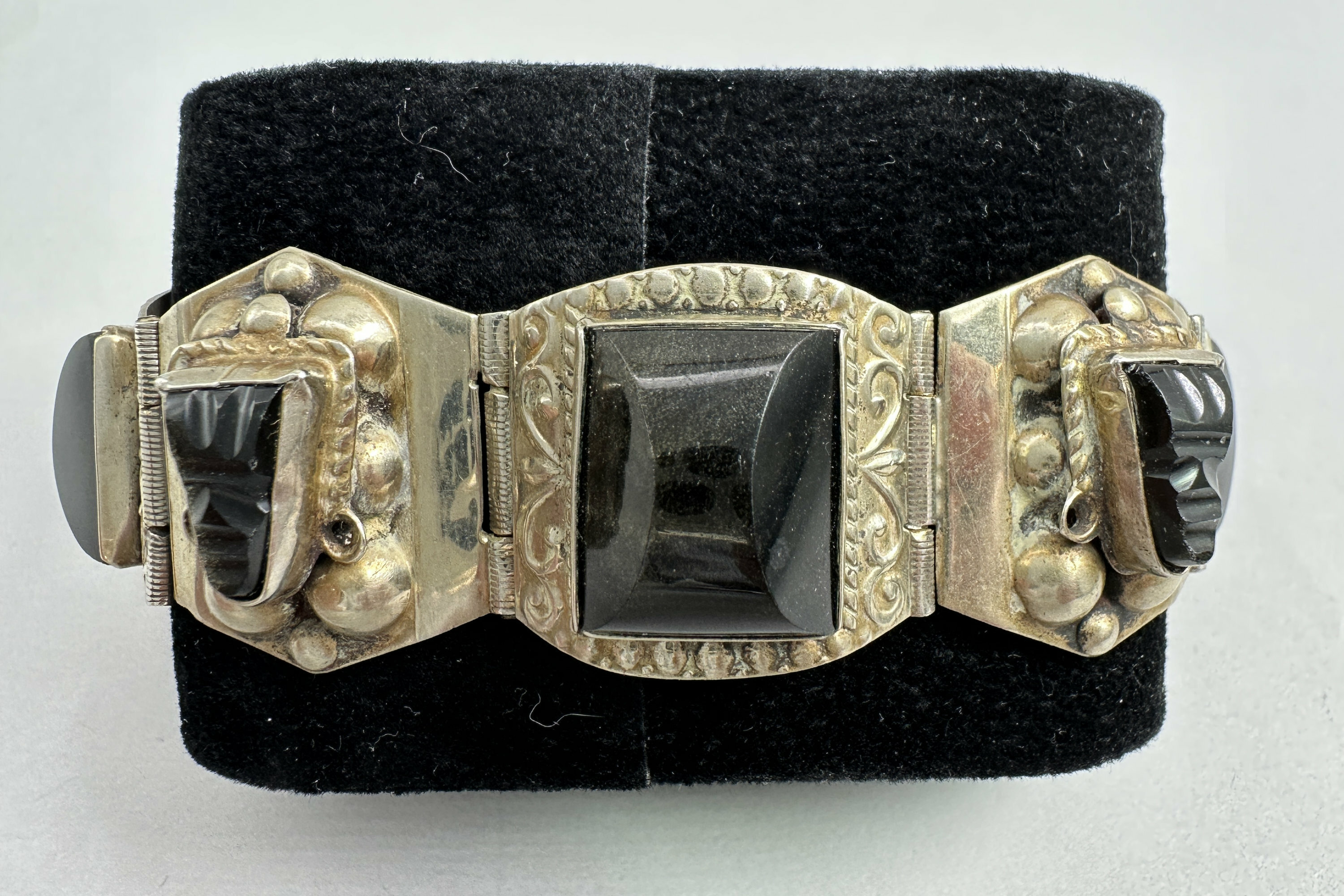
Taxco bracelet set with carved obsidian stones c1950
Price: £55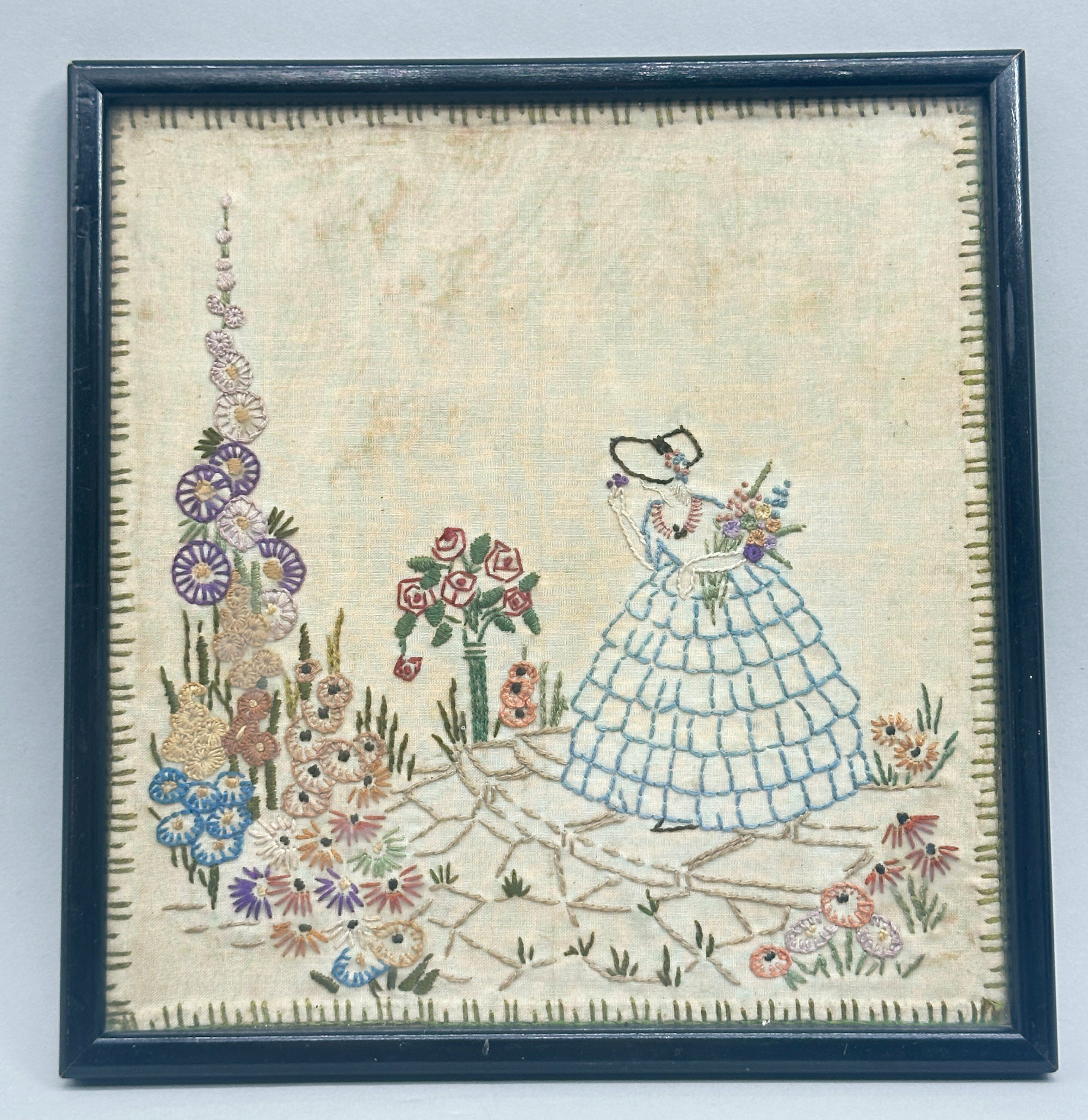
Vintage Needlepoint Picture of a lady dressed in a crinoline, framed, probably 1930s
Price: £25
Ceramic Model of a Fish, Jema Holland, signed, 1950s/1960s
Price: £30The Jema factory in Holland was started by two brothers, Jelis Mager ( born 1912 in Rotterdam, Netherlands) and his brother Johan Willem Mager (born 1919 also in Rotterdam) both living in Maastricht who took over an existing ceramics factory, founded originally by J.Meussen, in 1942 and traded together in a partnership which was dissolved in 1955 when the firm JEMA KERAMISCH ATELIER N.V. (jema ceramic studio; the first JE standing for Jelis and MA standing for Mager) was created under a new agreement between them. Ceramic products of many types were produced with figurines a speciality and the business continued until 1984 when it became insolvent and closed its doors.
Most of the pieces seem to have been marked, usually with an impressed script as here indicating the factory itself and the model number of the piece. For modest decorative items the quality of the manufacture is of a high standard as can be seen in both the modelling and the glazing of this piece. Their animal figurines were immediately approachable and provided modest but amusing items of decoration.
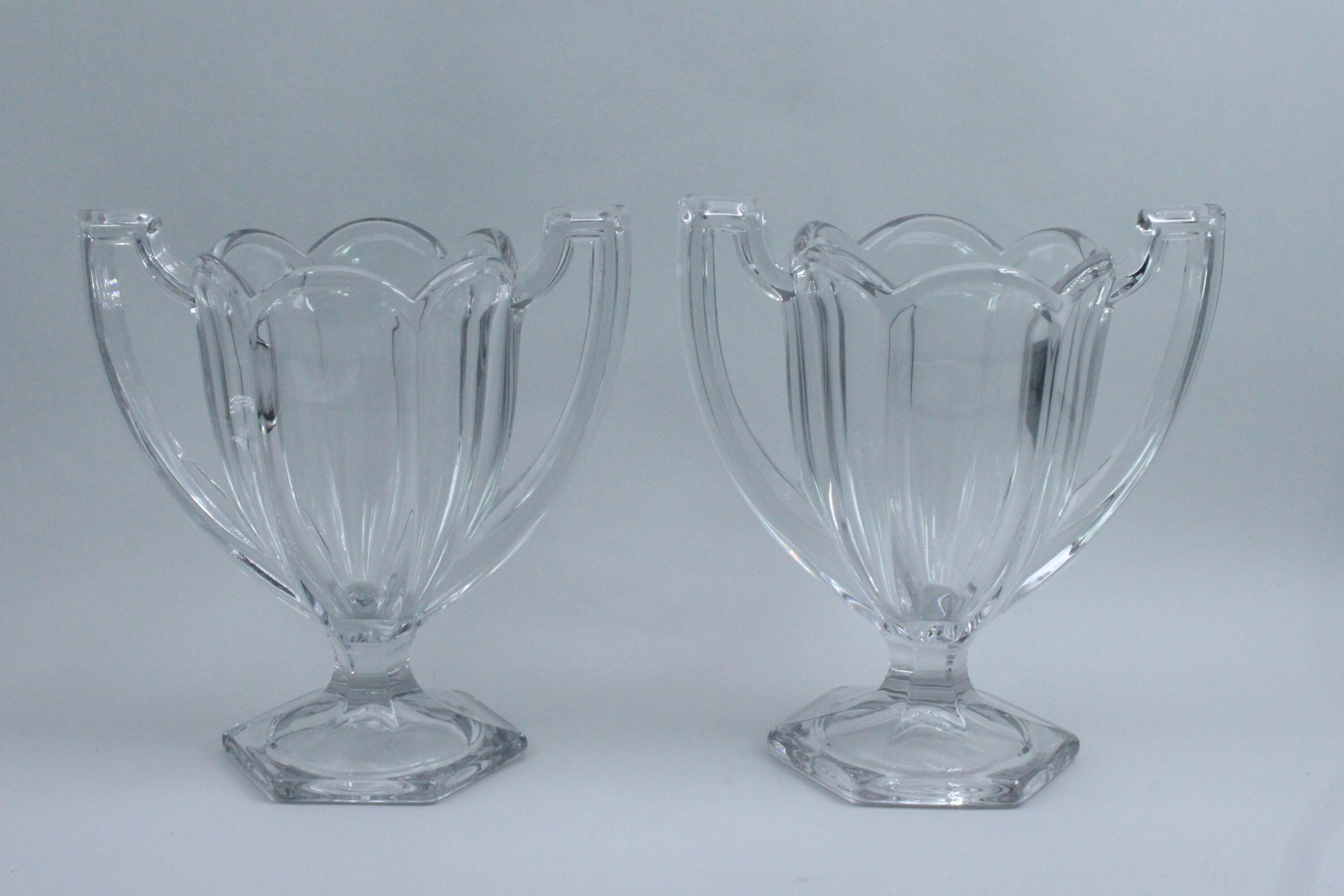
A Pair of Art Deco Pressed Glass Trophy Form Vases, Davidson, 1930s
Price: £45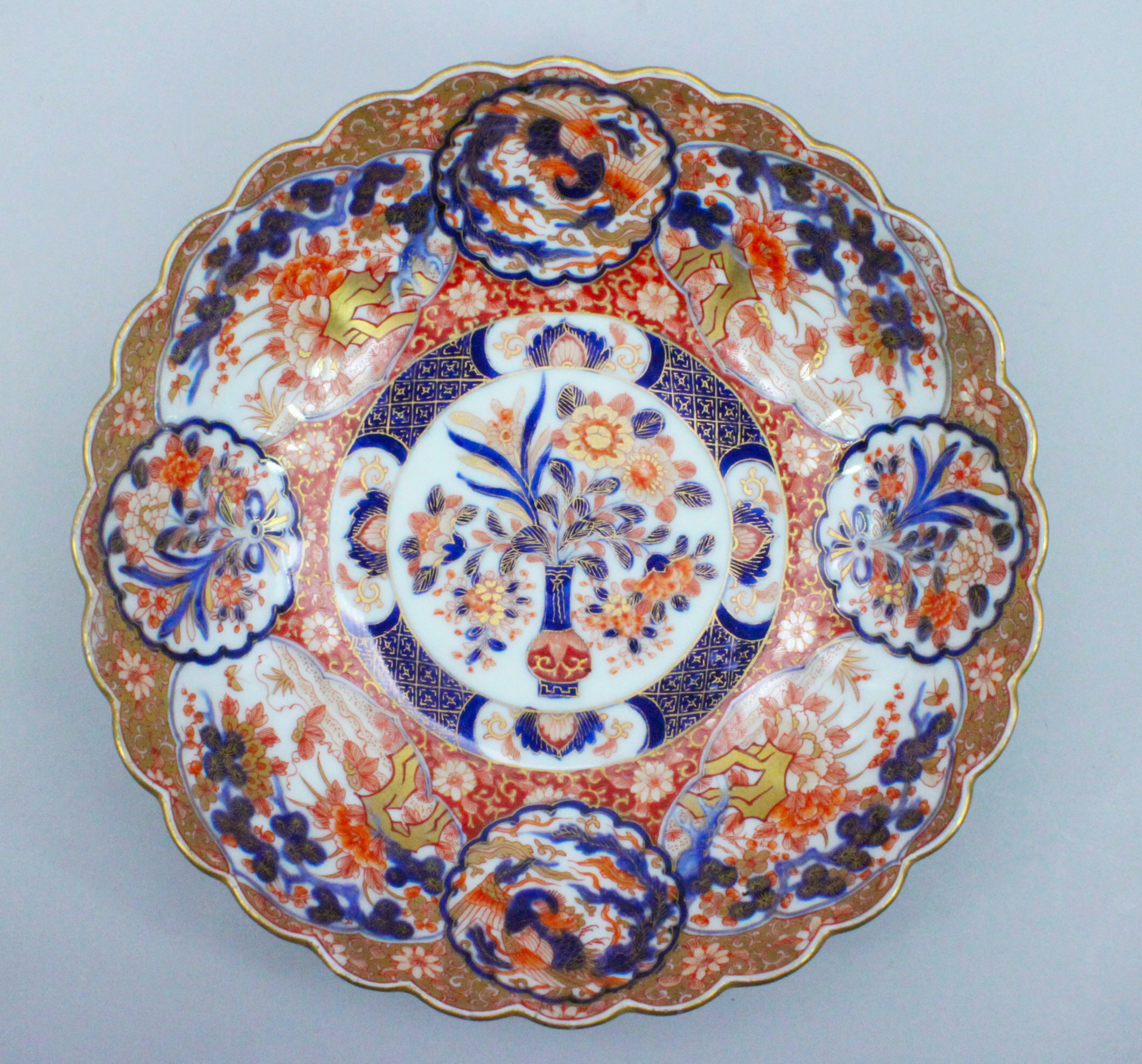
Japanese Fukagawa Imari Bowl, signed, circa 1880
Price: £380The Fukagawa kilns produced the best quality Imari items made in Japan in the late nineteenth century for export to the West. Their history starts with Ezaiemon Fukagawa who in 1856 became head of his family's porcelain business and in 1875 founded Koransha (The Company of the Scented Orchid) in Arita, Japan, to produce tableware for export. In 1894 the modern Fukagawa company was founded by Chuji Fukagawa, with the Fukagawa trade mark of Mount Fuji and a stream, as its trade mark. Dating here is within the Meiji period (1868 - 1912) probably around 1880. This conforms with the script mark used as opposed to the later symbol design.
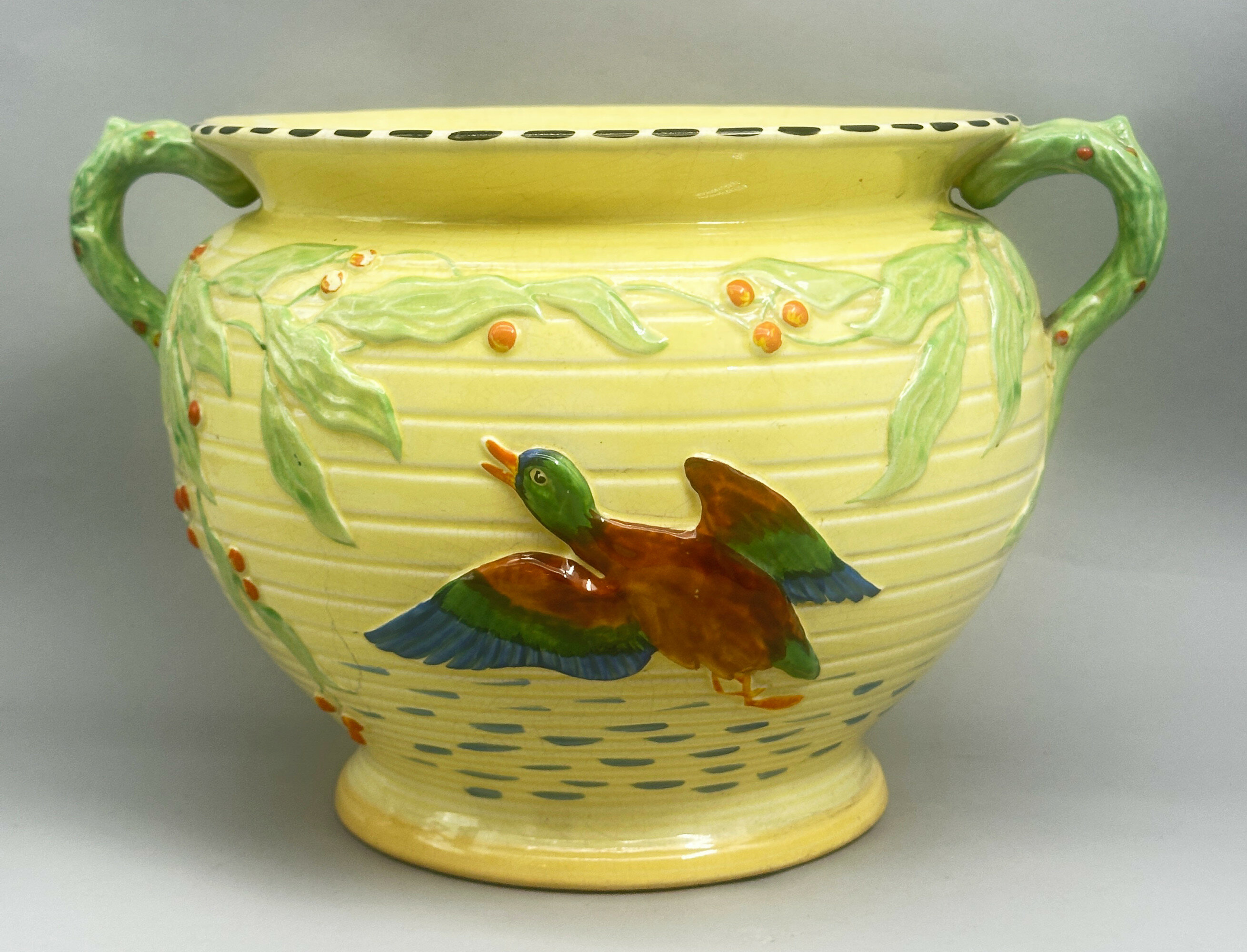
Falcon Ware Jardiniere decorated Mallard Duck and Foliage, 1930s
Price: £65Falcon Ware was the trade name for pieces produced by Thomas Lawrence, later Thomas Lawrence (Longton) Ltd, a business founded by Thomas Lawrence in 1885 which moved to the Falcon works, Longton, in 1895. In the same year he took his nephew, John Grundy into partnership and around 1920 Grundy became the Managing Director. Thomas Lawrence died in April 1932 and John Grundy became the sole proprietor until his death in 1938 when the business was sold to Grundy's son-in-law Mr Richard Hull (jnr) and Mr. E.J. Dennis and the name was changed to 'Thomas Lawrence (Longton) Limited'. At the same time the firm merged with Shaw and Copestake Ltd of which Richard Hull was a Director but the two businesses still operated independently until 1962 when the Thomas Lawrence business was fully subsumed by its partner with the ‘Falcon’ name ceasing to be used two years later in 1964.
Falcon Ware was known for colourful and decorative designs often with naturalistic themes. This jardiniere is an excellent and unusual example. The cipher ‘LG’, for Lawrence and Grundy, which is not so often found, implies a dating to the 1930s which corresponds with the general style of the piece with its hint of Art Deco associations.
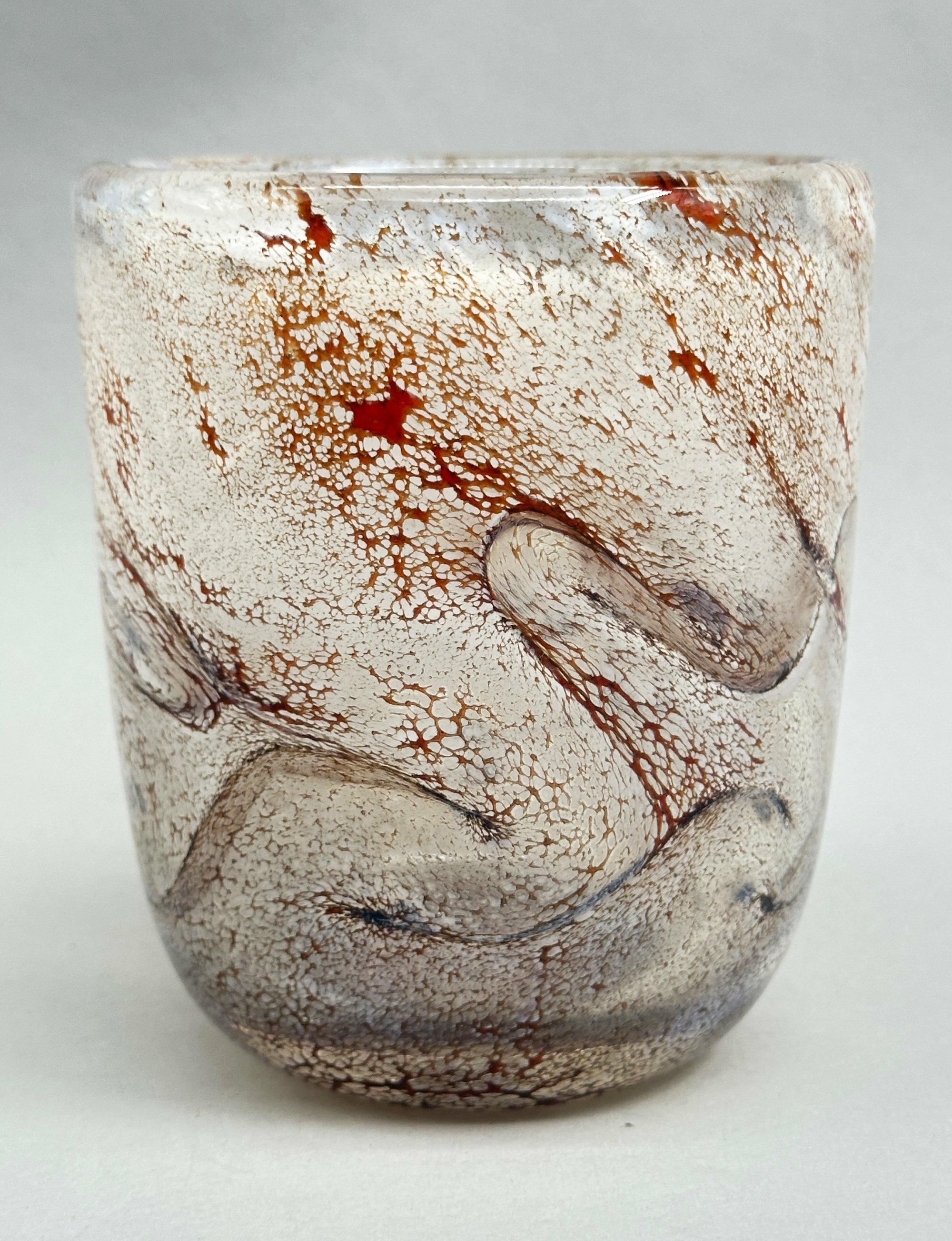
Uredale Glass Vase, late C20th/early C21st
Price: £55
Chinese Bone Netsuke carving of a Sage, early C20th
Price: £45
Round pendant set with turquoise, Mexico, c1970, the chain later.
Price: £65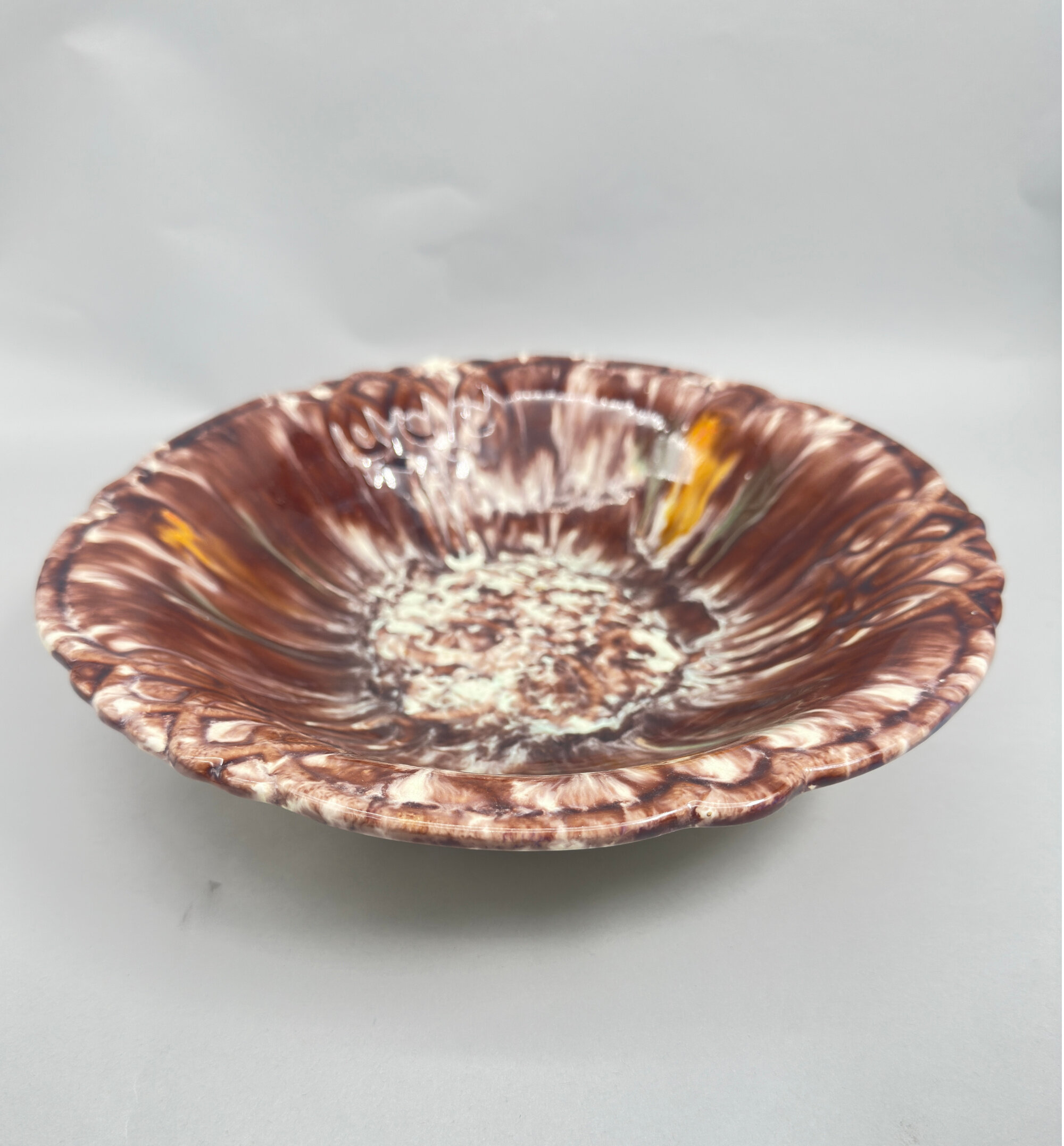
Majolica Footed Fruit Bowl, Germany, 1930s
Price: £55
Japanese silver souvenir brooch c1950
Price: £18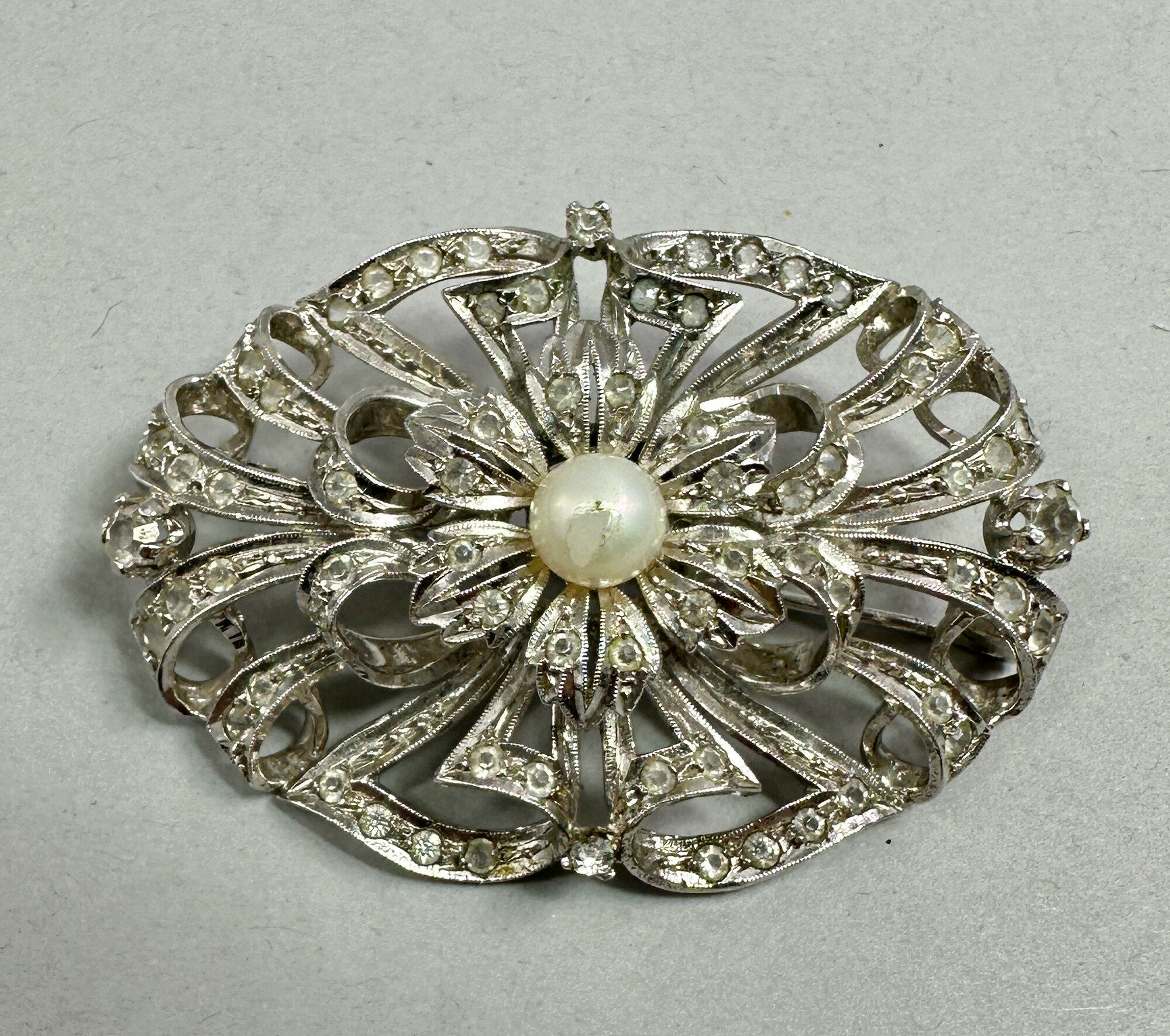
Incredible quality silver and paste Brooch c1950
Price: £35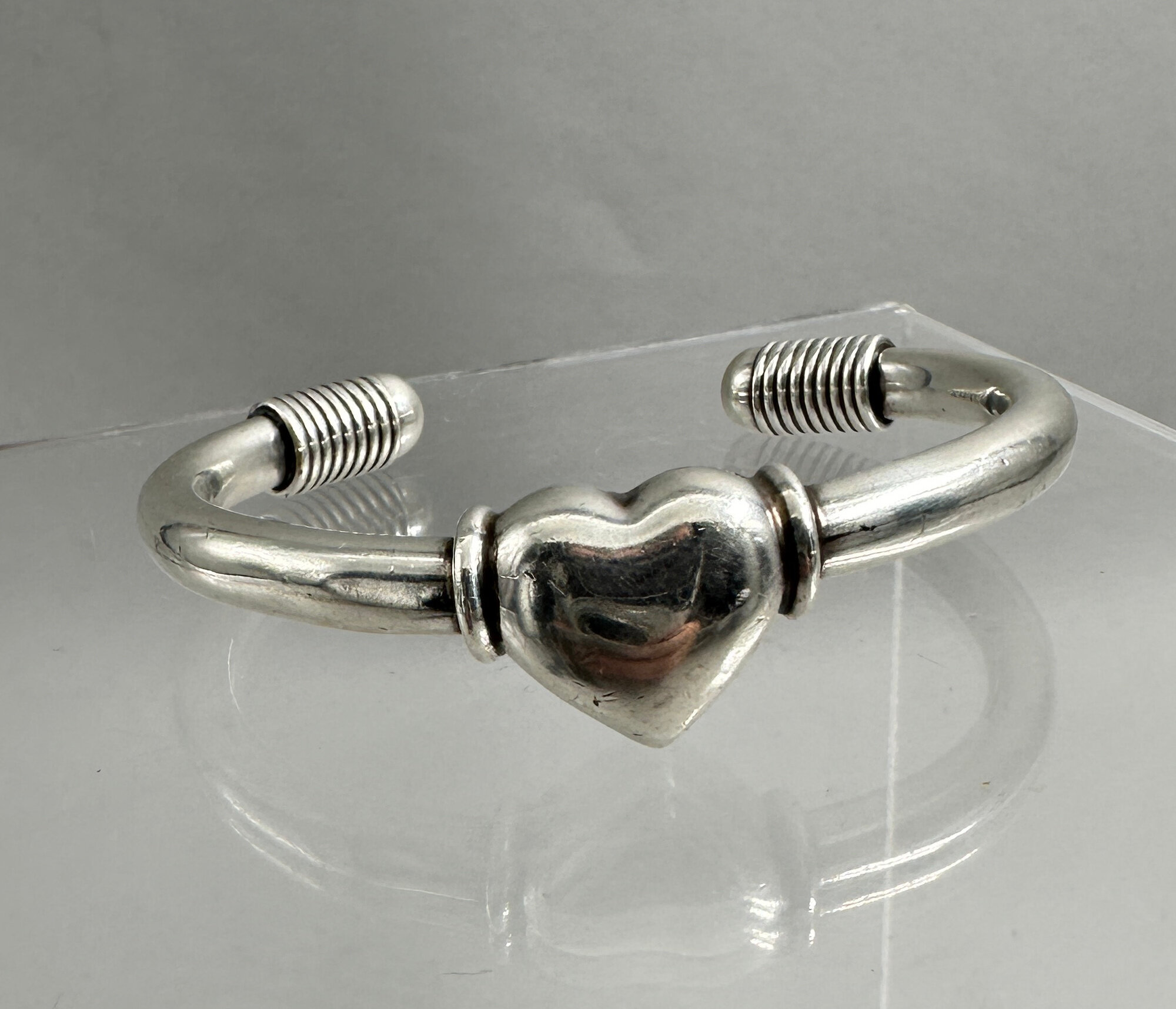
Sweet Taxco heart bracelet c1980
Price: £75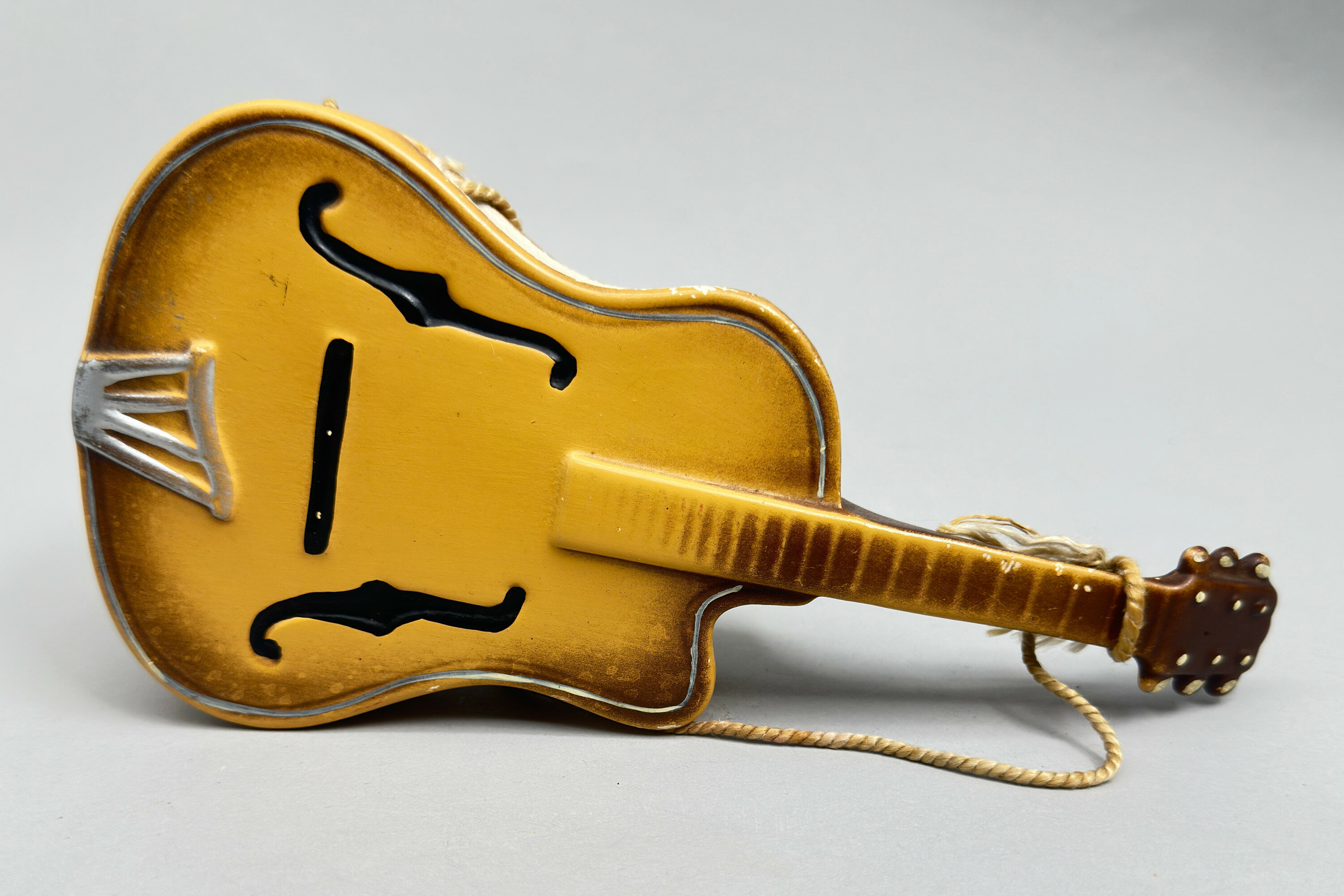
Novelty ceramic Wall Vase in the form of a Gretsch Guitar, English, 1950s
Price: £25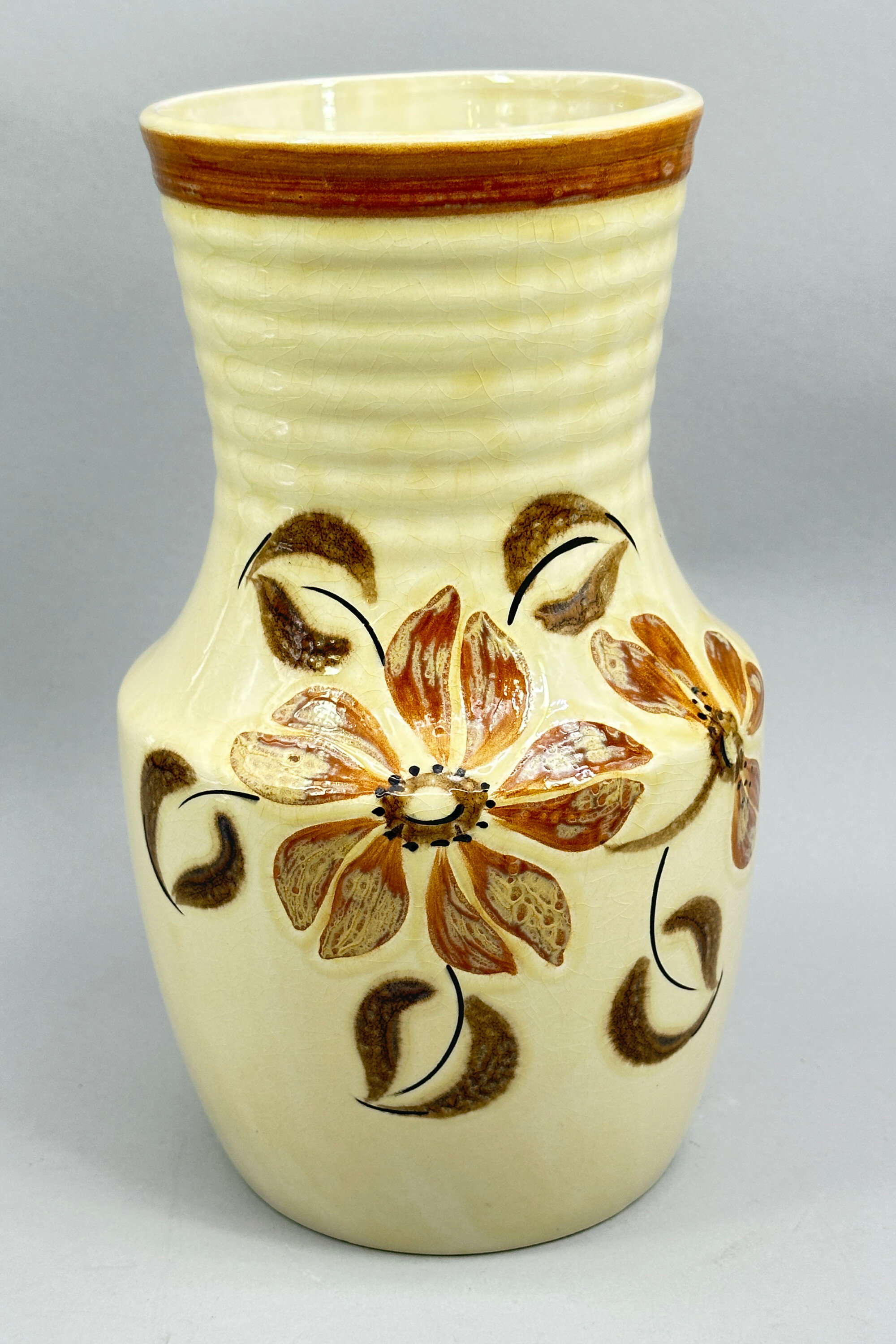
Vase with signature E.Radford and numbered 1267, mid C20th
Price: £45There were, in fact, two craftsmen working in the C20th British pottery industry with the name Edward Radford, father and son. Radford senior worked for Pilkington’s Royal Lancastrian Pottery in Manchester from 1903 until his retirement in 1936, acting as their main thrower. Radford junior joined his Father in 1905, but the First World War intervened, in which he won a Military Cross for his actions at Passchendaele in 1917 and afterwards he settled in Stoke on Trent, the heart of Britain’s pottery industry. An association developed with H.J.Wood’s Alexandra Pottery in Burslem who produced a range of wares bearing his name in the 1930s, although Radford himself may have acted as more a salesman than the designer. Production continued after the war and even after Radford’s retirement in 1948. The form of mark used here implies a later dating and both the shape, indicated by the model number underneath which is found on other vases with different decoration, and the decoration itself suggest the post war era, probably in the 1950s. There is, though, a modest charm here which would blend comfortably with a modern interior.
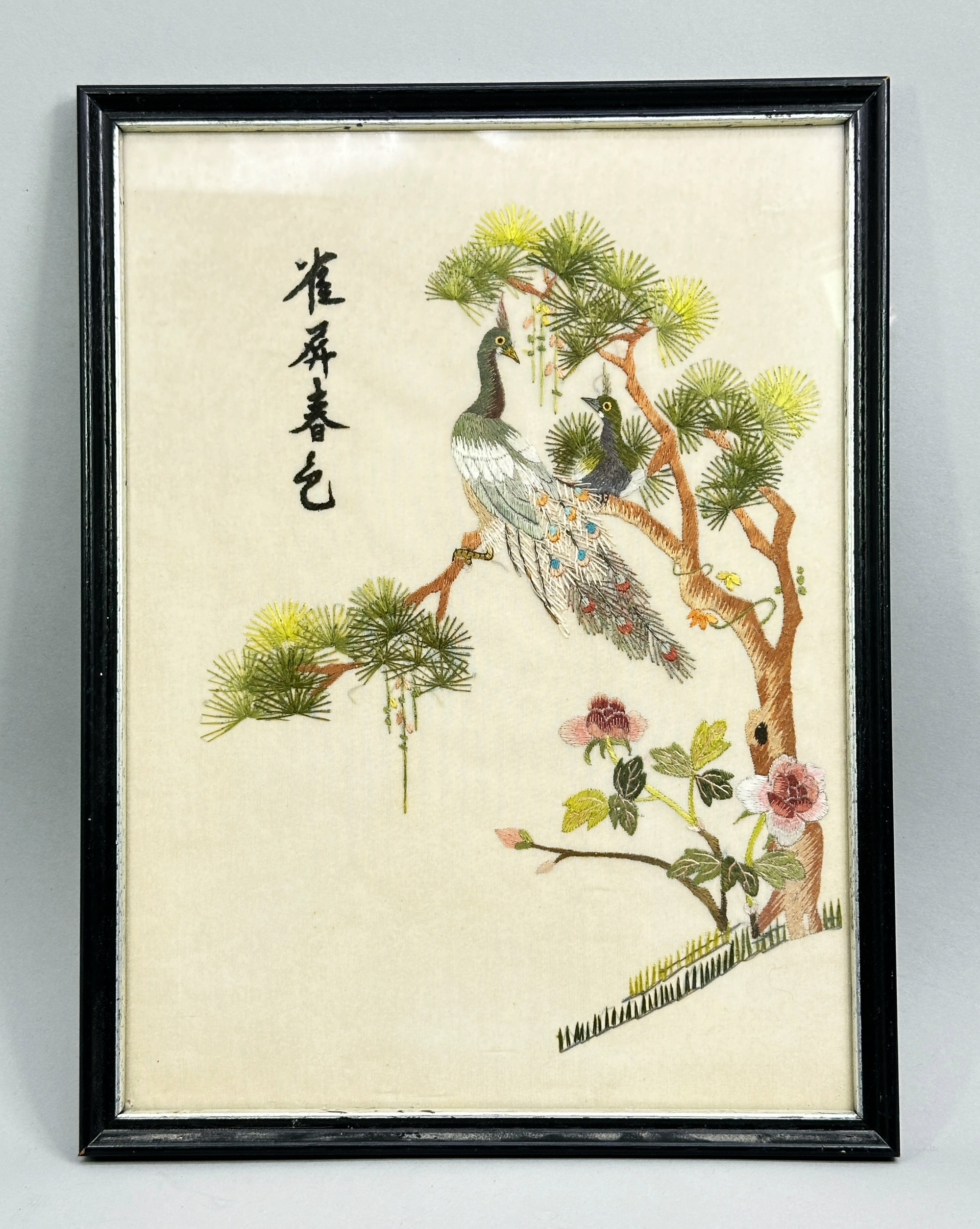
Framed Chinese Embroidery Silk Textile, signed, second half C20th
Price: £25
A pair of Art Deco style Onyx Bookends, C20th
Price: £35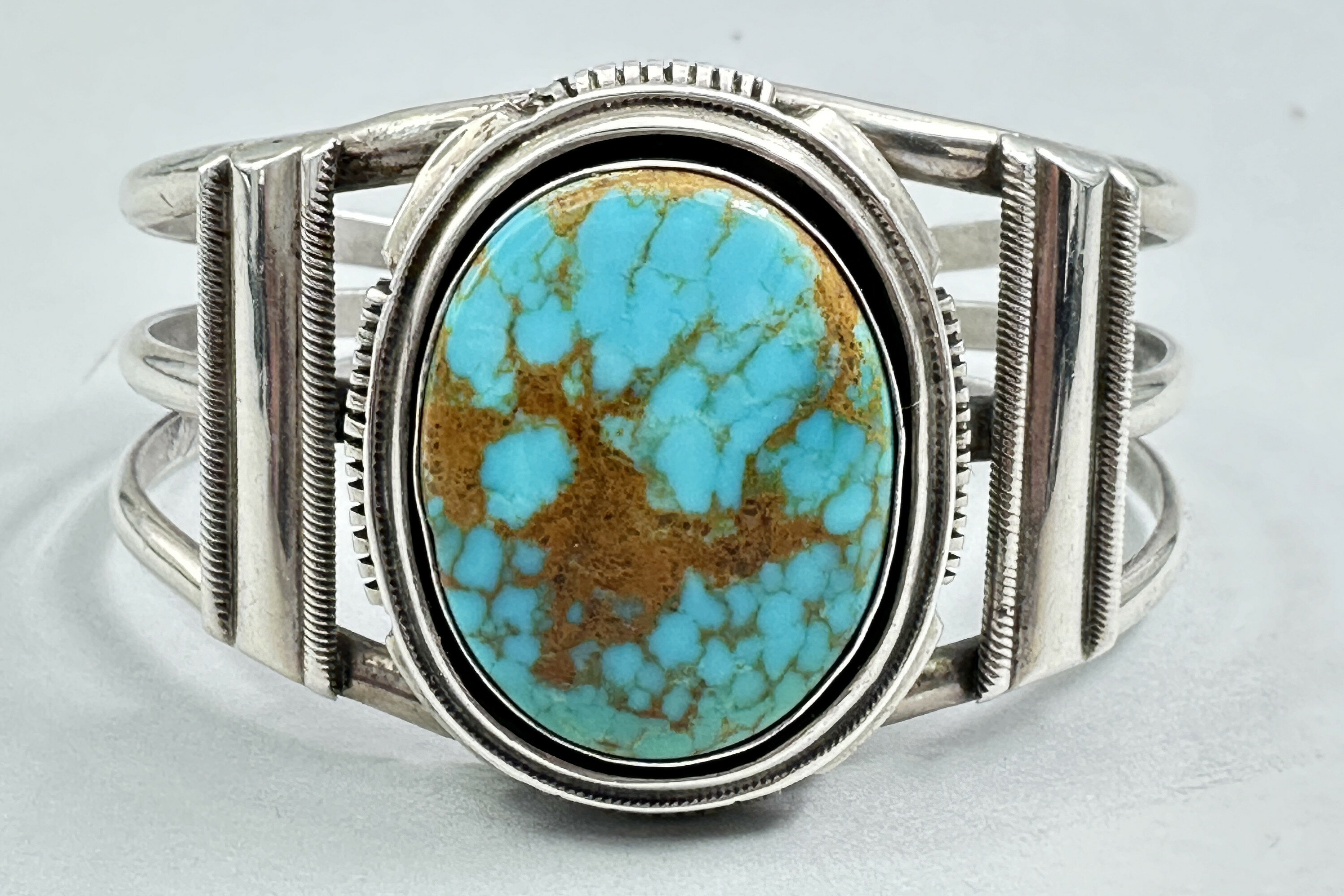
Zuni Cuff Bracelet set with Kingman Turquoise, marked, New Mexico 1970s
Price: £550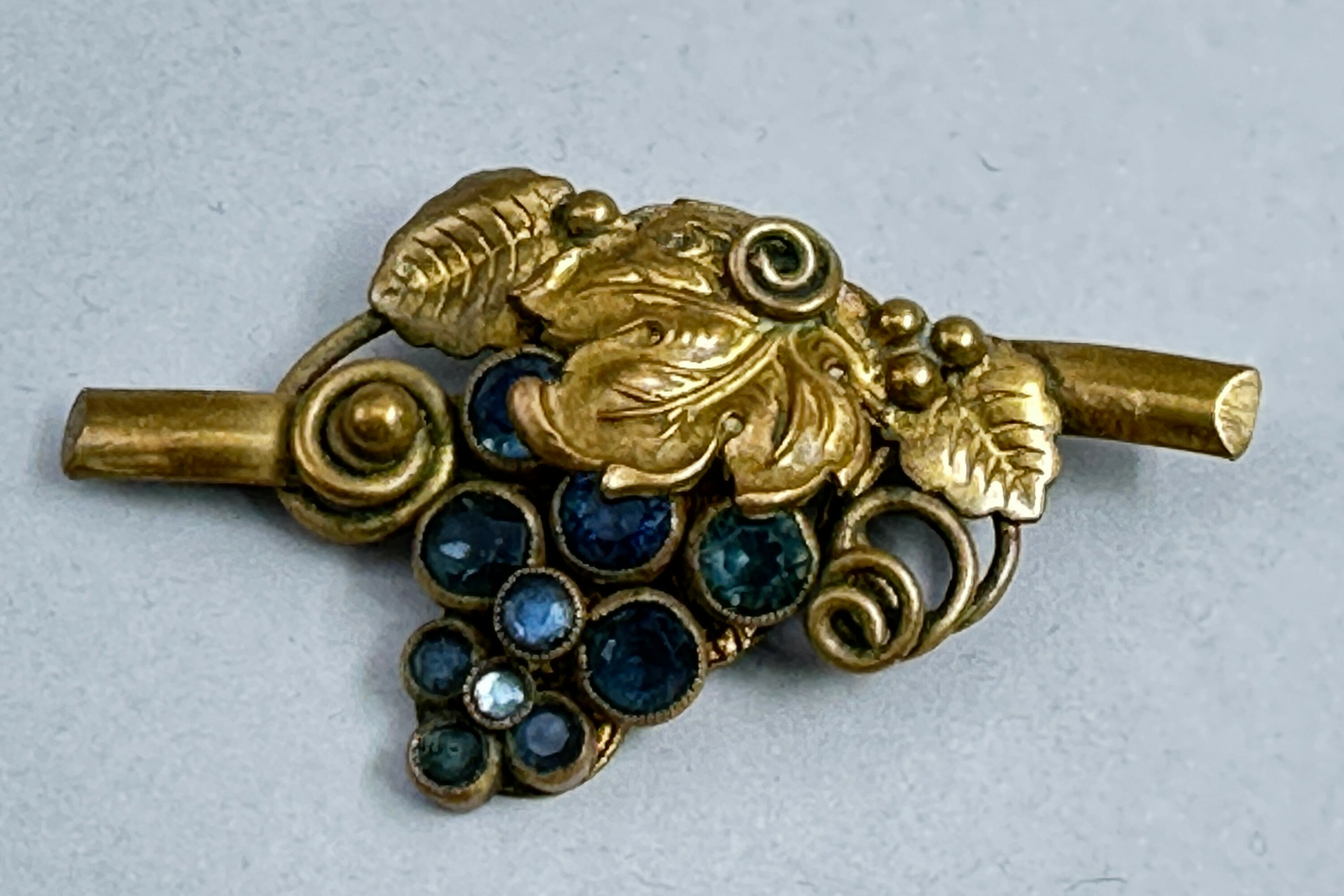
Rare early Czech glass brooch c1920
Price: £45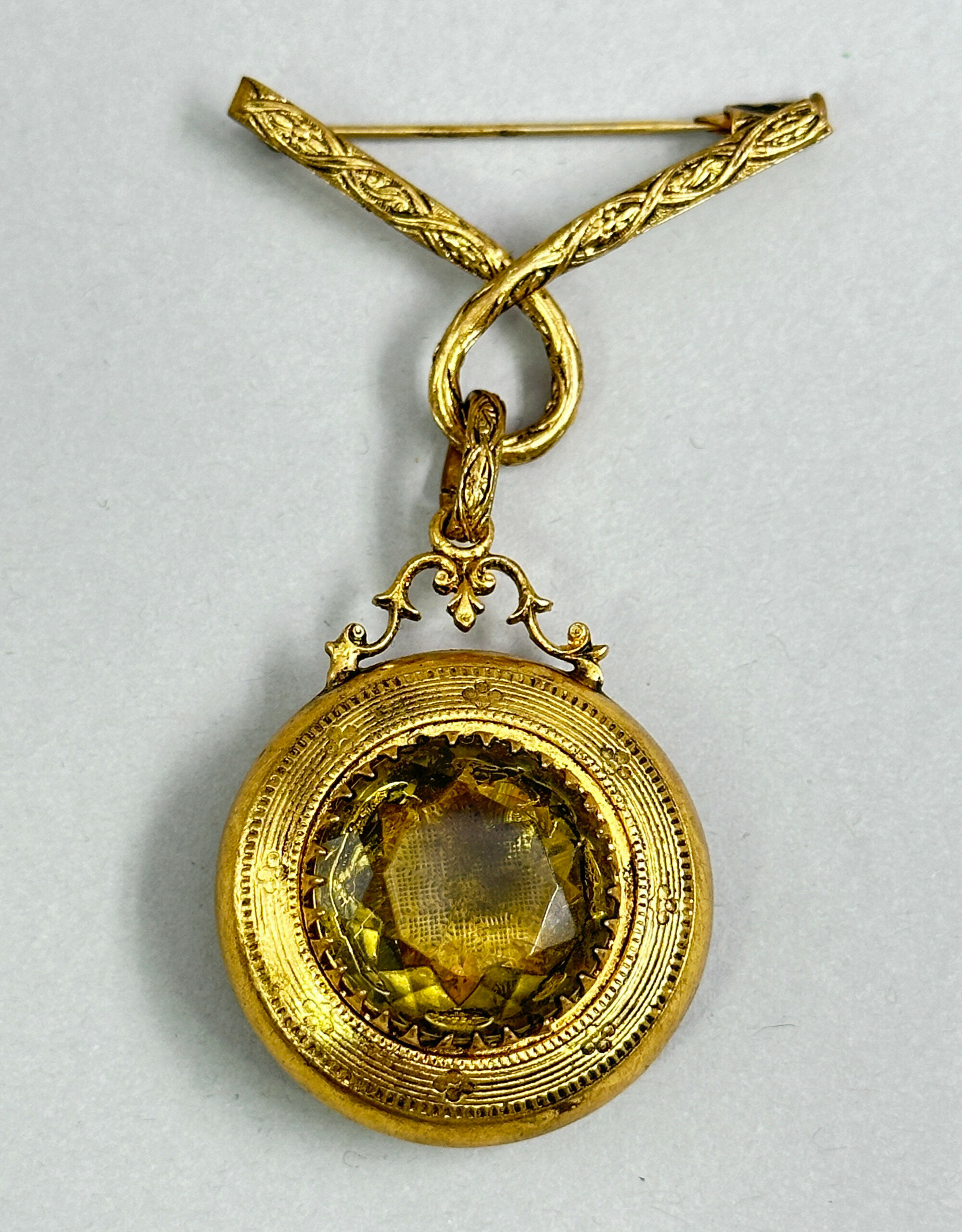
Statement fob brooch with large faux citrine drop c1950
Price: £15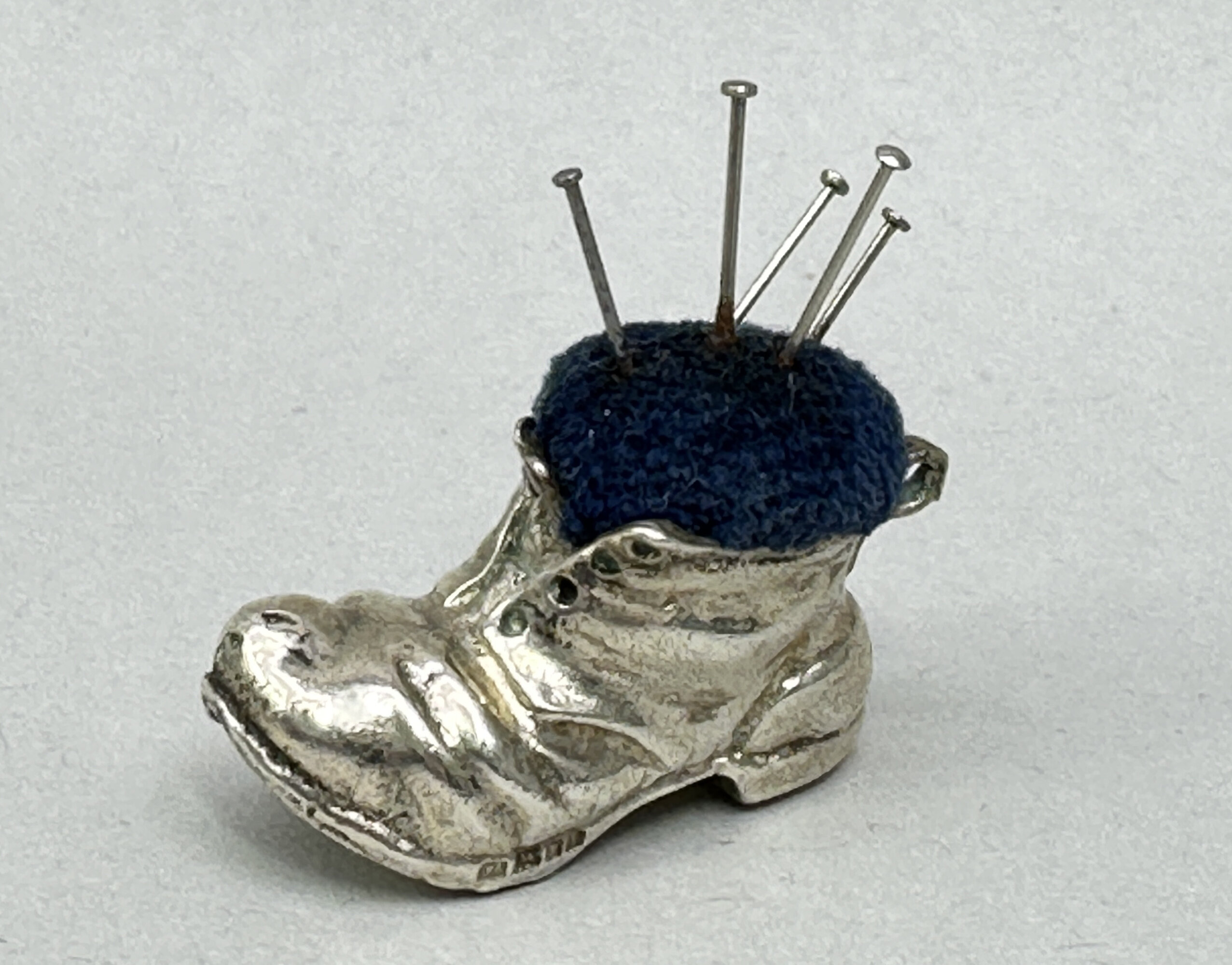
English Silver pin cushion in the form of a boot, London 1991
Price: £75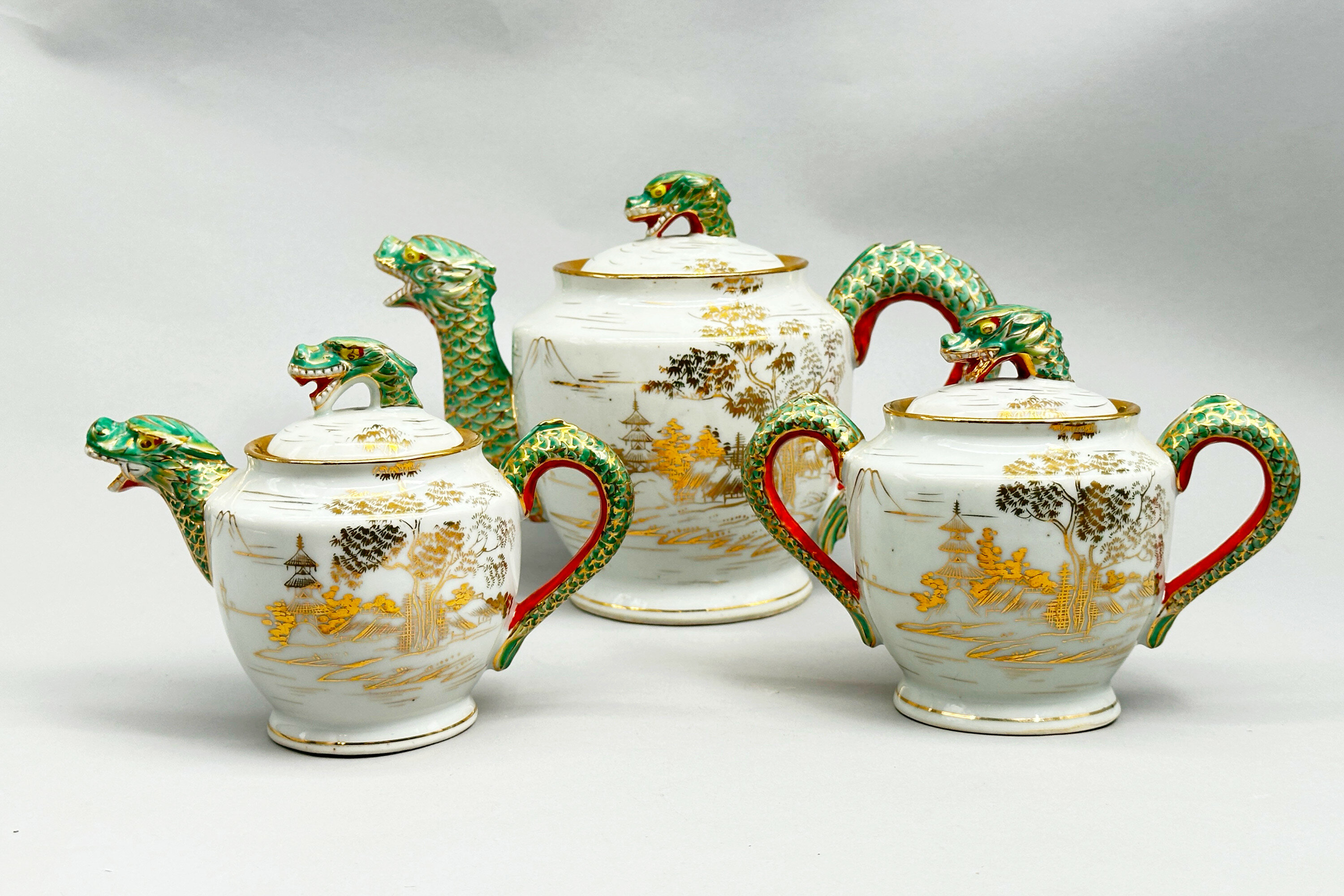
Japanese Kutani Part Tea Service circa 1920
Price: £75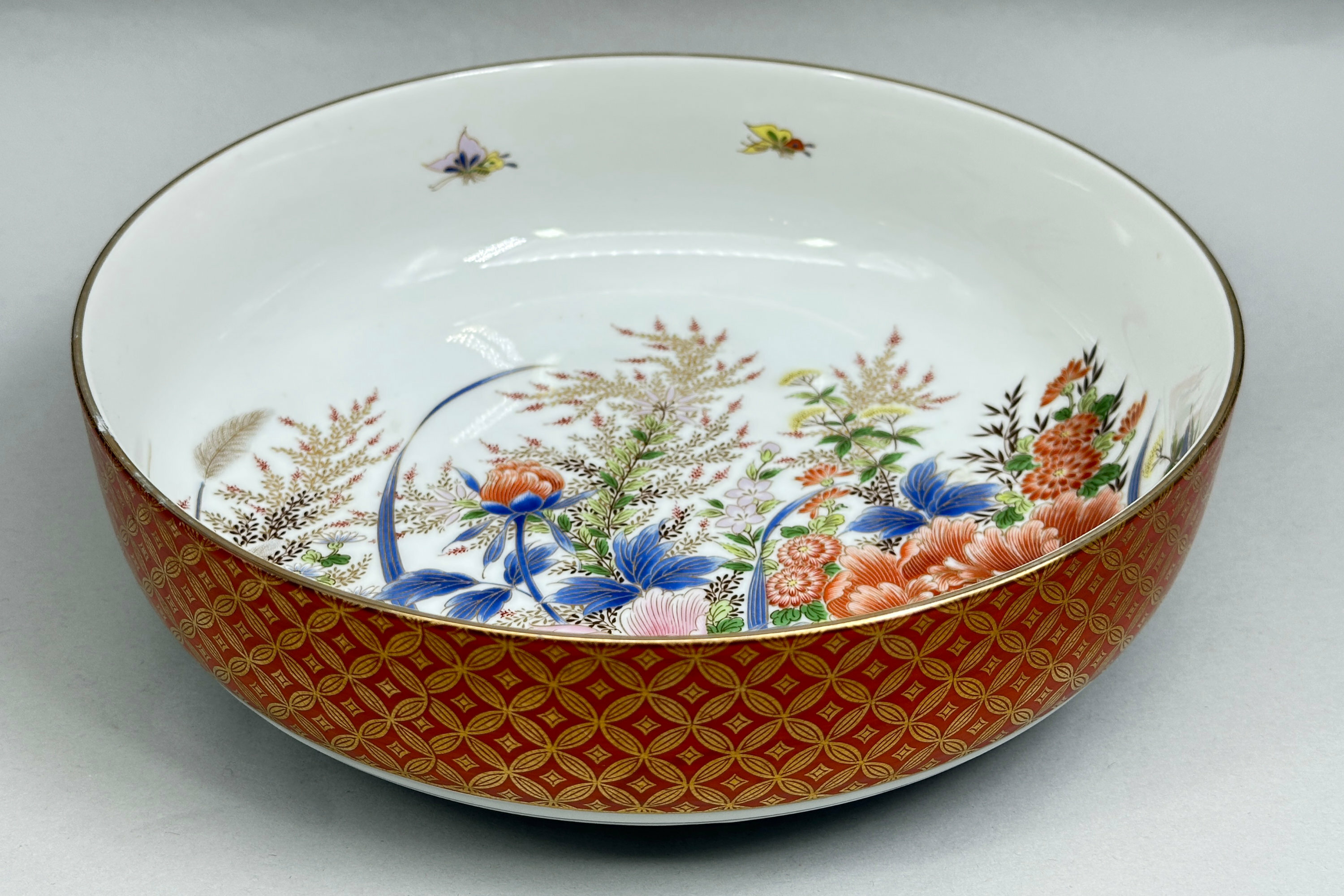
Japanese Polychrome Bowl, Shibata Toki ware, late c20th
Price: £45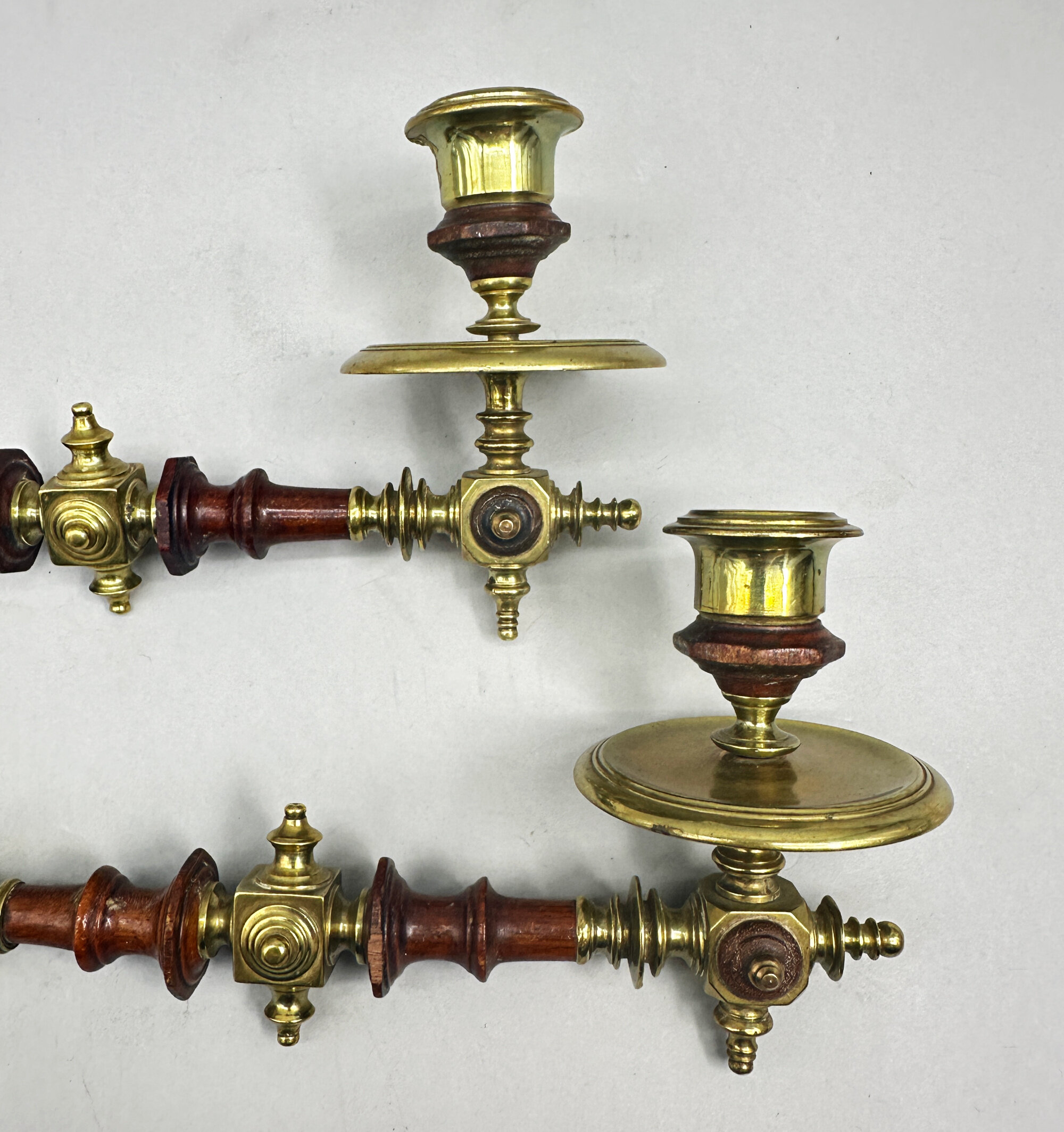
Art Deco piano sconces c1920
Price: £85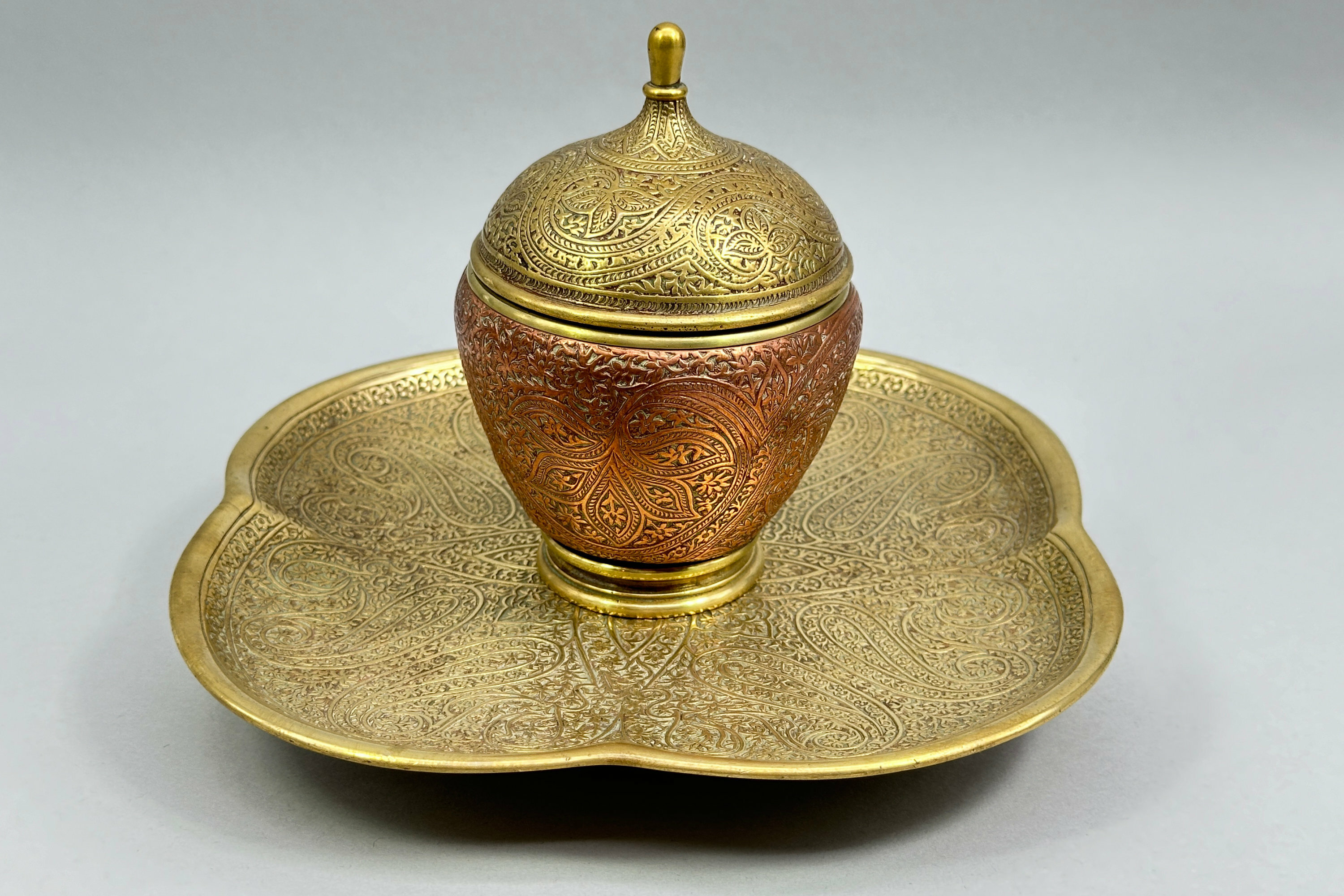
Indian Brass and Copper Inkwell, C20th
Price: £55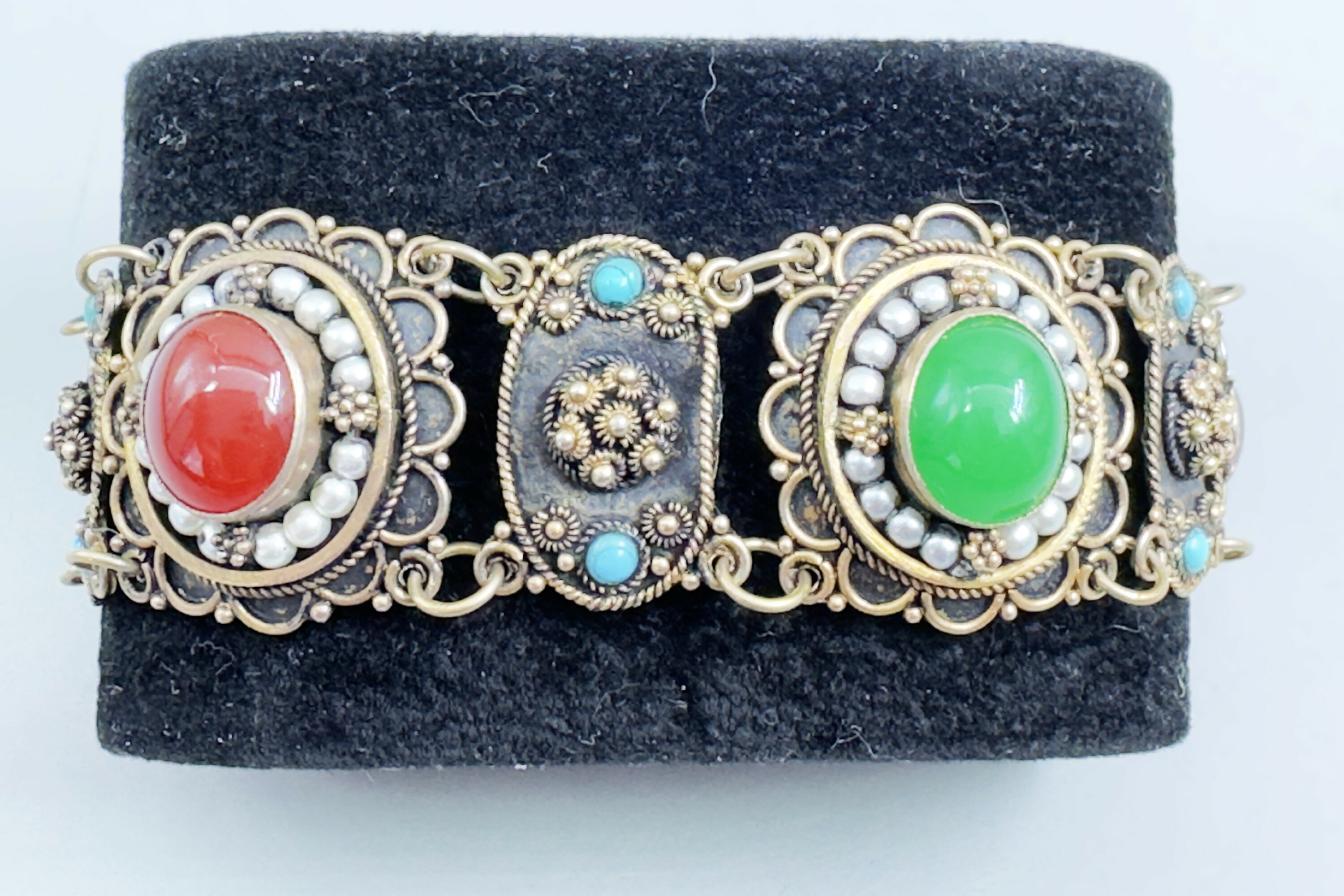
Victorian silver gilt filigree bracelet, Morocco
Price: £95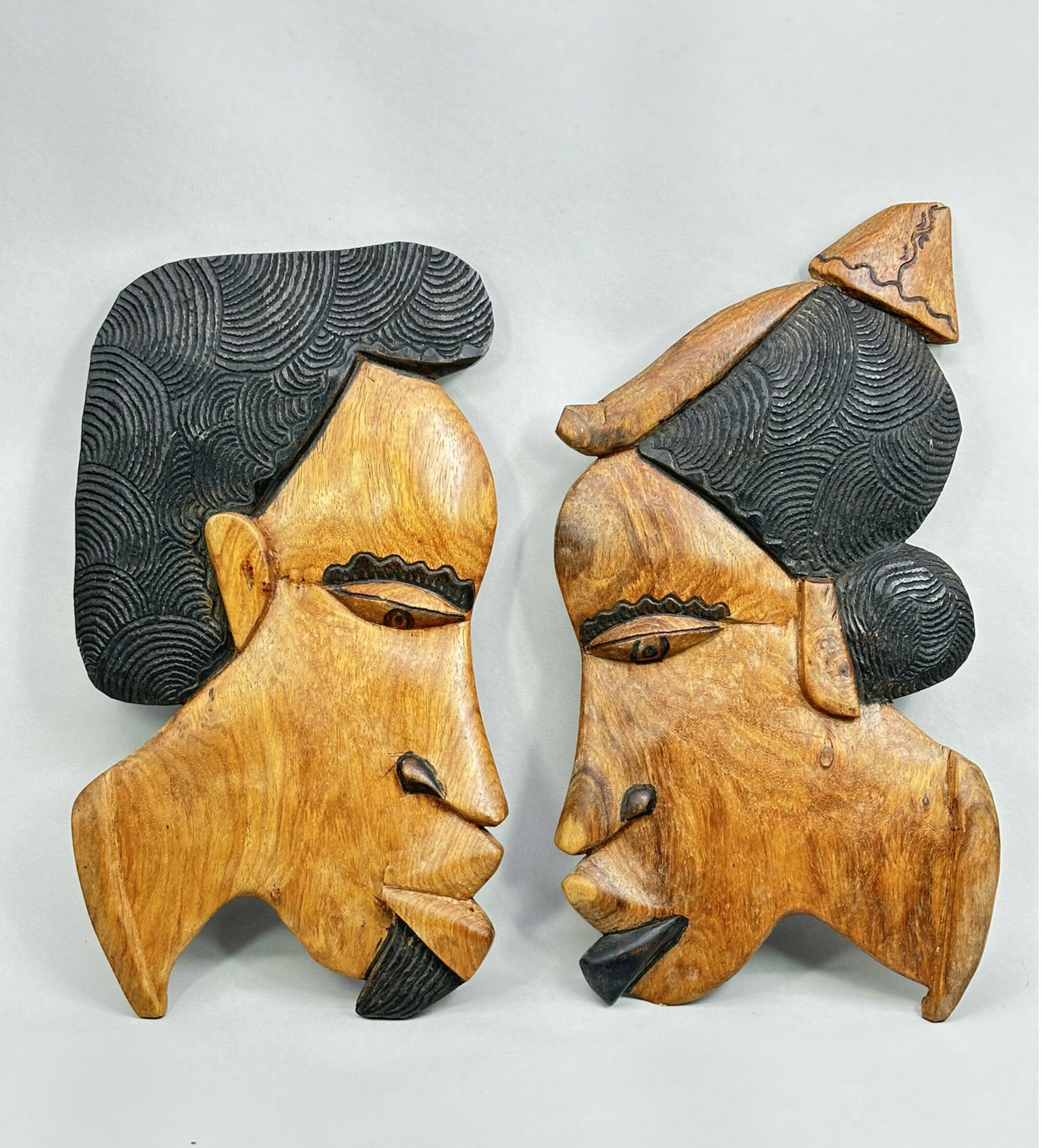
A Pair of African Carved Wood Figure Head Plaques, C20th
Price: £45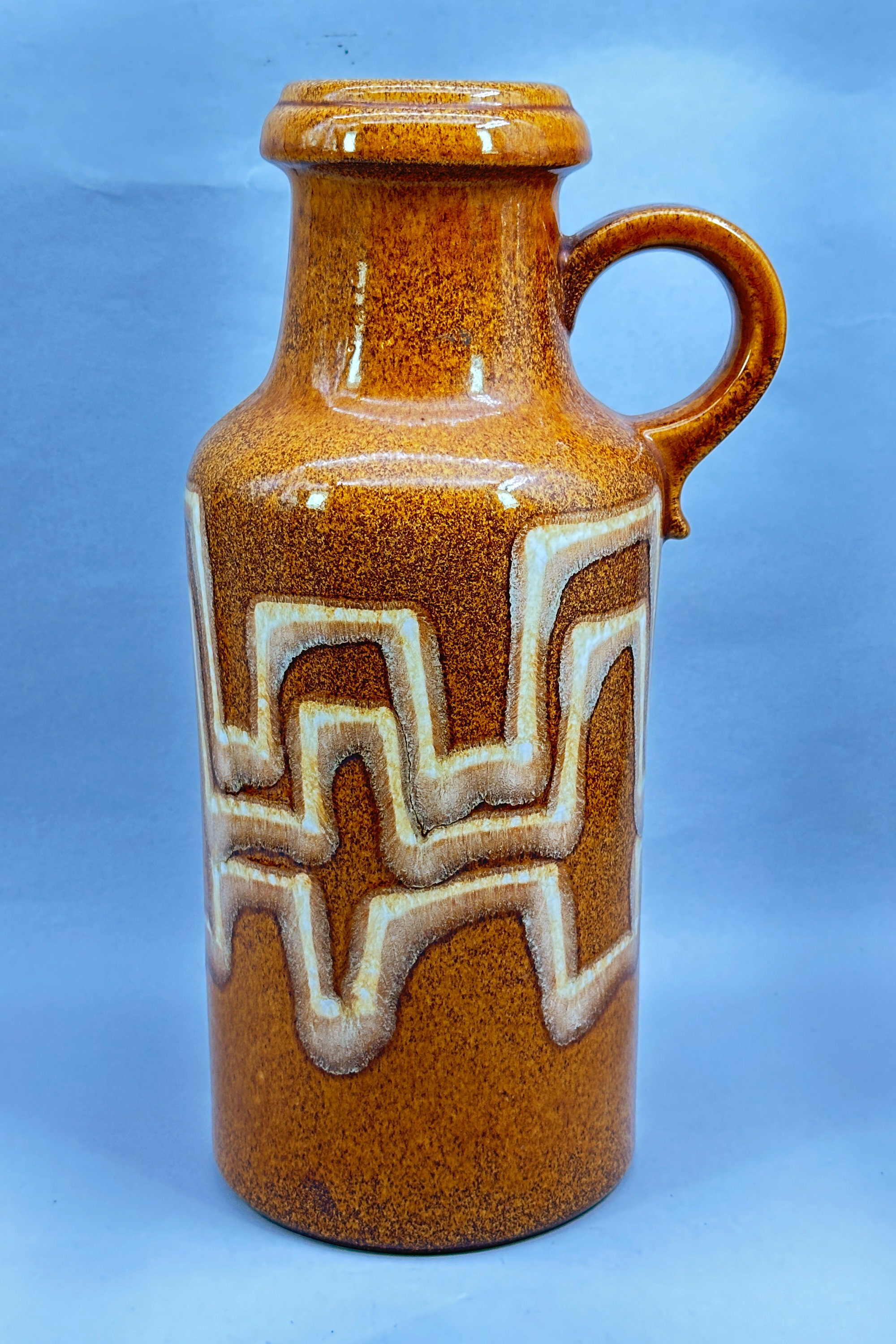
Scheurich West German Vase in Brutalist Style, late C20th
Price: £55Although not marked with their name (few pieces were until the later years of production) this vase has all the hallmarks of the Scheurich factory founded in 1954 by Alois Scheurich who had been a partner before then in the firm ‘Scheurich and Greulich’ (S&G) since 1927. While founded later than many of its competitors, Scheurich grew to become the principal exporter of West German ceramics through until the 1980s and beyond, making vases in a wide variety of shapes and designs. This piece is rather more austere than many of their productions and the clean lines of the form combined with the rather stark decoration perhaps make it particularly suitable for a contemporary interior.
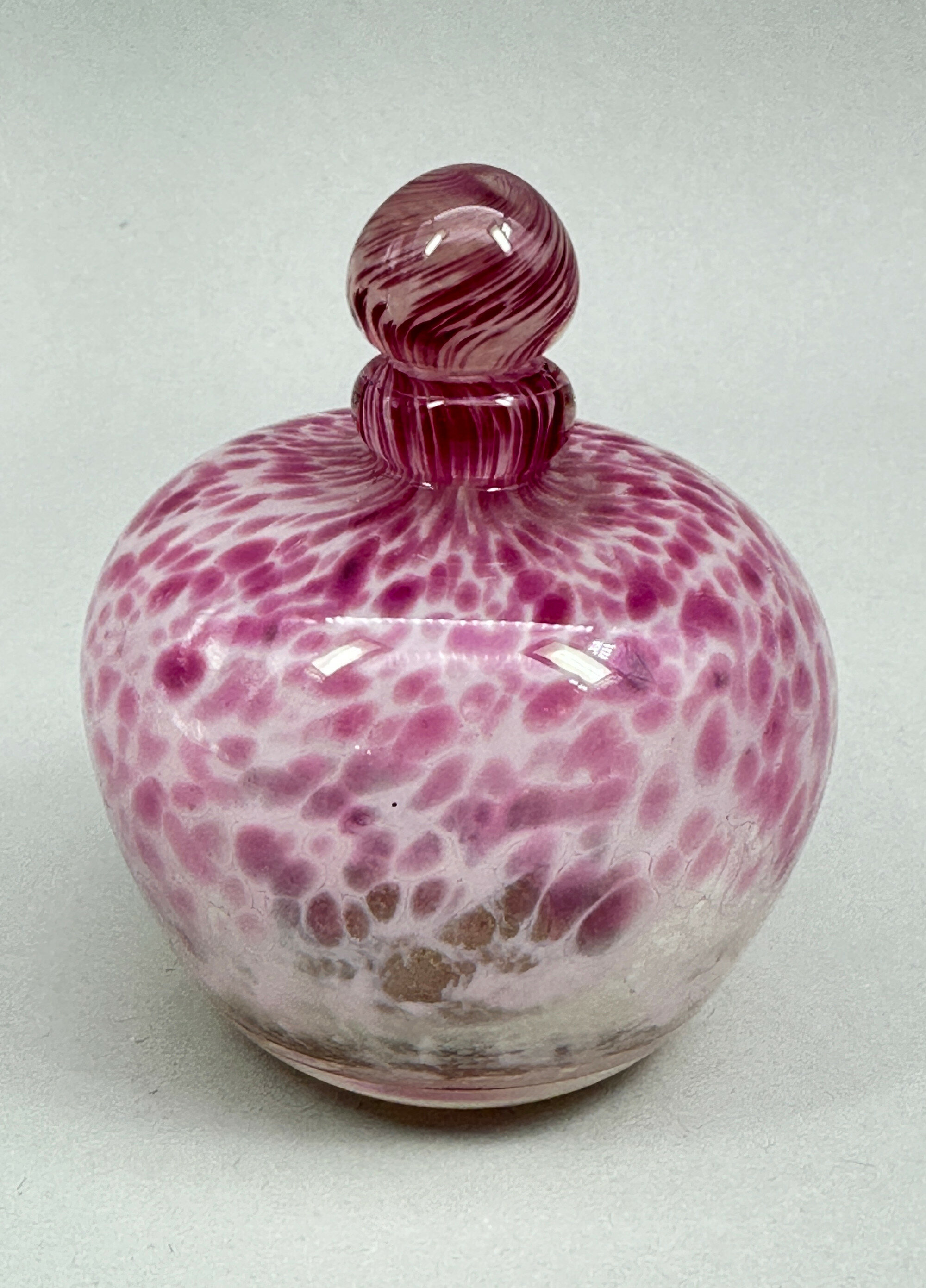
Caithness Glass Perfume Bottle and Stopper, late C20th
Price: £30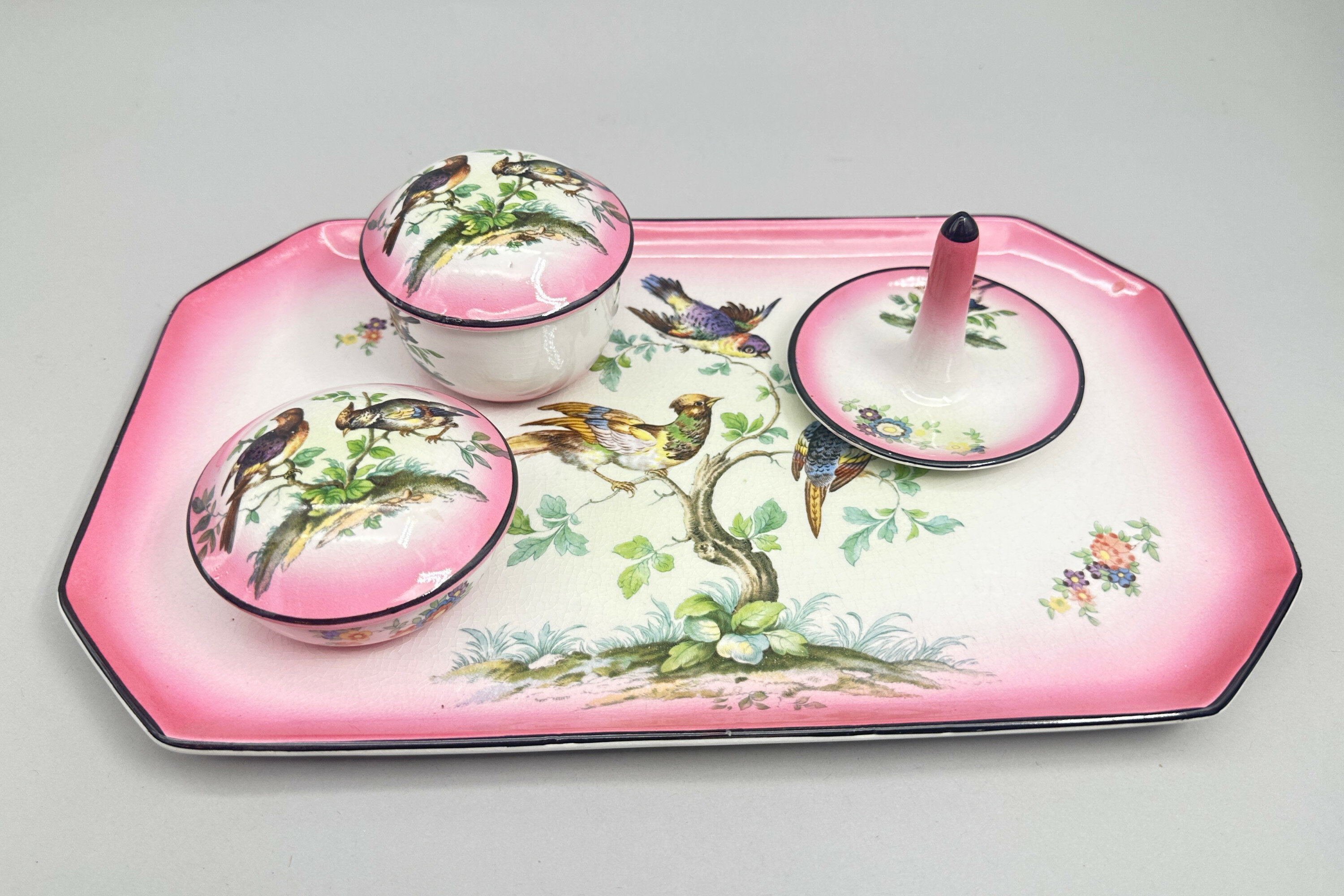
Kiralpo ware Dressing Table Set, marked, 1930s
Price: £35Kiralpo ware was one of the trade names used by Kirkland and Co, earthenware and ceramic manufacturers based at the Albion Pottery, Etruria, Stoke-on-Trent, England who traded from 1891 to 1938 when the business was bought and renamed by Mr A.E.Gray. The format of the mark gives a dating between 1928 and 1938 with ‘E’ standing for Etruria. Kirkland and Co made various modest but colourful decorative items to furnish the home. In a 1907 guide they are described as ‘general earthenware, fancy goods, and majolica manufacturers’. Their designs were not sophisticated but obviously had a popular appeal and this set with its bold transfer decoration of birds set within a rather vivid pink border is typical of their work.
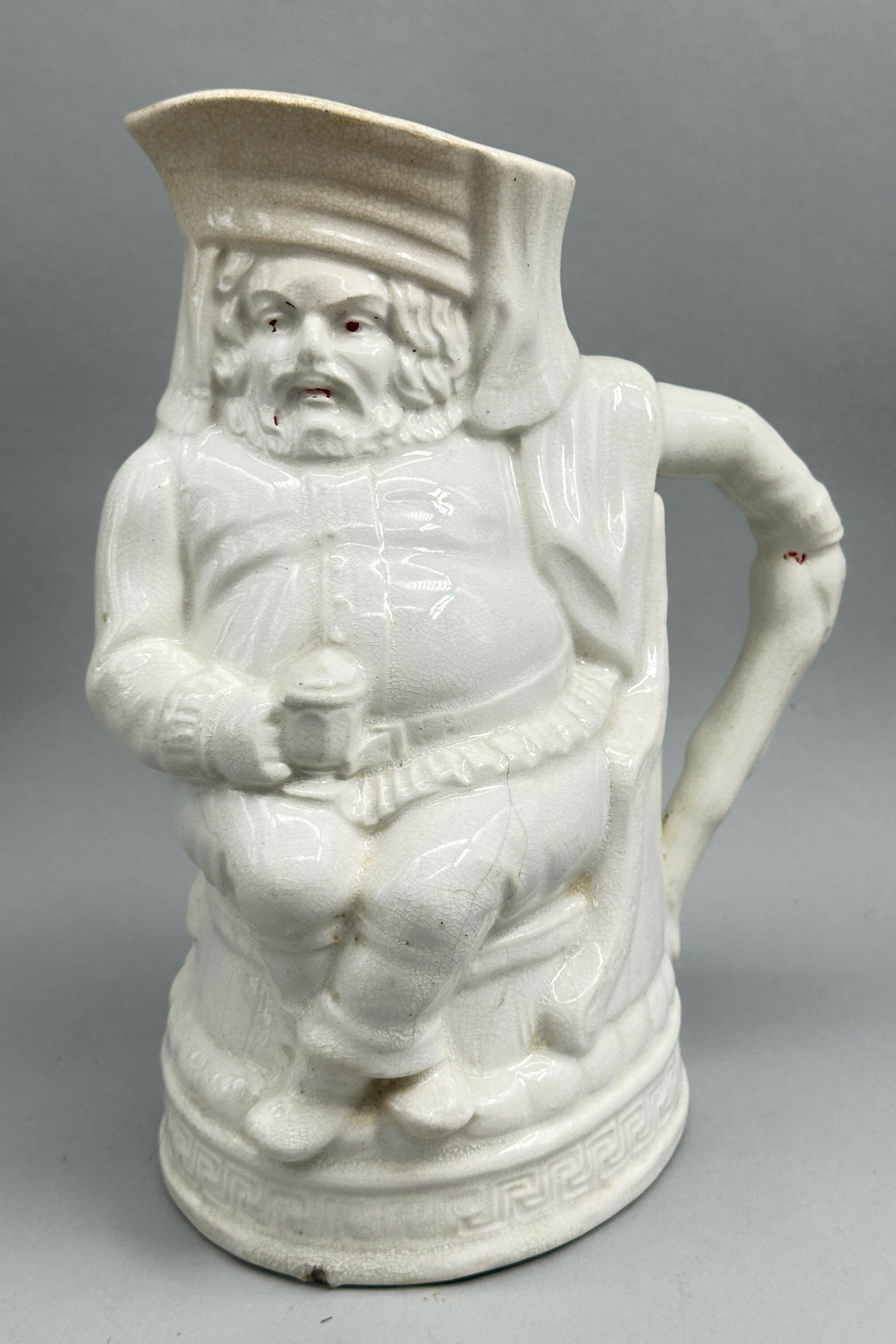
Earthenware Jug, Falstaff or Old King Cole, Furnival and Clark, mid C19th
Price: £75The design for this jug, usually termed ‘Falstaff’ but sometimes ‘Old King Cole’ is known to have been registered (Rd.No. 32601)by the firm Furnival and Clark on December 30th 1845. This was a very short lived partnership between Thomas Furnival and Richard Clark, based at the Stafford Street Pottery Works, Hanley, Staffordshire and which traded from 1844 to 1846 apparently producing just this one model, albeit in a variety of colours. Thomas Furnival had been involved in other firms before this brief venture and was to be involved in others afterwards. The dating of these mugs is usually attributed to the short period when Furnival and Clark traded but it is quite possible that more pieces were produced afterwards by Furnival himself. The paste and finish of this piece, though, which is not marked, certainly suggest a mid nineteenth century dating. In general, the model is quite rare. Some examples were fitted with a Britannia metal or pewter lid but this was never integral to the piece. This striking composition, then, is a rare and desirable item collectors with an interest in British Staffordshire wares.

Beautiful paste evening necklace c1940
Price: £25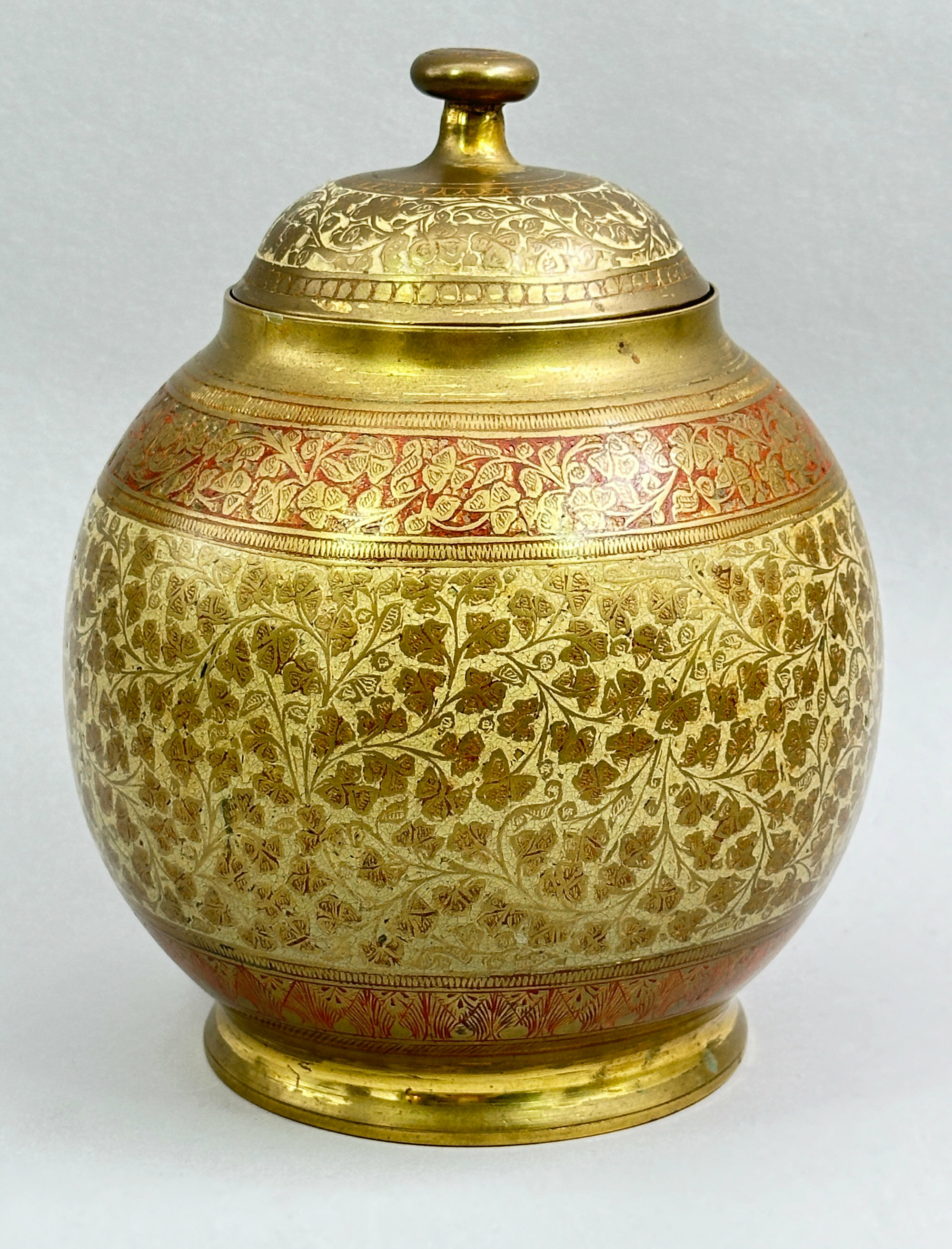
Indian Brass Potiche and Cover, early C20th
Price: £45
Long Art Nouveau necklace with multiple drops c1930
Price: £75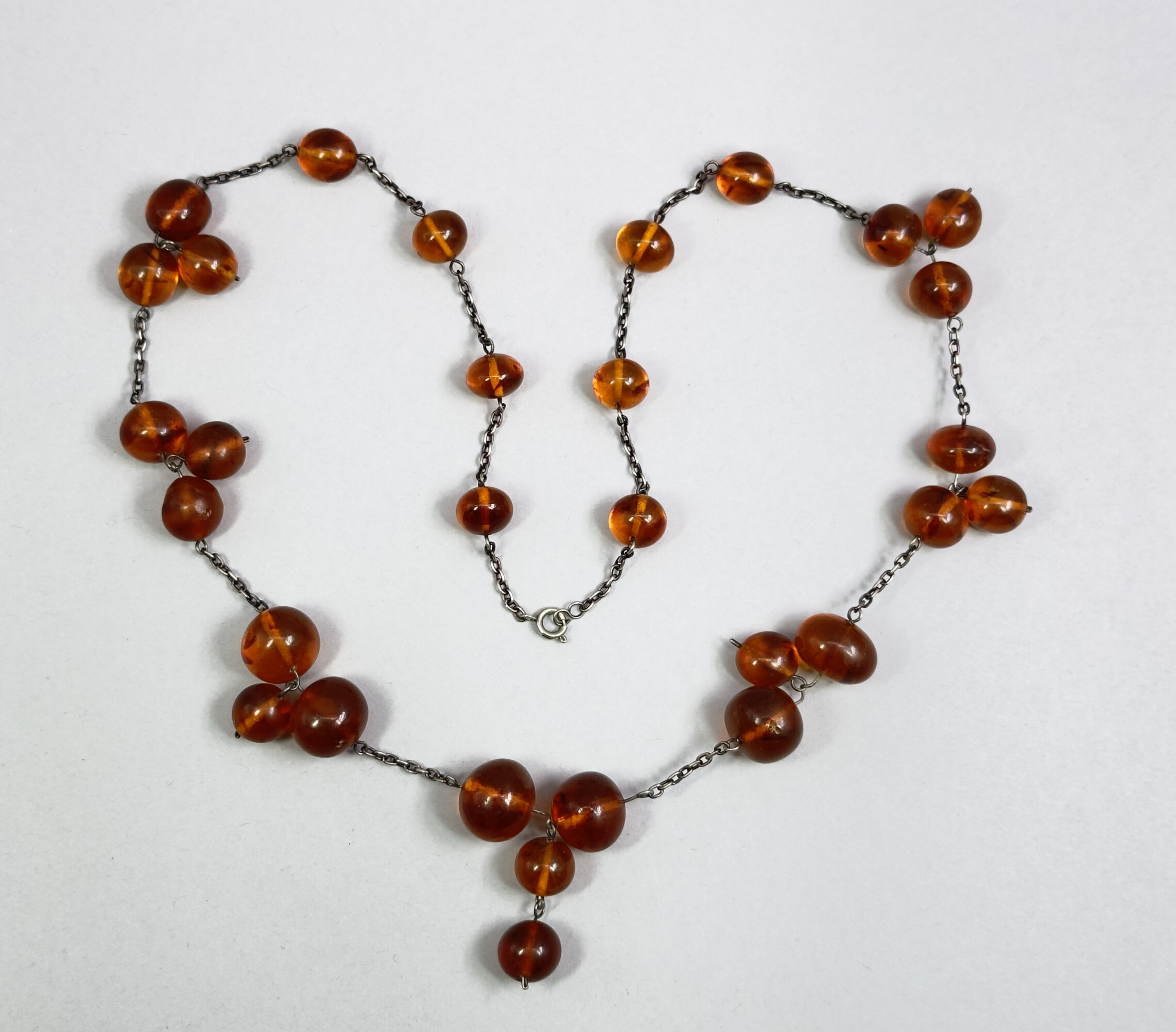
Amber statement necklace with round drops c1960
Price: £50
Charming small amber pendant brooch set as an owl c2000
Price: £15
Victorian Egyptian Revival motif necklace with red stones c1900
Price: £50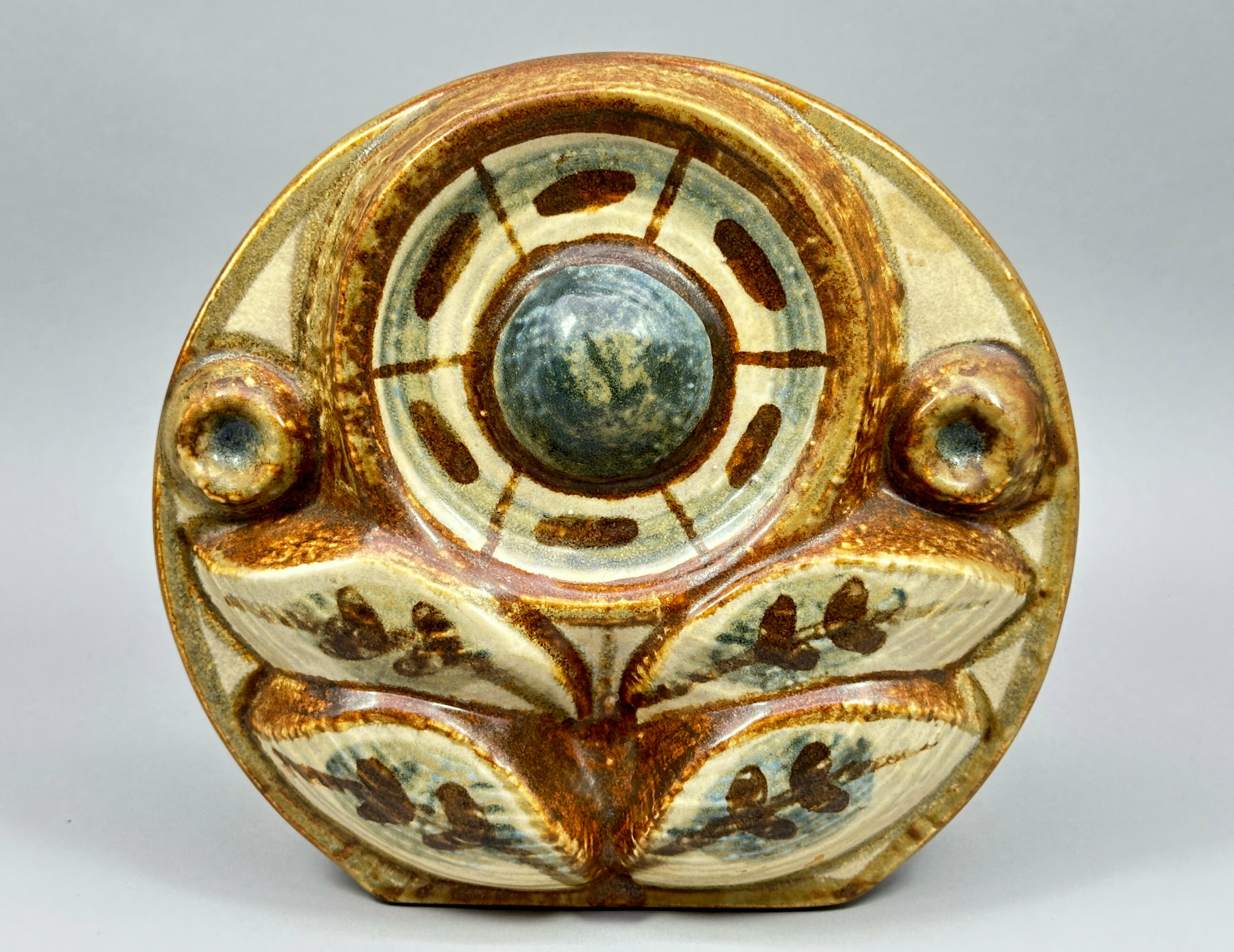
Wall Vase, designed by Noomi Backhausen, Søholm Stentøj, Denmark, late C20th
Price: £95The company Søholm Stentøj was founded by Herman Sonne Wolffsen and Edvard Christian Sonne in 1835 at Rønne, the principal town of Bornholm, a Danish island off the south coast of Sweden. One of the most respected of the Danish potteries it continued producing a wide range of ceramics until the firm closed in 1996. Noomi Backhausen was a designer for Søholm from 1966 to 1990 and set up her own pottery in Rønne in 1996 after the closure of her old employers. This wall vase is a typical example of her abstract organic designs and would be a worthy addition to a collection of twentieth century Danish design.
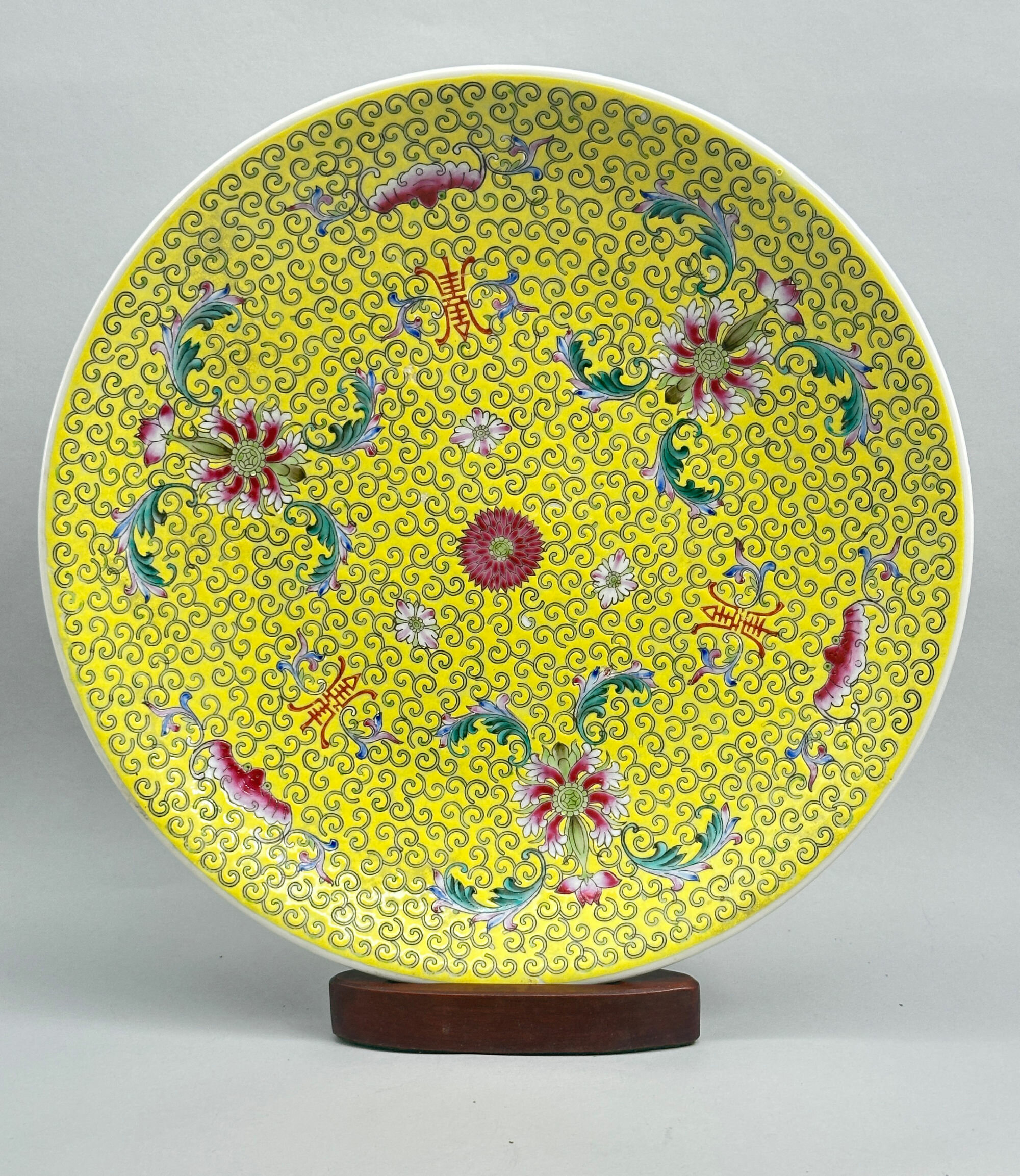
Chinese Yellow Ground Famille Rose Charger, 1950s/early 1960s
Price: £55This is a fine example of the porcelains made at Jingdezhen, for centuries the chief centre of ceramic production in China, in the early years of the People’s Republic of China (1949-). Soon after the communists took control, the kilns at Jingdezhen were organised into co-operatives, each with a number. Many of their pieces were marked and the form of the mark determines the date of production. The circular marks, as here, were the earliest allowing a dating of this charger to the 1950s or possibly the early 1960s. Some of these conglomerates, for the quality can vary, retained the skills of their predecessors and produced works of high quality. This is clearly seen here in the careful and precise enamelling and the general artistry of the design employing ‘imperial’ yellow with the symbolism of happiness (bats), longevity (shou symbols), friendship and a life of ease (chrysanthemum) and fruitfulness and offspring (lotus), all combining to produce a piece well worthy of its many predecessors.
Please note that the wood stand is for display purposes only and is not incuded with this lot.

Vintage Wicker and Plastic Woven Basket with Handles, probably mid C20th
Price: £45
Yellow ground Bursley Ware Dragon Bowl by Frederick Rhead, circa 1920
Price: £55

Glossy brown crocodile handbag 1960s
Price: £65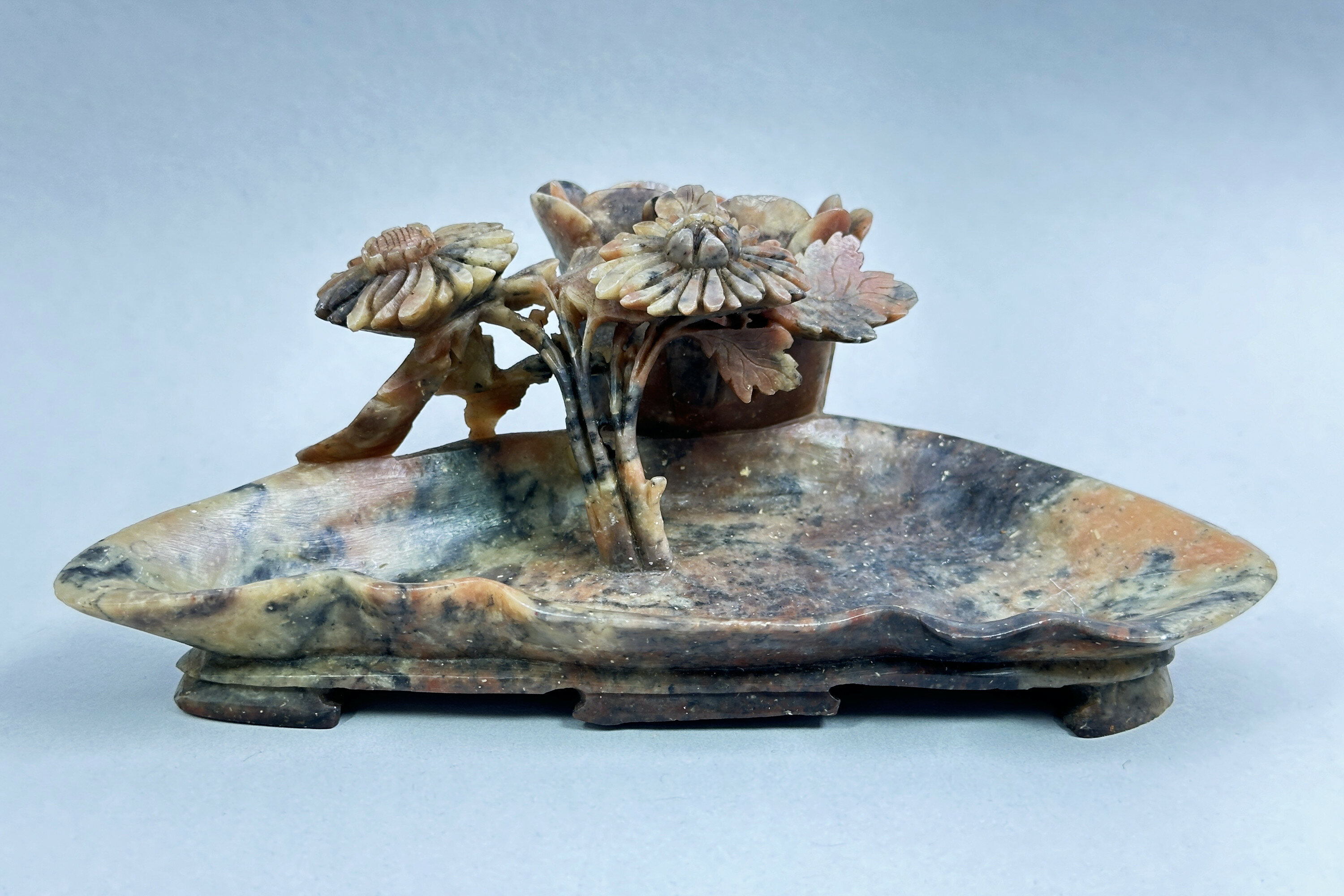
Chinese Soapstone Brushwasher with flowering lotus, early C20th
Price: £95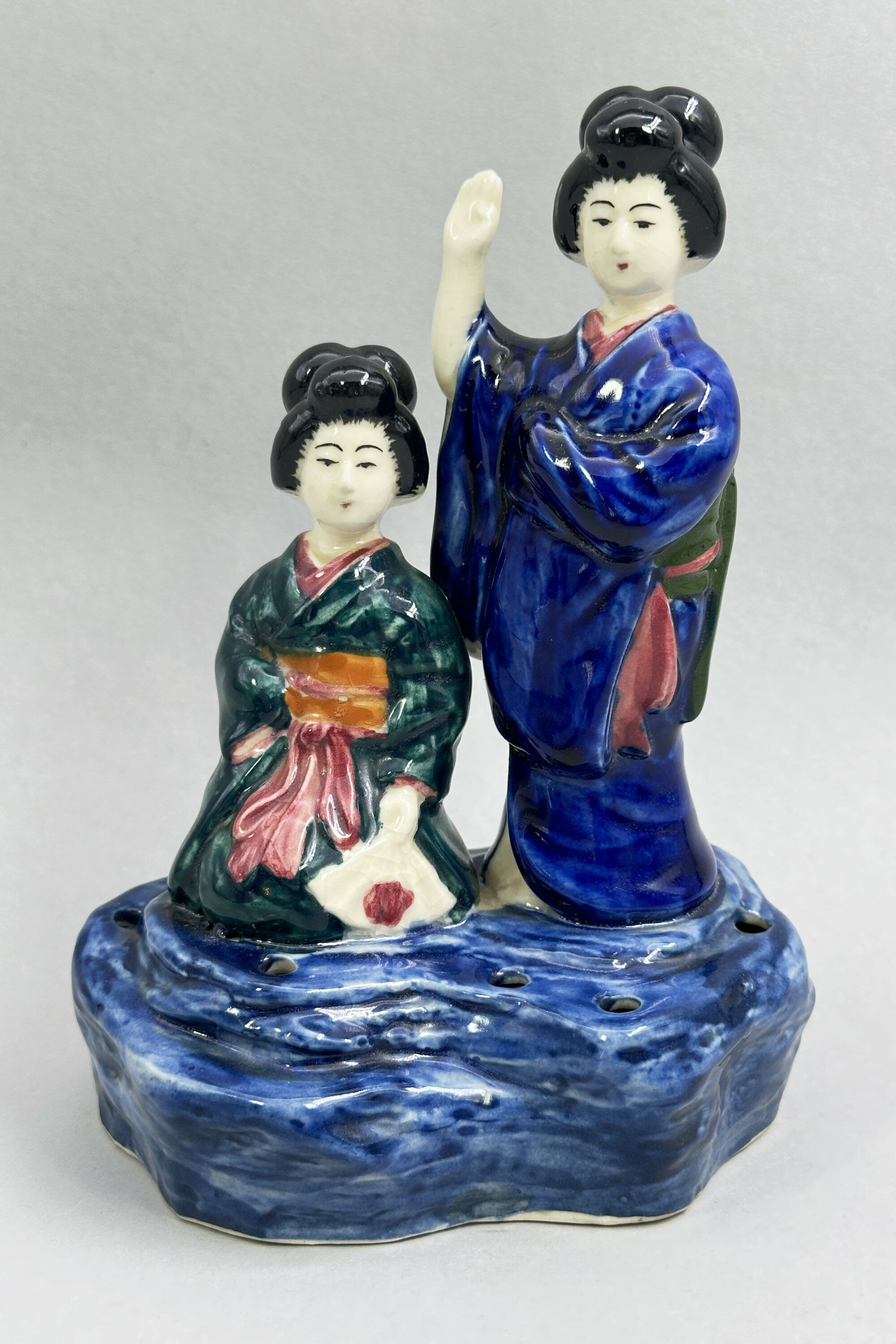
Japanese Ceramic Figural Group of two Geisha, late C19th
Price: £25
Japanese Gouache Painting of Flowering Lotus, signed and framed, C20th
Price: £45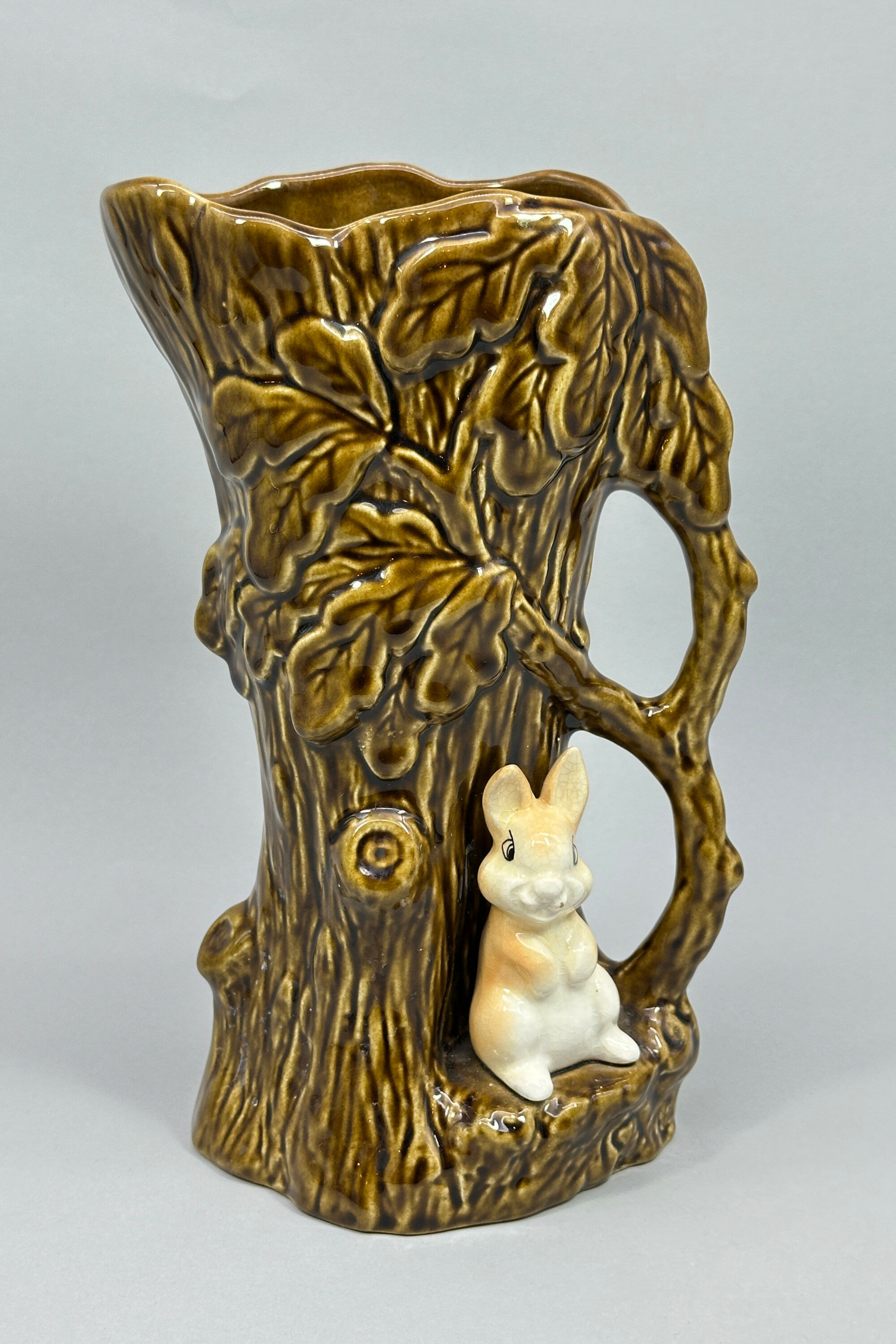
Sylvac woodland range Rabbit and Tree Jug, 1950s
Price: £35‘SylvaC’ (the name was written with a capital ‘C’ after registration of the trademark in 1938) was a trade name of Shaw and Copestake, a company formed by Mr. William Shaw and a Mr. Copestake around 1900. Mr. Copestake sold his shares to a Mr. Richard Hull after about six months of business and this partnership continued until Mr. Hull’s death in 1935. He was succeeded by his son, Mr. Richard Hull junior. In the following year, the business became a limited company. Various mergers and acquisitions followed and in the 1950s new premises were built and production expanded considerably continuing until the early 1980s when changing markets and increased competition forced the company into liquidation.
Sylvac were famous for imaginative glazed wares, particularly animals, and this jug is a typical and pleasing example of their work.
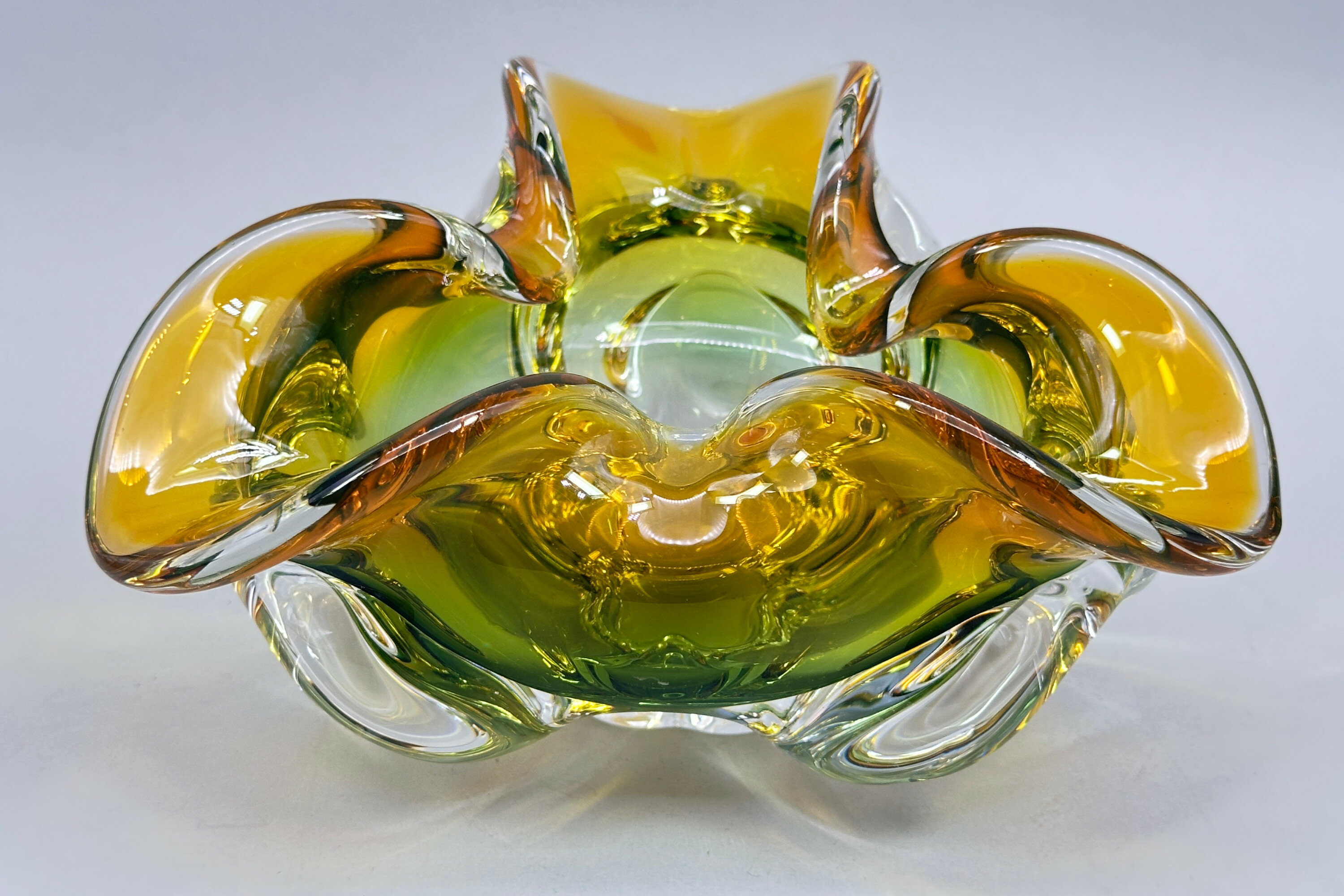
Chřibská Glass bowl designed by Josef Hospodka, Czech 1970s
Price: £75
Obsidian Mayan Statuette inlaid with semi precious stones, C20th
Price: £35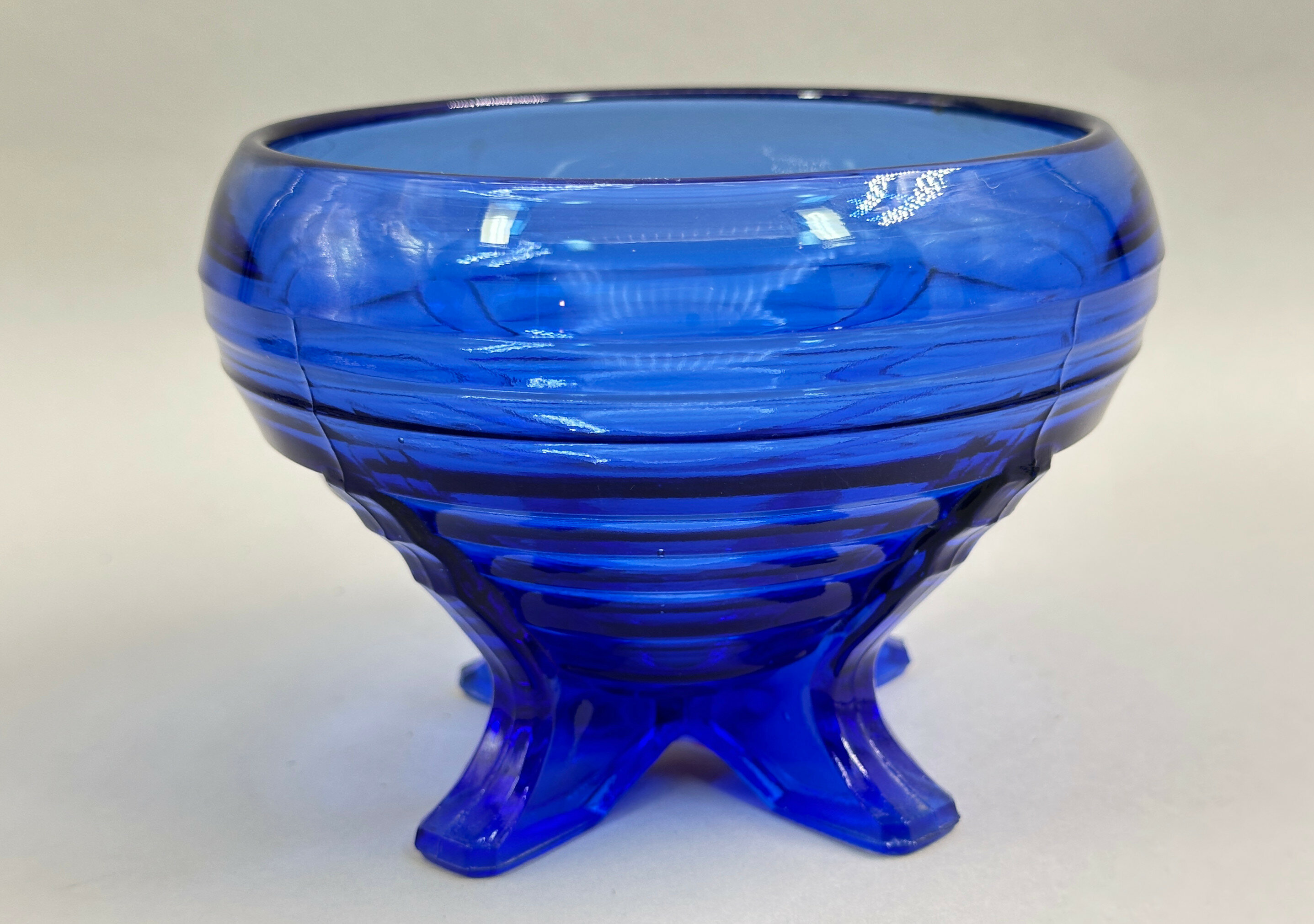
Sowerby Blue Glass Footed Bowl, 1930s/1940s
Price: £25The Sowerby family came from the North West of England near Carlisle and settled in Gateshead in the late eighteenth century. The firm Sowerby Glassworks is known from 1807 onwards and continued production until 1972, concentrating on pressed glass. Catalogues of their wares still exist and they produced pieces in a wide variety of styles and shapes which retain their popularity today.

Celtic Style Pewter Brooch in the form of a Panthers Head, C20th
Price: £10PLEASE NOTE THAT THERE IS FREE UK SHIPPING ON THIS ITEM. For international buyers the shipping cost will be reduced by the UK shipping cost, so don't worry if you are outside the UK, you still receive this benefit!
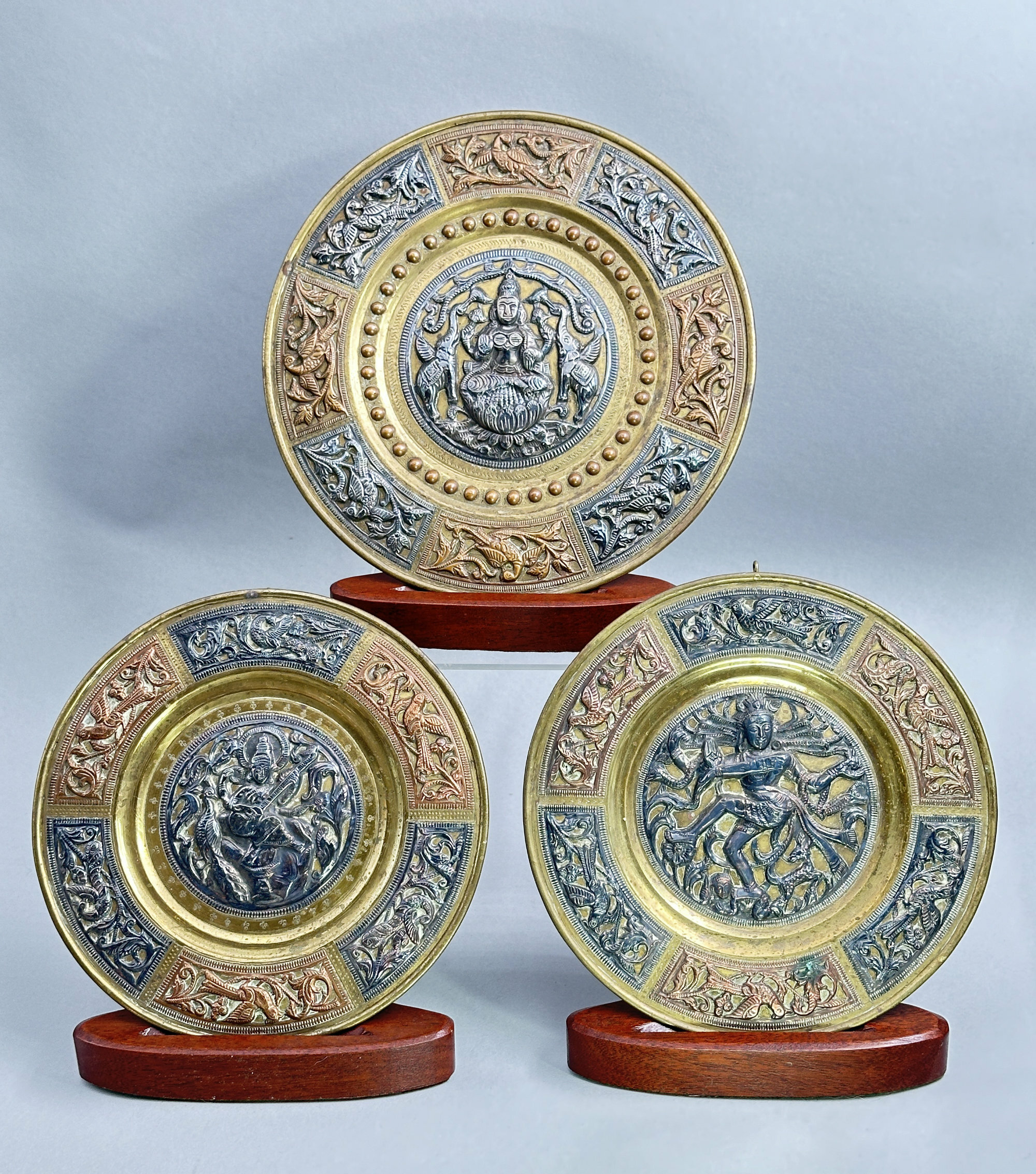
Three Indian Brass hanging plates, Thanjavur, C20th
Price: £55The style of decoration here is typical of the art brass hanging plaques produced by the metalworkers of Thanjavur, formerly known as Tanjore, from the late eighteenth century onwards. A Tanjore Art Plate consists of three components: the base plate (brass), a circular central relief panel of a deity worked in silver surrounded by relief panels in copper and silver often depicting flowers. Various deities are depicted here including the well known many armed Shiva. All the reliefs have milled borders but the wells are finished differently, some with engraved designs and one with circular bosses. Dating is probably to the mid C20th but the style of these pieces was continuous and relatively unchanging so an earlier period of manufacture is quite possible.
NB Stands for display purposes only and not included
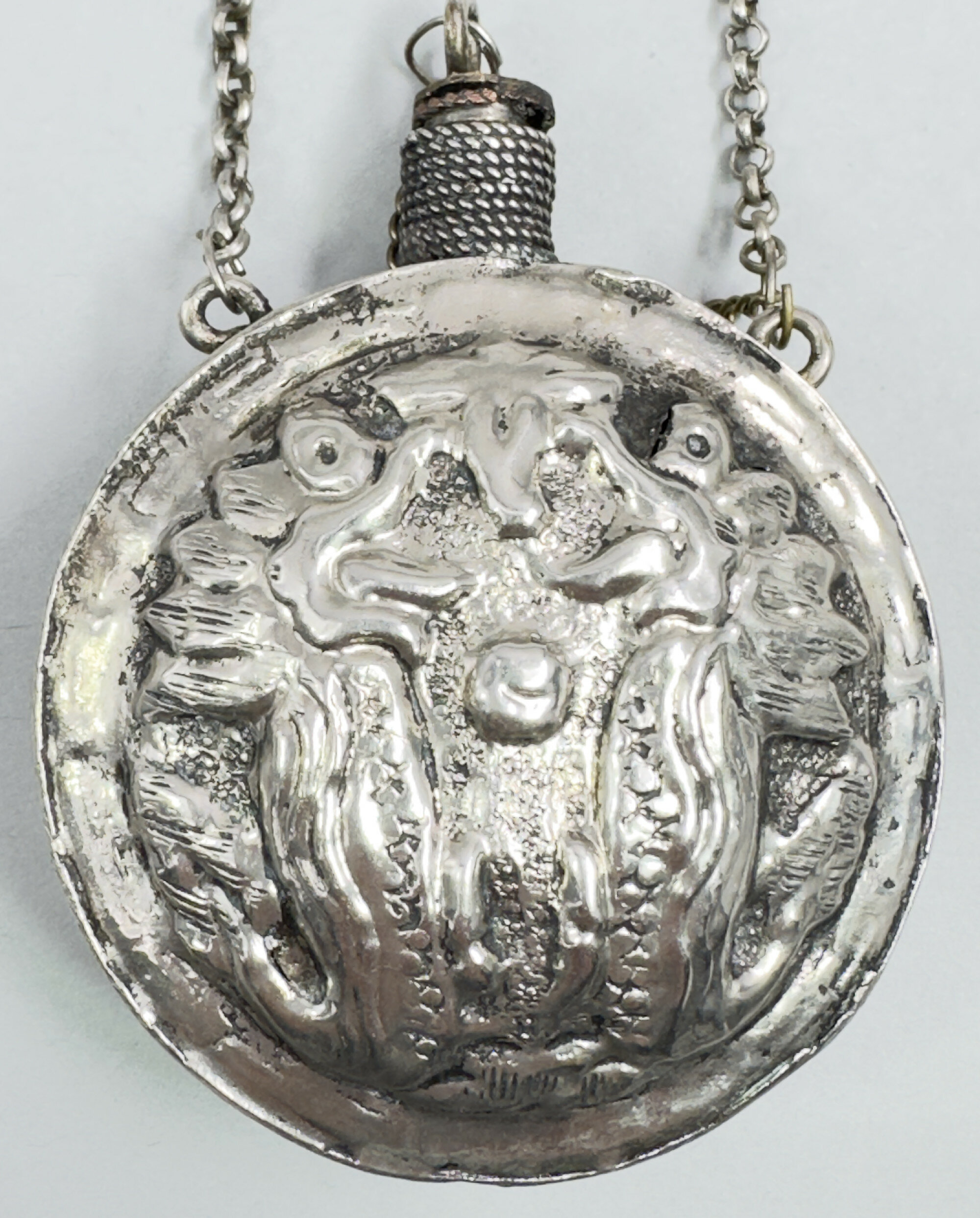
Silver plate Perfume Bottle with attached Stopper and Chain, Burmese late C19th
Price: £45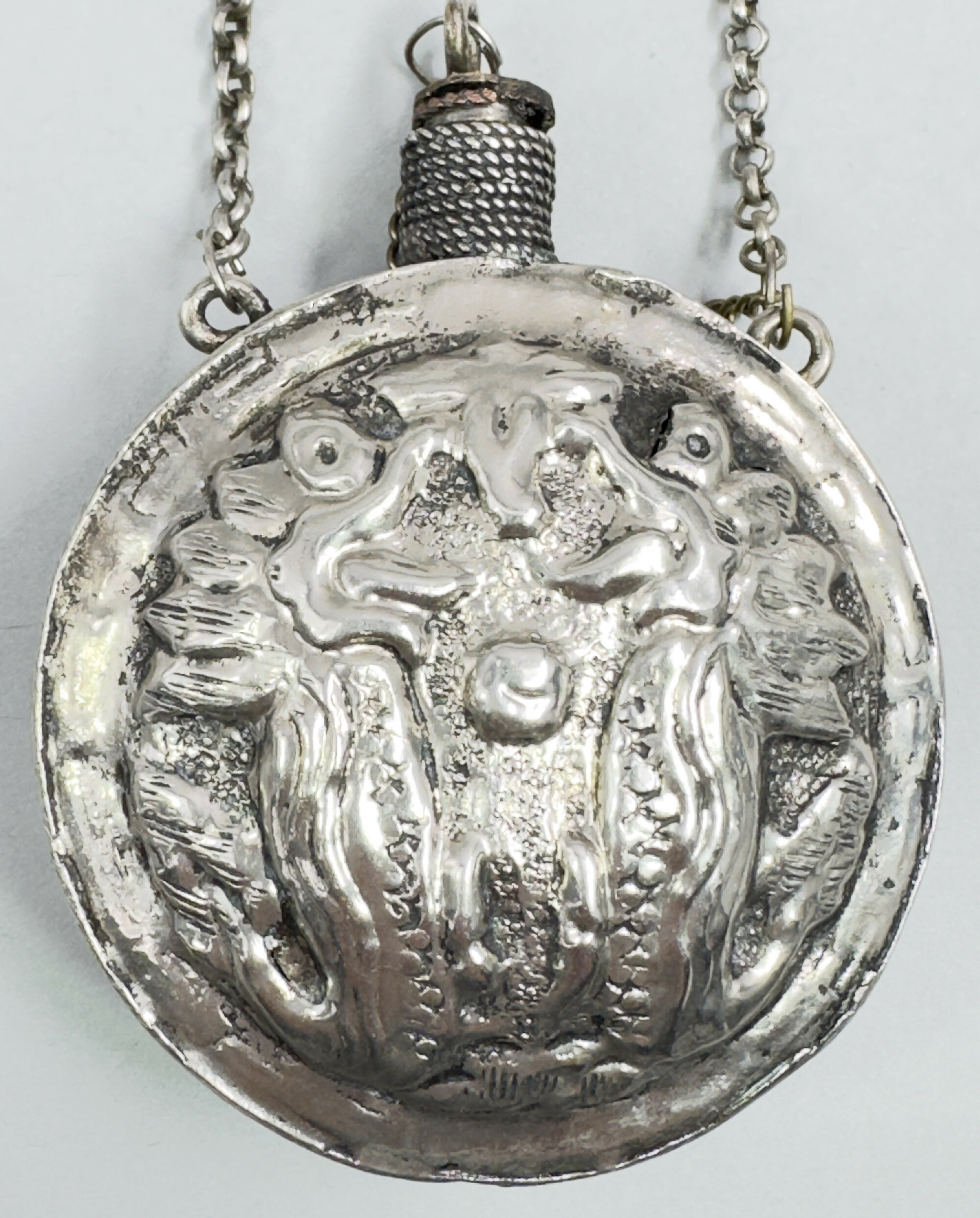
Silver plate Perfume Bottle with attached Stopper and Chain, Burmese late C19th
Price: £45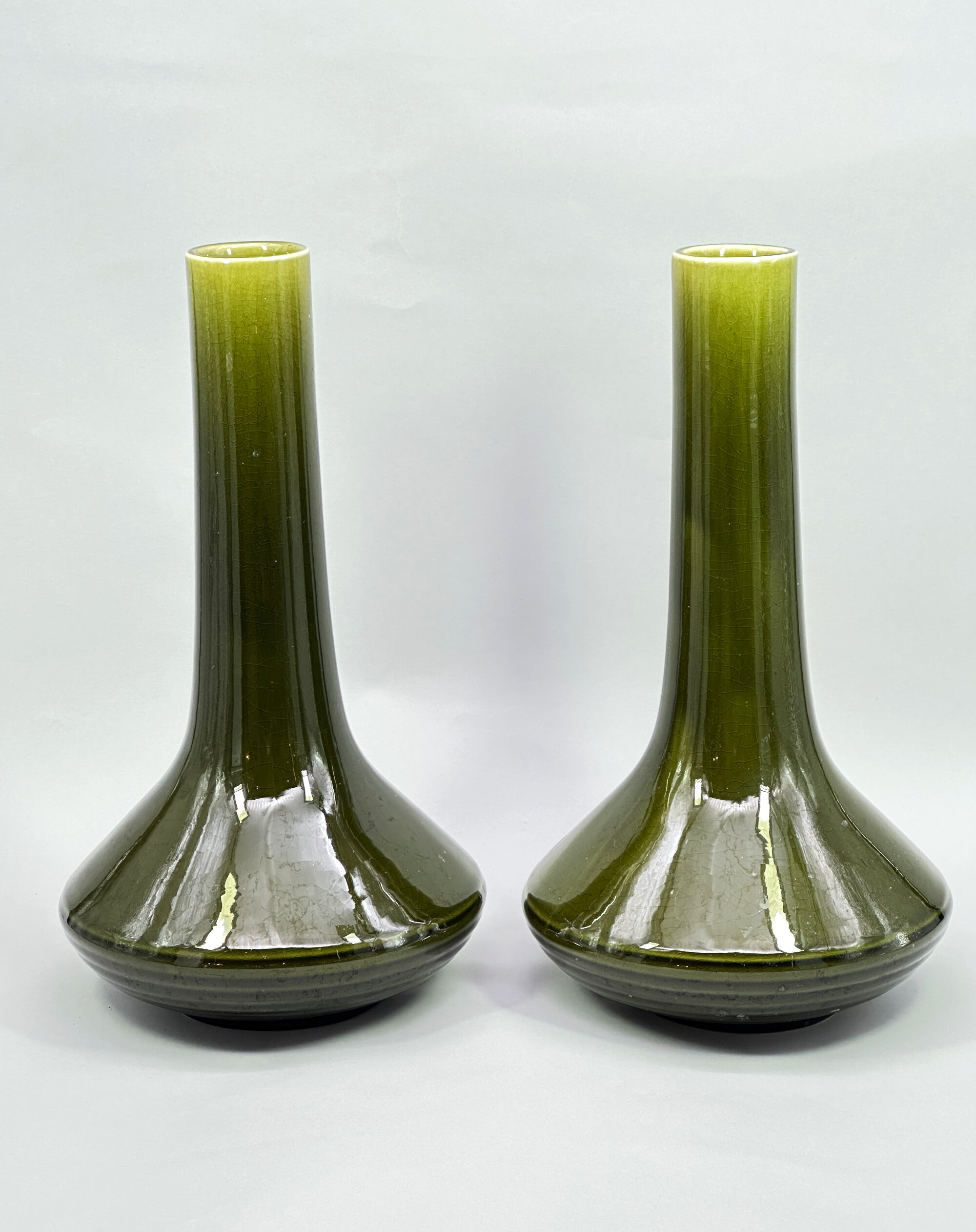
Pair of Green Glazed Bottle Vases, possibly French C20th
Price: £180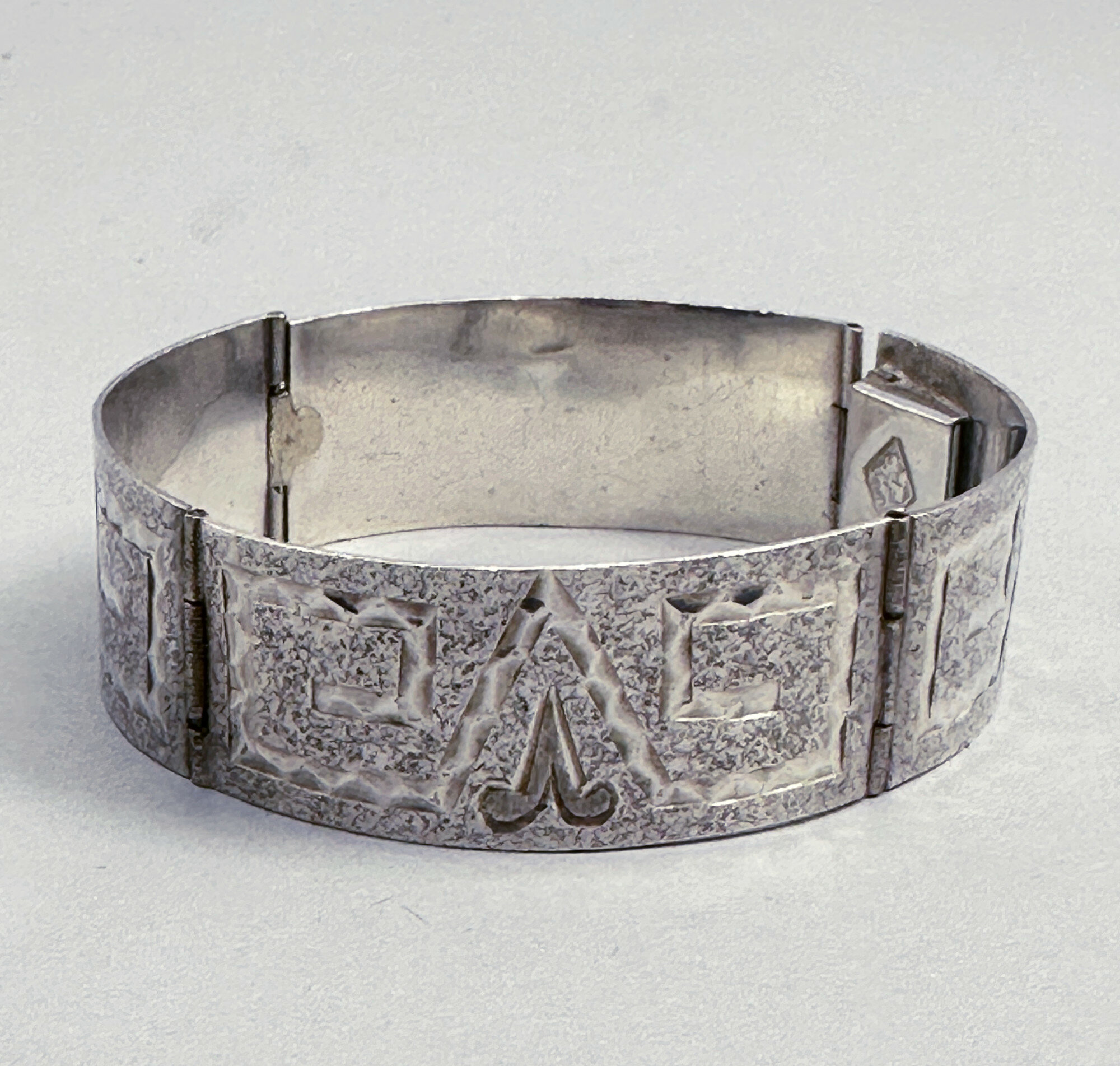
Mexican Silver Bracelet with Aztec Designs, Taxco, 1950s
Price: £65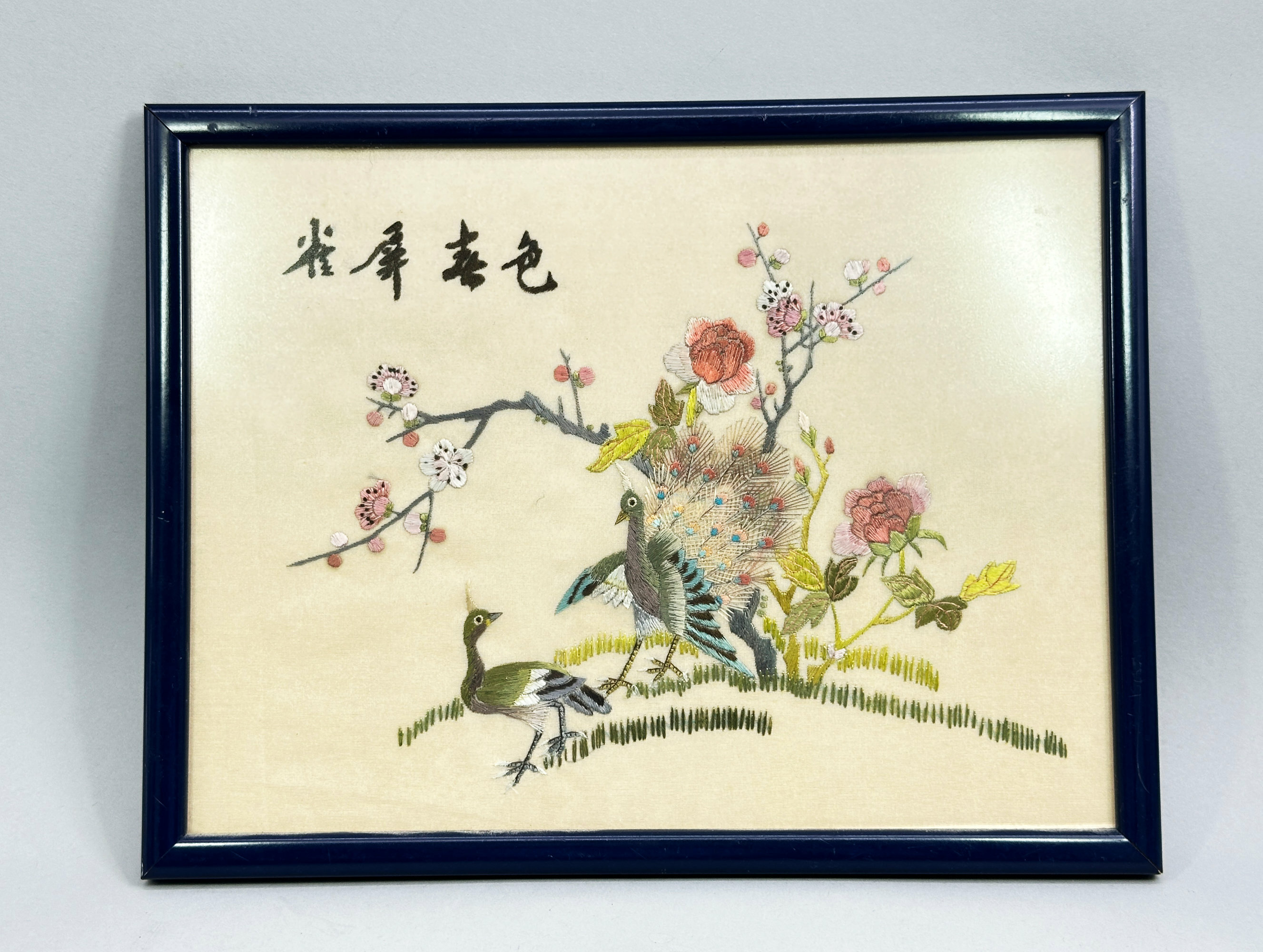
Framed Chinese Embroidery Silk Textile, signed, second half C20th
Price: £25
West German Bay Keramik Pitcher with stylised floral designs, late C20th
Price: £55Founded by Eduard Bay in the 1930s and based in Ransbach Baumbach in the heart of the main West German pottery producing region, Bay Keramik grew to be one of the most prolific producers of ceramics in the ‘West German’ style and continued production into the 1990s. This piece retains its original paper label and the format of this allows dating to the 1970s/1980s. The jug has almost a slightly rustic feel and recalls much earlier German ceramic items. The numbers on the base indicate the form number but it has not been possible to identify this.
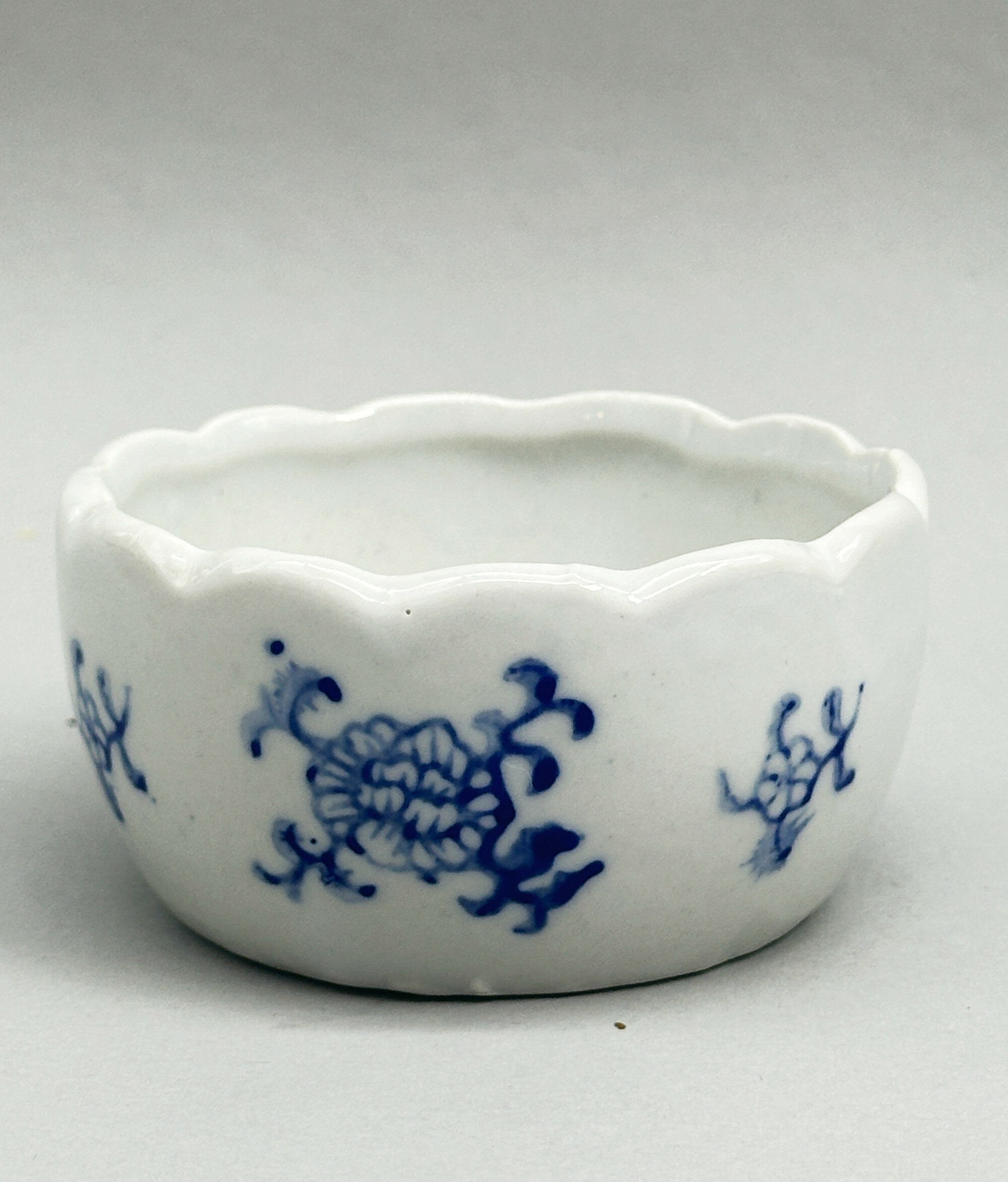
Japanese Arita Brushwasher, C20th
Price: £25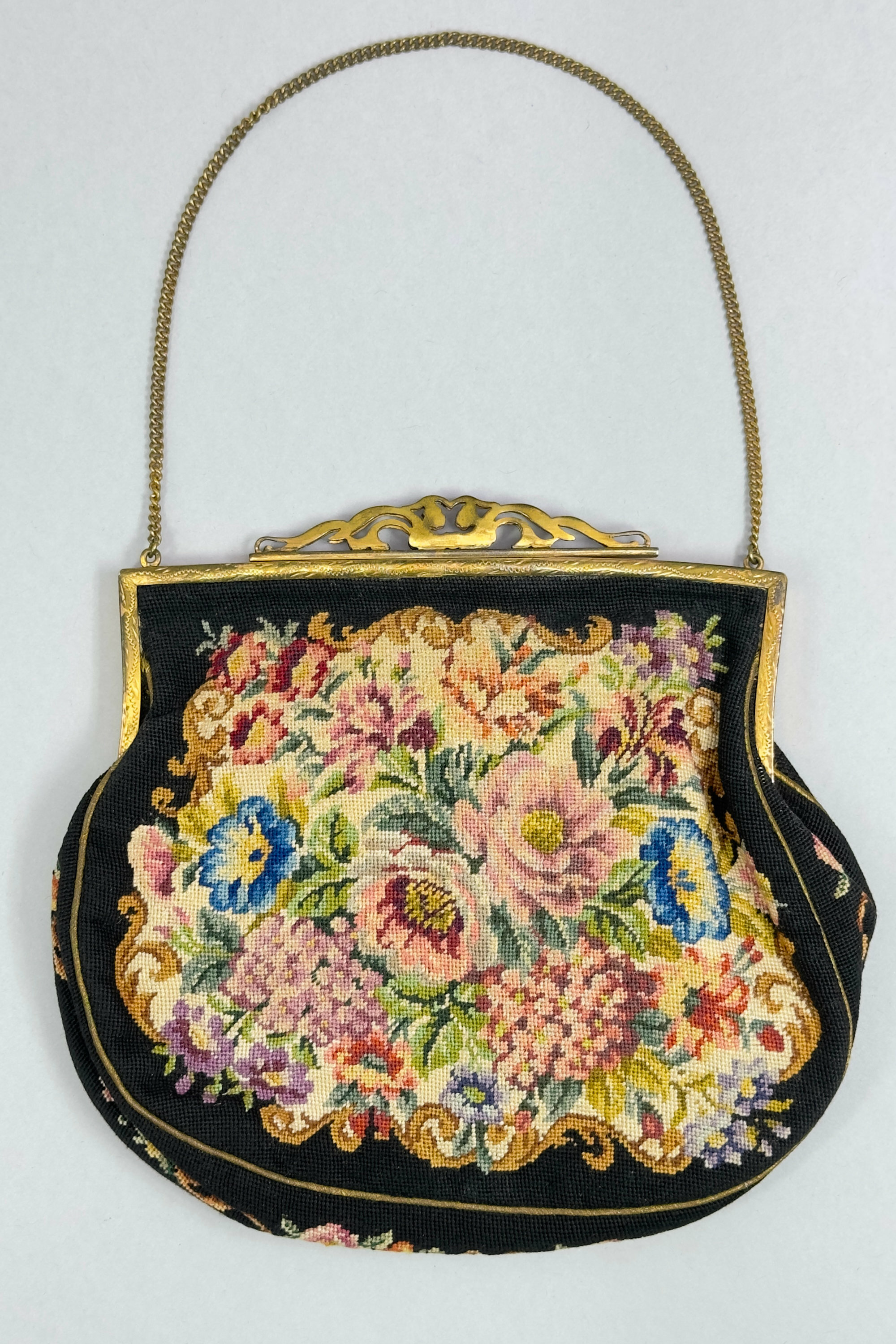
Vintage Petit Point Tapestry Bag, Austria, 1920s
Price: £15
Japanese Blue and White Porcelain Bowl decorated with hydrangea, early C20th
Price: £25Hydrangeas flourish in Japan and also carry a hidden meaning of apology and gratitude based on a mythical story of an Emperor, who angered a woman he loved by neglecting her, and gave her in recompense a bunch of blue hydrangeas as a symbol of his deep emotion and gratitude. Used here as a decorative motif, the painting of the flowers is skilful and elegantly combined with the plainer exterior. The paste of the foot rim suggests an early C20th dating, perhaps to the late Taisho era (1912-1926).
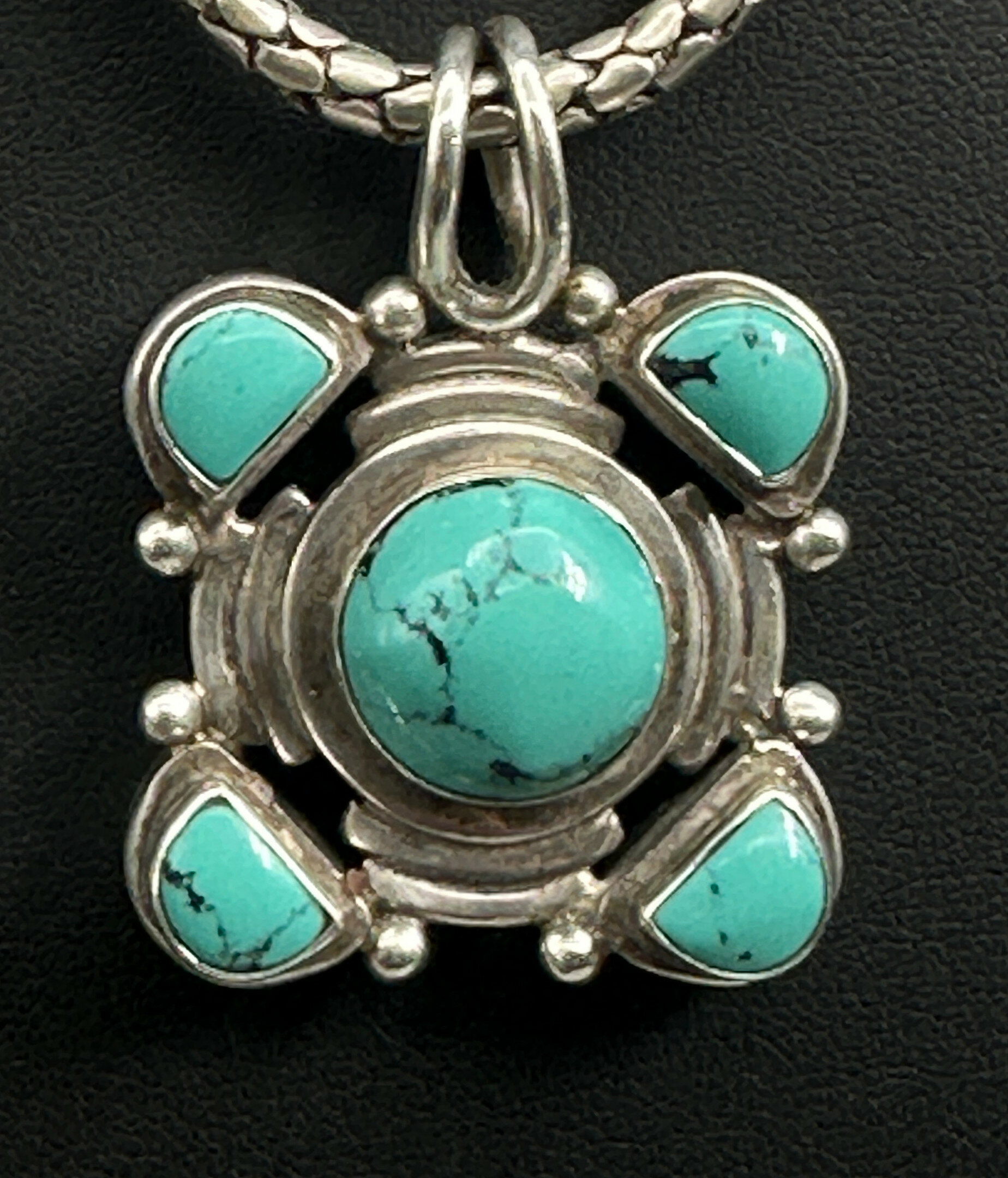
North American Turquoise pendant necklace c1990
Price: £150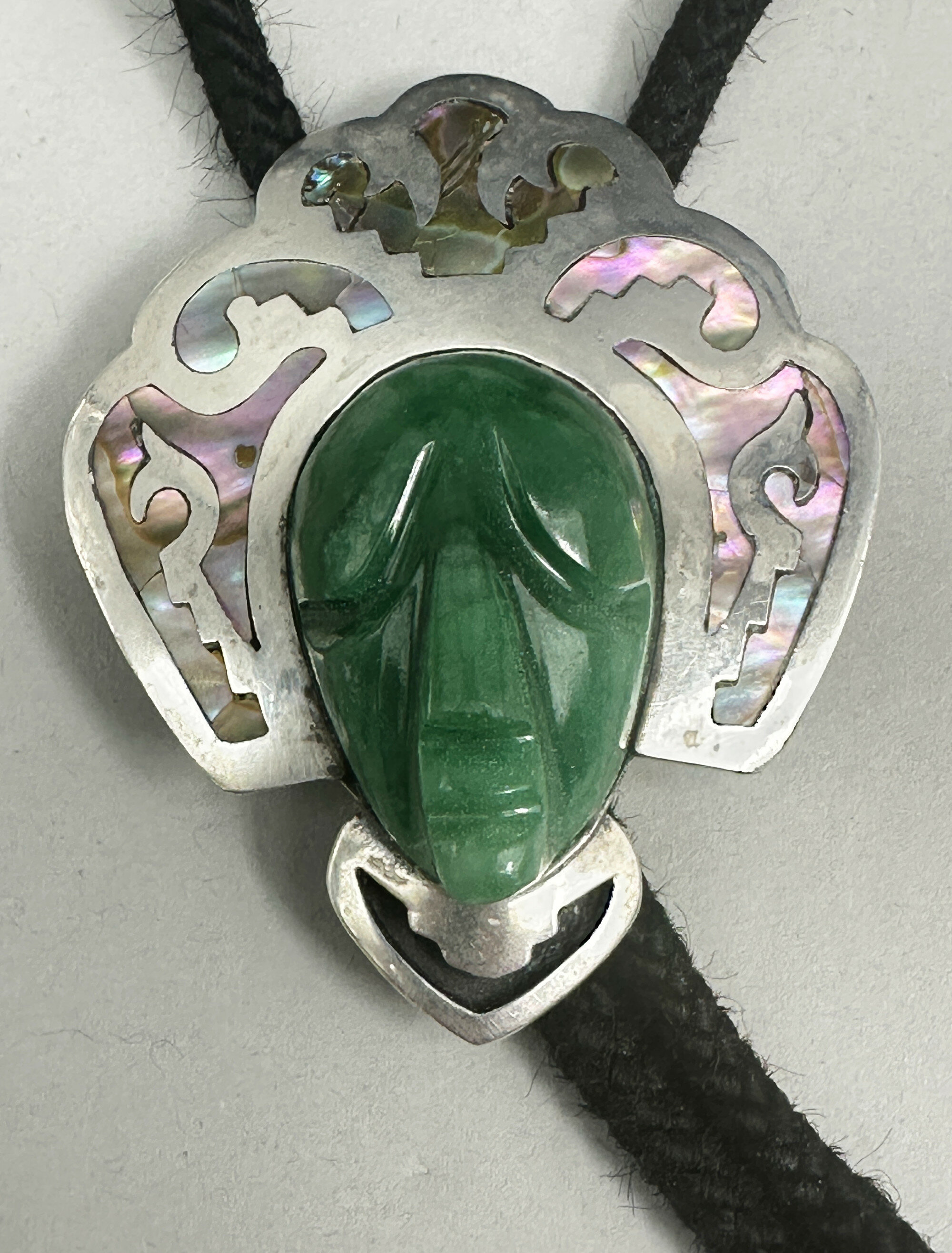
Mexican Silver Bolo Tie with Aztec mask Head, Taxco, c1950
Price: £125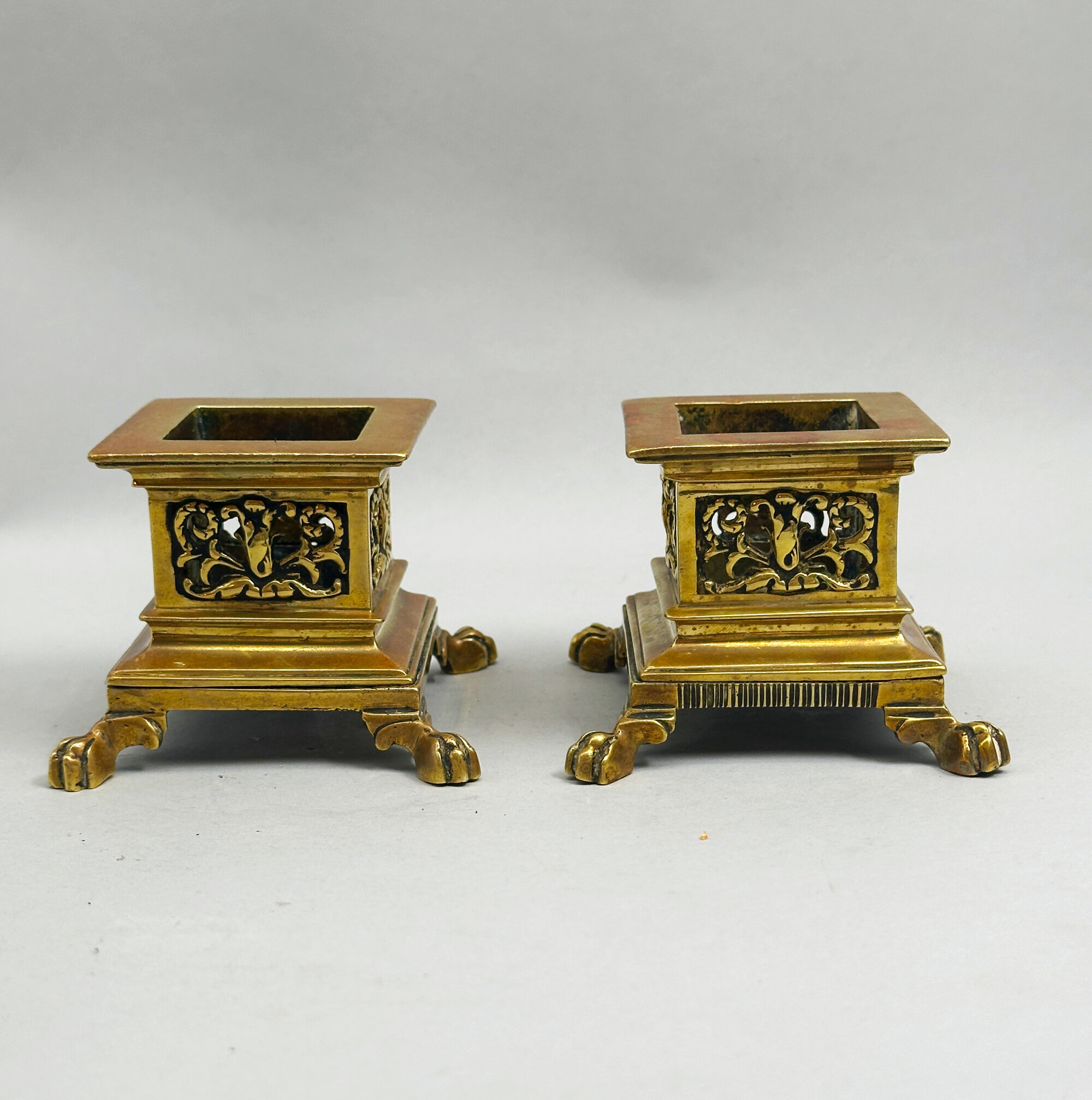
Pair of Georgian Style Square Gilt Bronze Table Salts, English C19th
Price: £45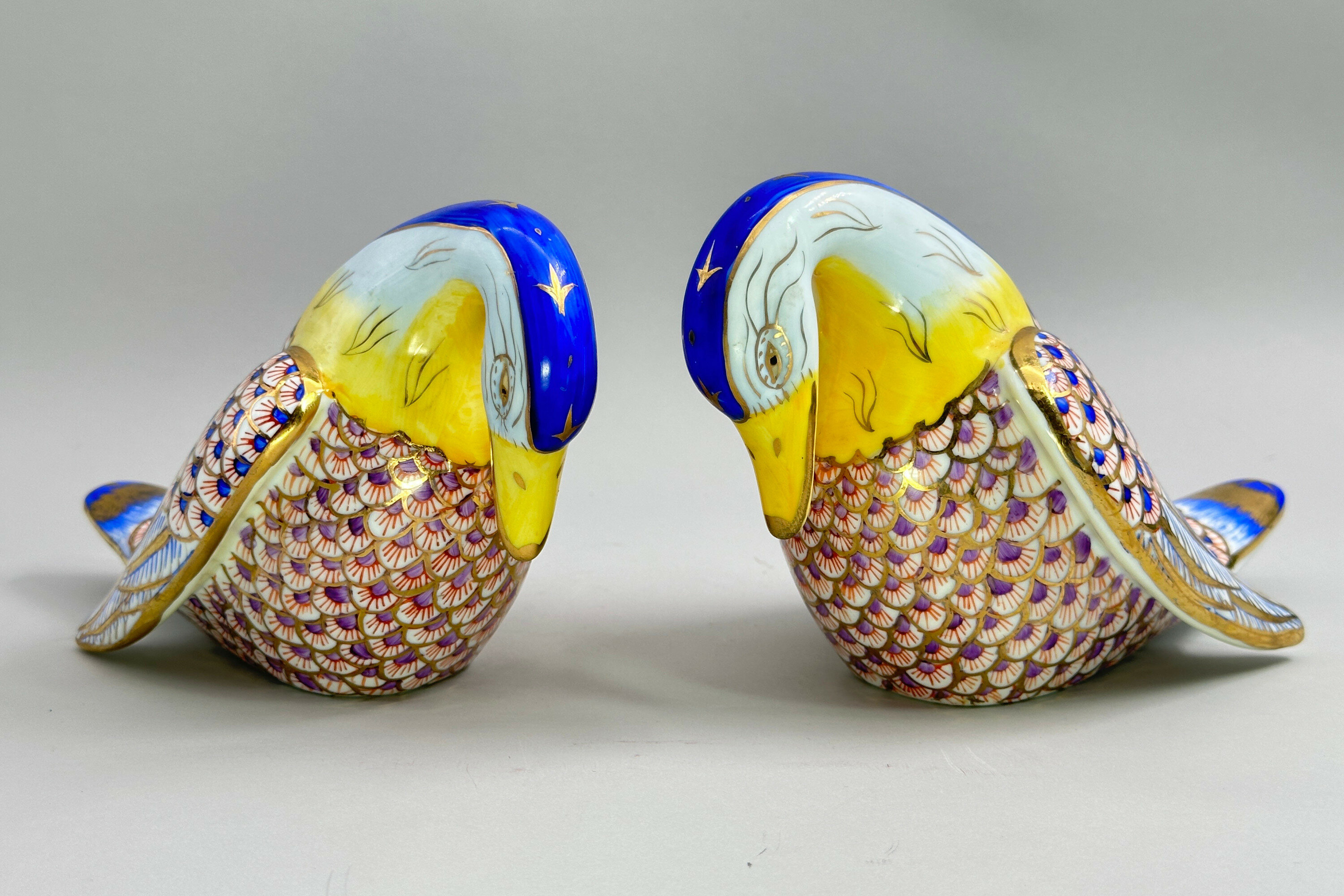
Pair of Ceramic Figures of Swans, probably continental, C20th
Price: £45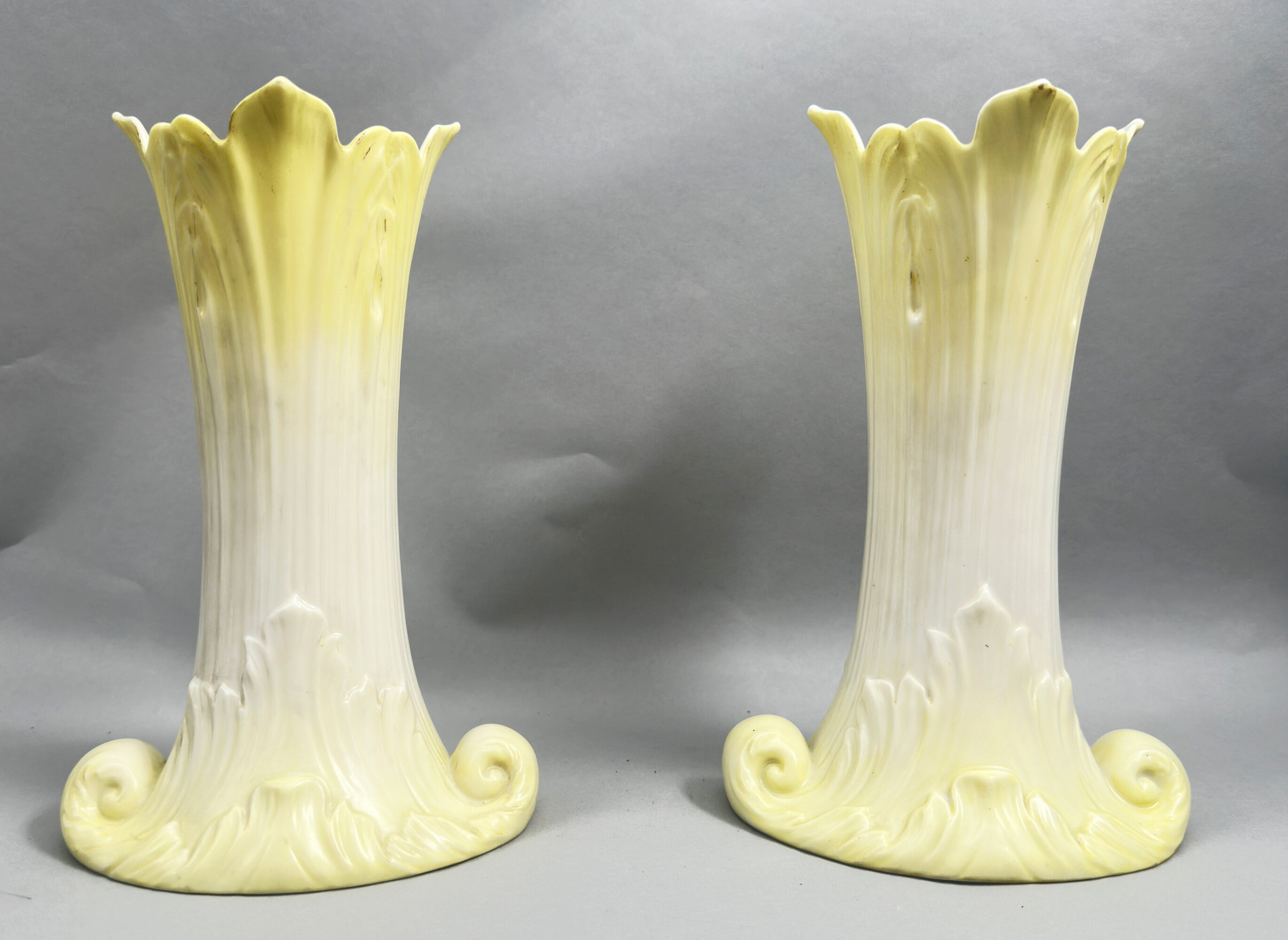
Pair of Royal Worcester Grainger and Co Vases, date mark for 1902
Price: £150The influence of the Art Nouveau movement, with its emphasis on organic and plant forms, is clearly seen here. The vases date to the early 1900s and were made by the ‘Grainger and Co’ branch of the celebrated Royal Worcester factory. The first porcelain factory at Worcester was set up in 1751 by John Wall (a doctor) and William Davis (an apothecary), along with 14 other businessmen. Fifty years later in 1801 Thomas Grainger (1783–1839) started a rival company ‘Grainger’s Worcester Porcelain’ and during the nineteenth century both companies traded successfully. However following the death of George Grainger, the son of Thomas Grainger, in 1889 the Grainger factory was sold to Royal Worcester who continued manufacture on its old rival firm’s St.Martin’s Gate site until finally closing the works in 1902. Ivory style porcelains were one of the specialities of this brief manufacturing period and the date mark ‘L’ which appears on these vases is for the year 1902, just before the two concerns were completely merged.
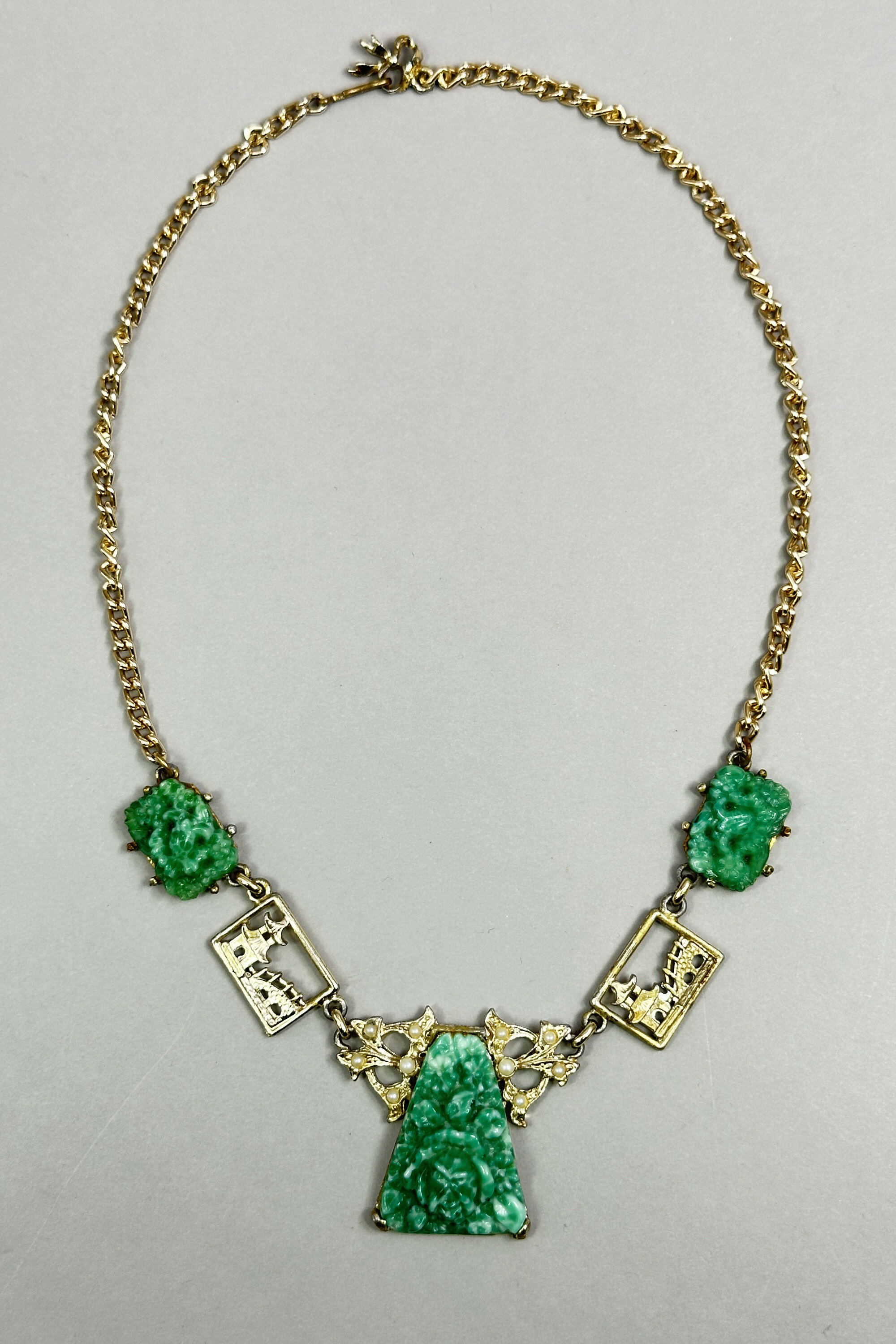
Chinoiserie necklace with peking glass plaques c1960
Price: £45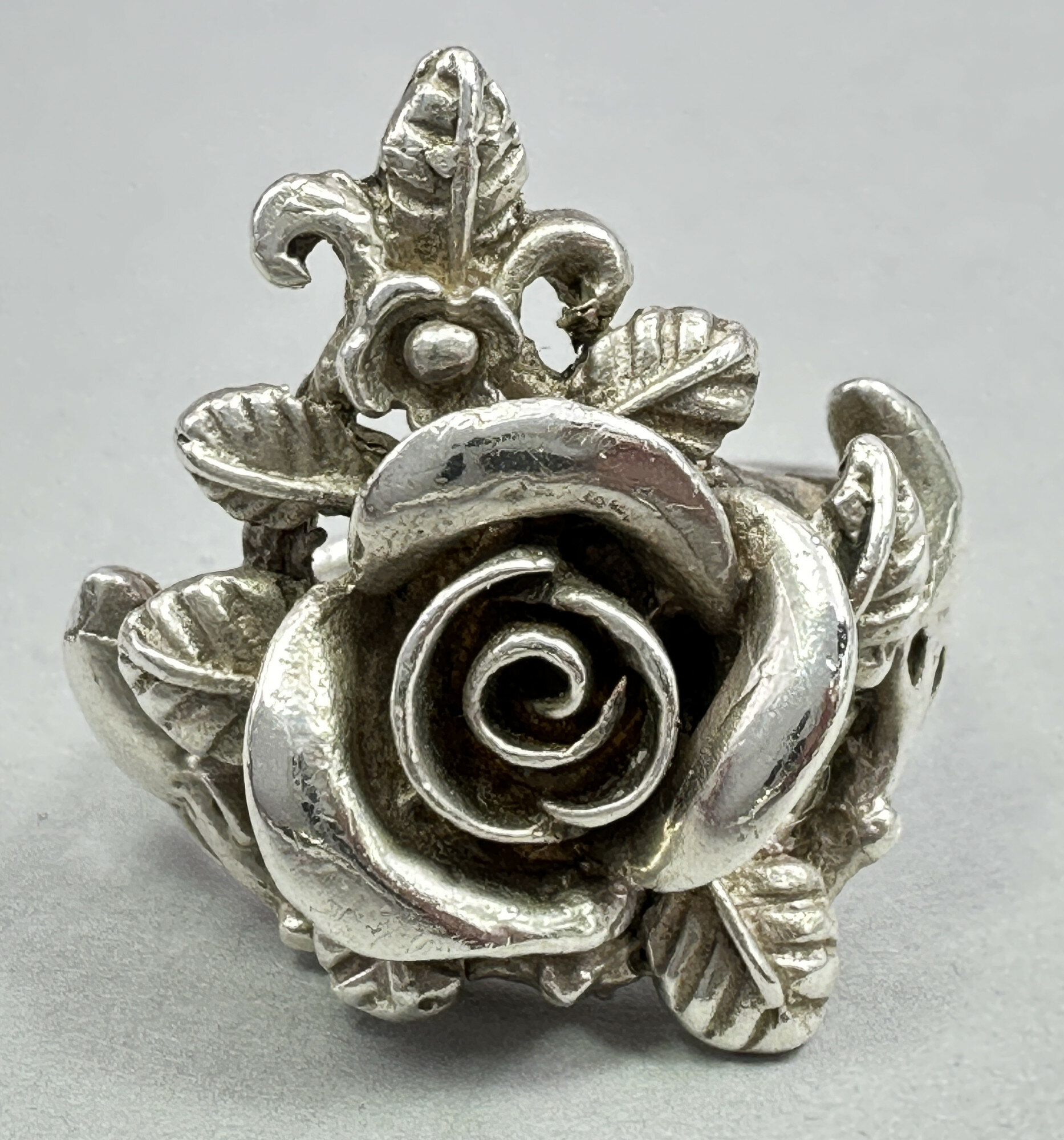
Silver rose ring, 20th century
Price: £35
Silver Snake bangle, 20th century
Price: £25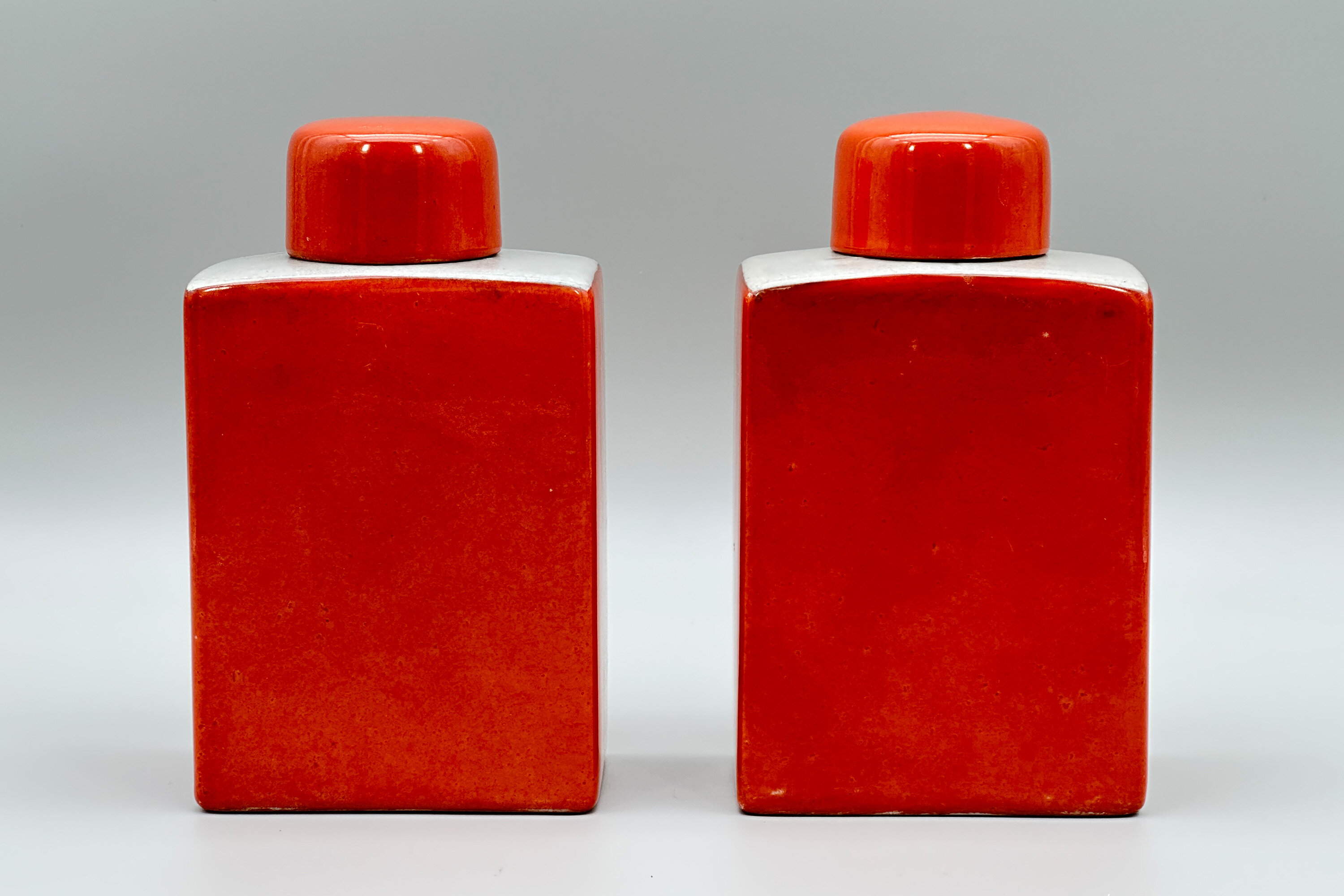
Pair of Orange Glazed Flasks and Covers, Fabienne Jouvin Paris, C20th
Price: £150The French designer Fabienne Jouvin (see image 9) graduated from the superior school of applied arts Duperré in 1985. Since then, she has travelled the world collecting designs for pieces sold and exhibited under her name internationally, with a studio based in Paris. On her website, she writes “From my travels - from Tokyo to The Habana, from the streets of Paris to the sea bed of The Maldives - I bring back sketchbooks, pads of notes, drawings and collages: hispanic or contempory architectures, faces reminding those of Piero Della Francesca, enigmatic objects non identified... These spontaneous sketchbooks give rise to unique pieces and editions painting, textile, porcelain, cloisonné...”. Her first exhibition was in 1989 and in 1996 she began an association with the firm ‘Asiatides’ allowing her to create pieces made in China and Thailand and utilising their designs and techniques.
This pair of flasks, possibly intended as tea caddies, are typical of her ability to give a ‘twist’ to the pieces from which she draws her inspiration. The shape is Chinese from the seventeenth century (see image 10), while the iron red colour is found on Chinese pieces two hundred or more years later. Combining this with a white ‘crackle glaze’, also well known from Chinese ceramics, was Jouvin’s own idea completing the mix of ancient and modern. Marked as from the Asiatides range with the stylised ‘A’, pieces like these are no longer available currently implying that they were probably made early on in her association with the firm and now have a uniqueness of their own.
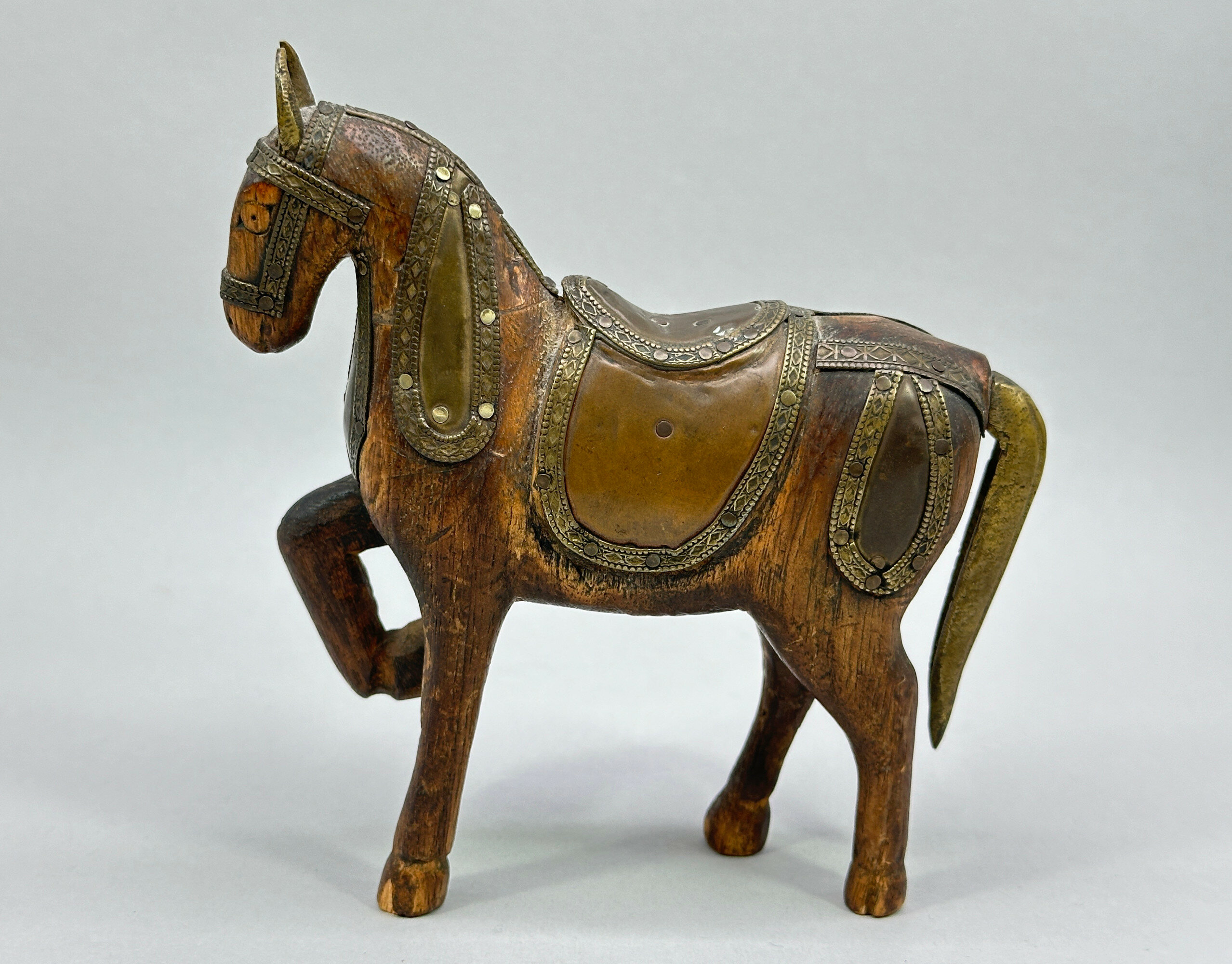
Indian wooden toy model of a Horse with metal fitments, early C20th
Price: £25
Two mounted Wedgwood blue jasperware Cameo Brooches, C19th, C20th
Price: £10PLEASE NOTE THAT THERE IS FREE UK SHIPPING ON THIS ITEM. For international buyers the shipping cost will be reduced by the UK shipping cost, so don't worry if you are outside the UK, you still receive this benefit!
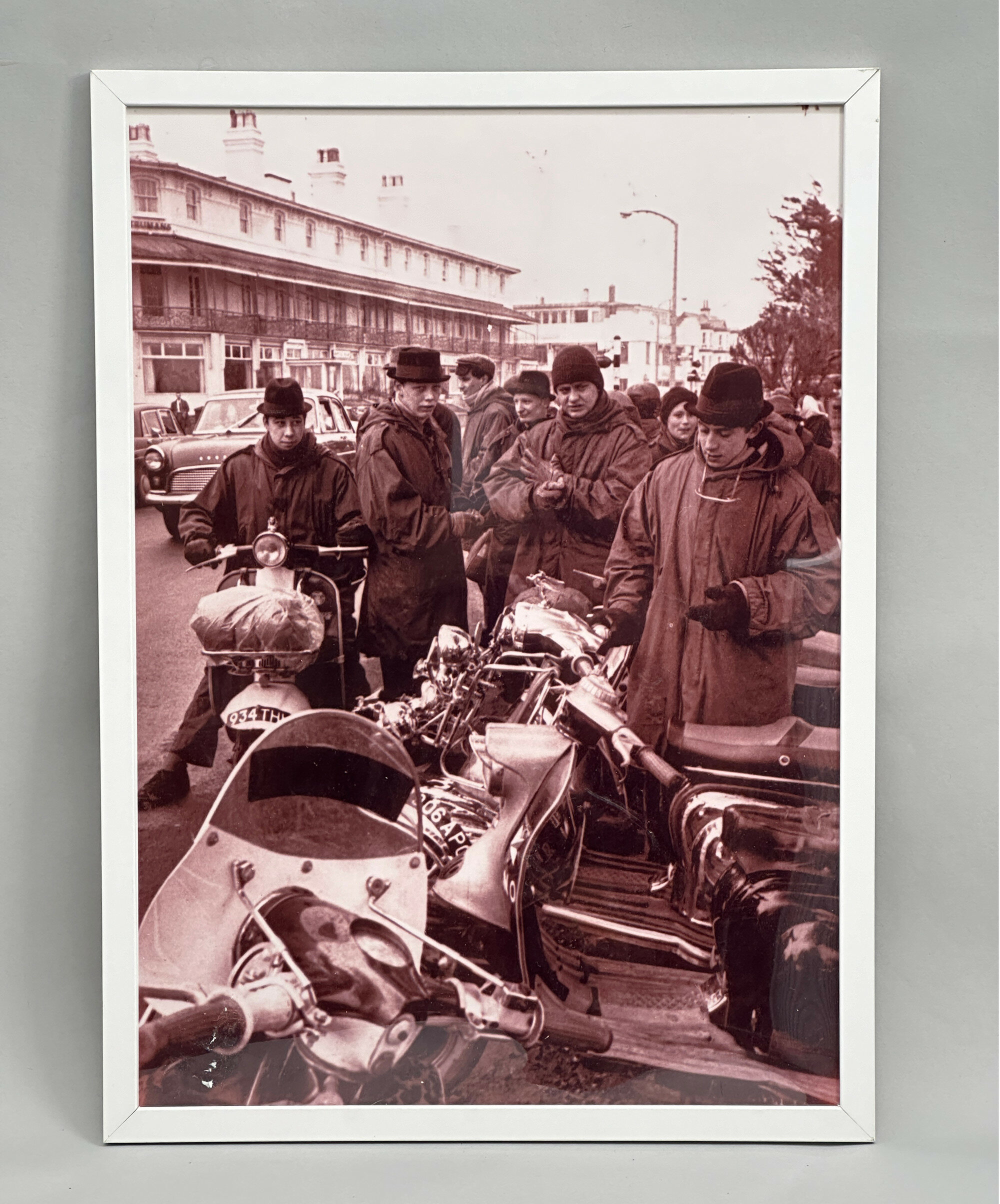
Mods at Clacton 1964, Photograph by Terry Disney for the Daily Express
Price: £45It was, though, a newsworthy confrontation and press photographers were sent in to record events. The most notable of these was Terry Disney who worked for the Daily Express newspaper. Disney was a distinguished and prolific photographer from the 1960s onwards and many of his striking images survive, not least those capturing the major personalities of the entertainment world at the time, including the Beatles themselves. His images of the ‘mods’ (he seemed less interested in the ‘rockers’) capture the atmosphere of the scenes vividly and this photograph is an excellent example of his work on that Easter weekend (for another see image 5). Often only obtainable under licence, this print is an ideal opportunity for a collector to acquire a near iconic image. It is offered with a very basic frame which might well be replaced with something which would enhance the photograph more sympathetically.
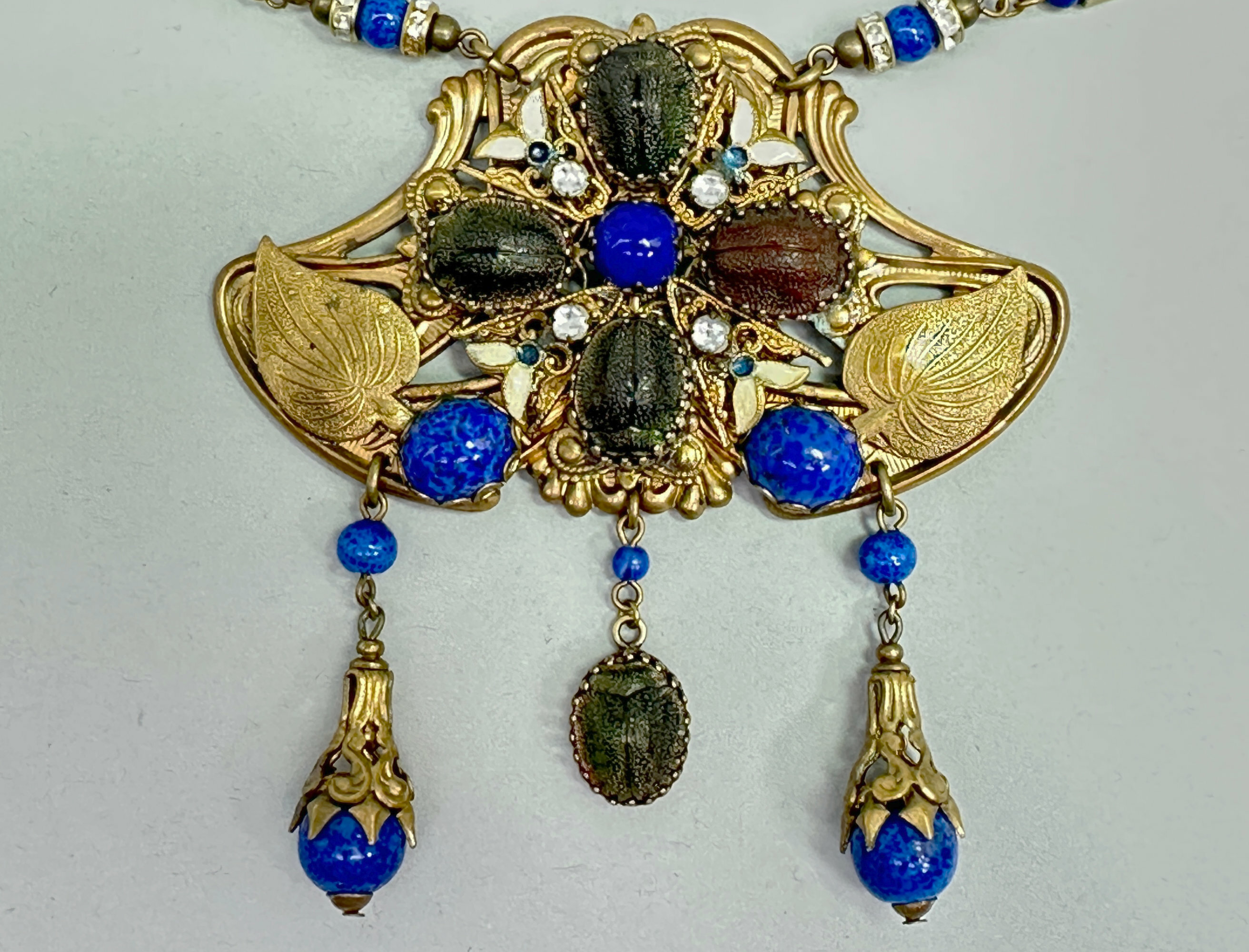
Egyptian Revival Czech statement necklace set with real beetles c1920
Price: £150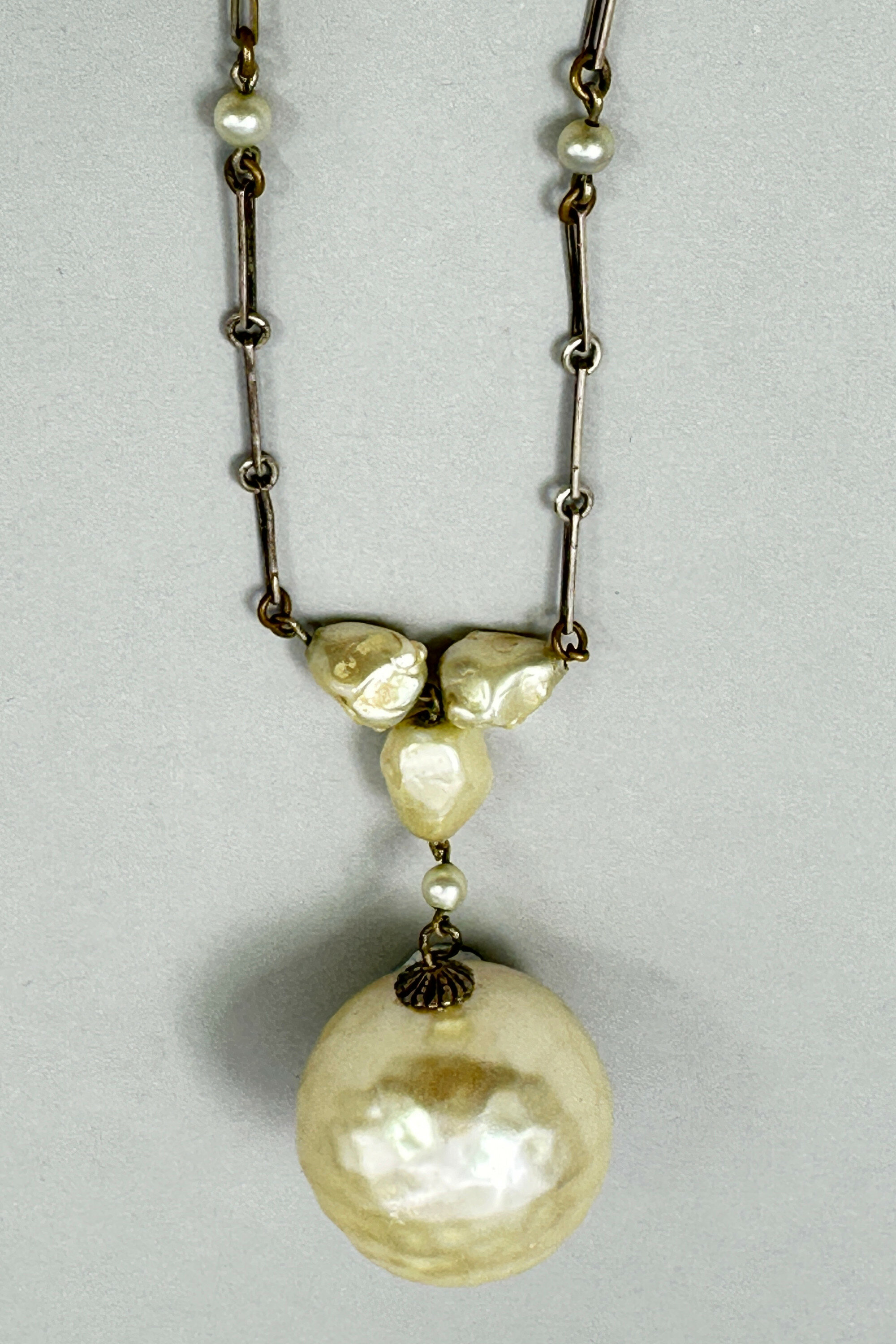
Faux pearl necklace c1910
Price: £15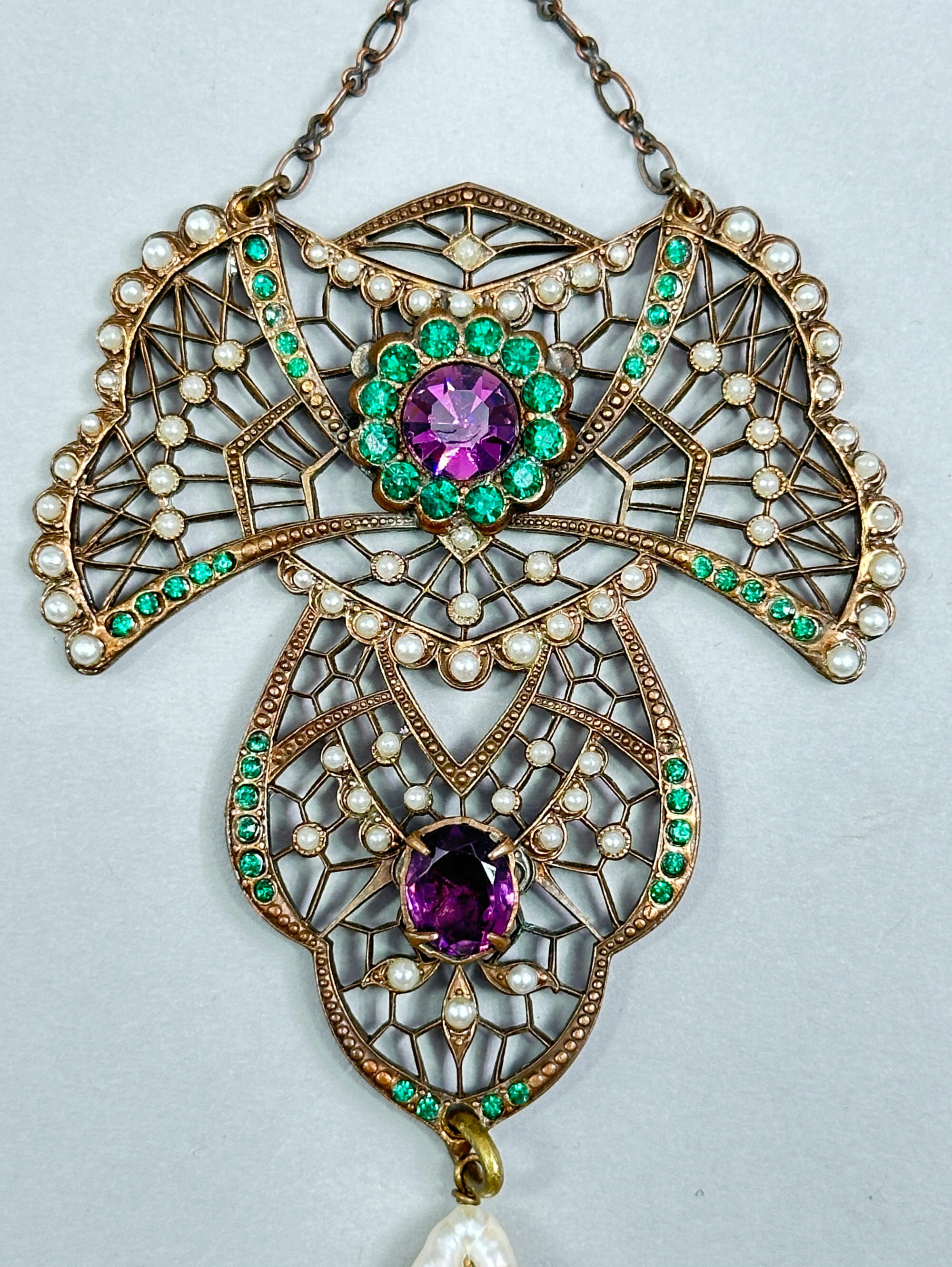
Art Deco statement necklace with real pearls and paste stones c1920
Price: £50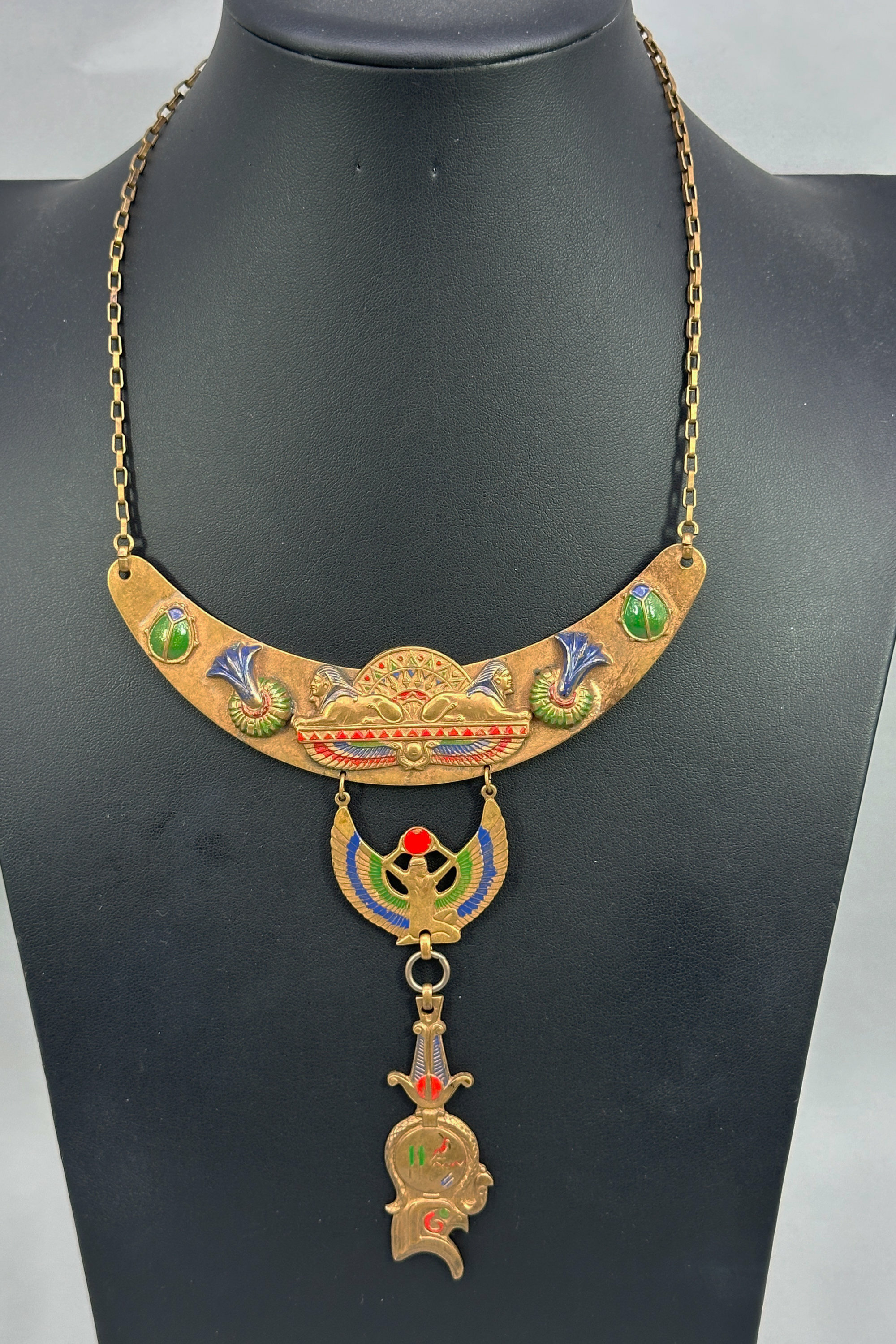
Egyptian Revival statement necklace c1920
Price: £85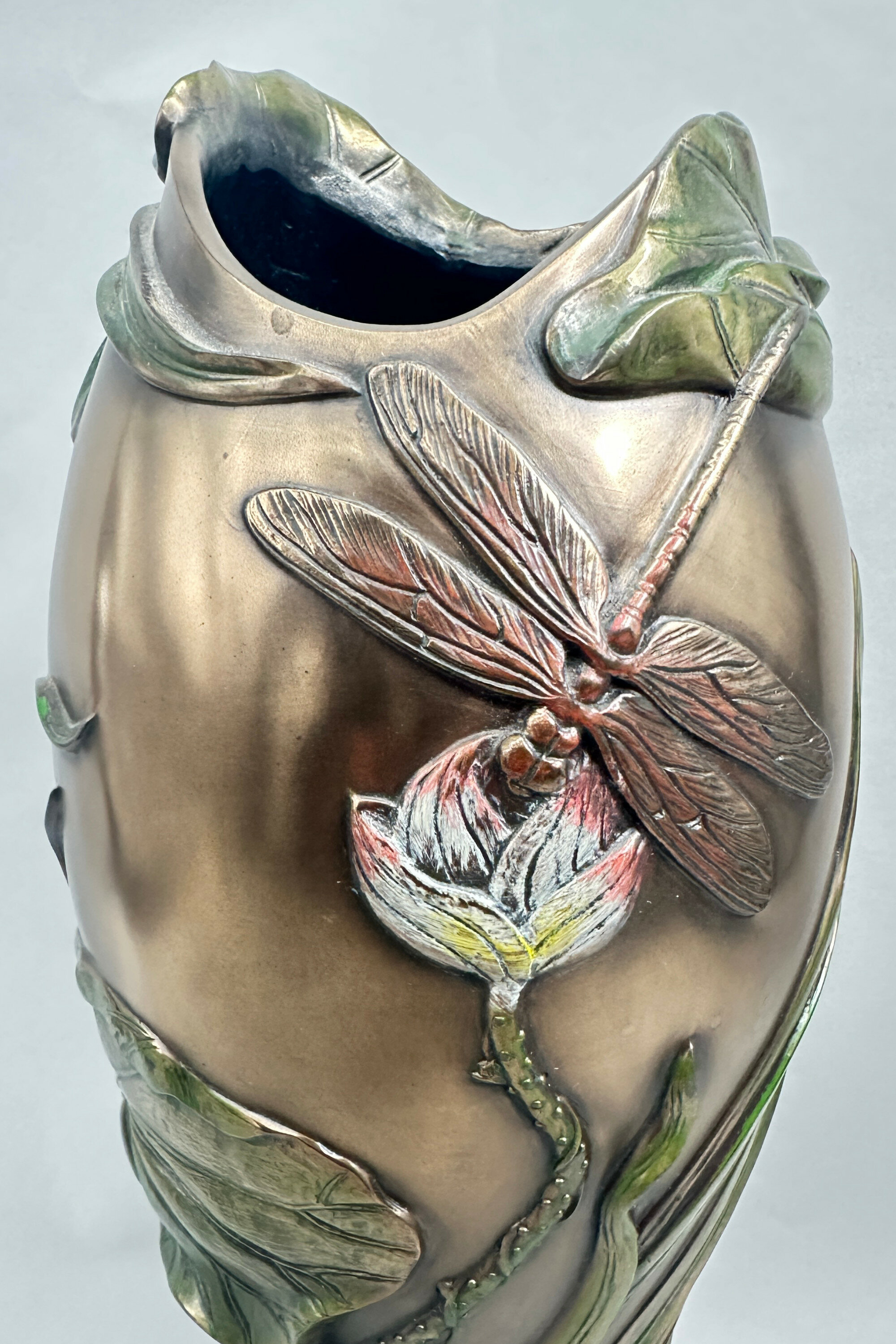
Past Times Art Nouveau Style Vase, Veronese Collection, 2004
Price: £45‘Past Times’ was founded in 1986 by John Beale, at first as a mail order company but then trading from physical stores and developing into a business which enjoyed enormous popularity with over one hundred shops in the early 2000s. The stock was focused on retro and vintage style items also including a wide range of licensed products, such as Harry Potter and Beatrix Potter merchandise. Badly impacted by the recession in 2008 it went into administration in 2012 and was bought by W.H.Smith a year later leading to the disappearance of its products from the marketplace.
This ‘Art Nouveau’ vase can be seen as an example of their range at its best. Manufactured with care it presents an appealing souvenir of the era it aims to recreate at a rather more affordable price than the authentic originals.
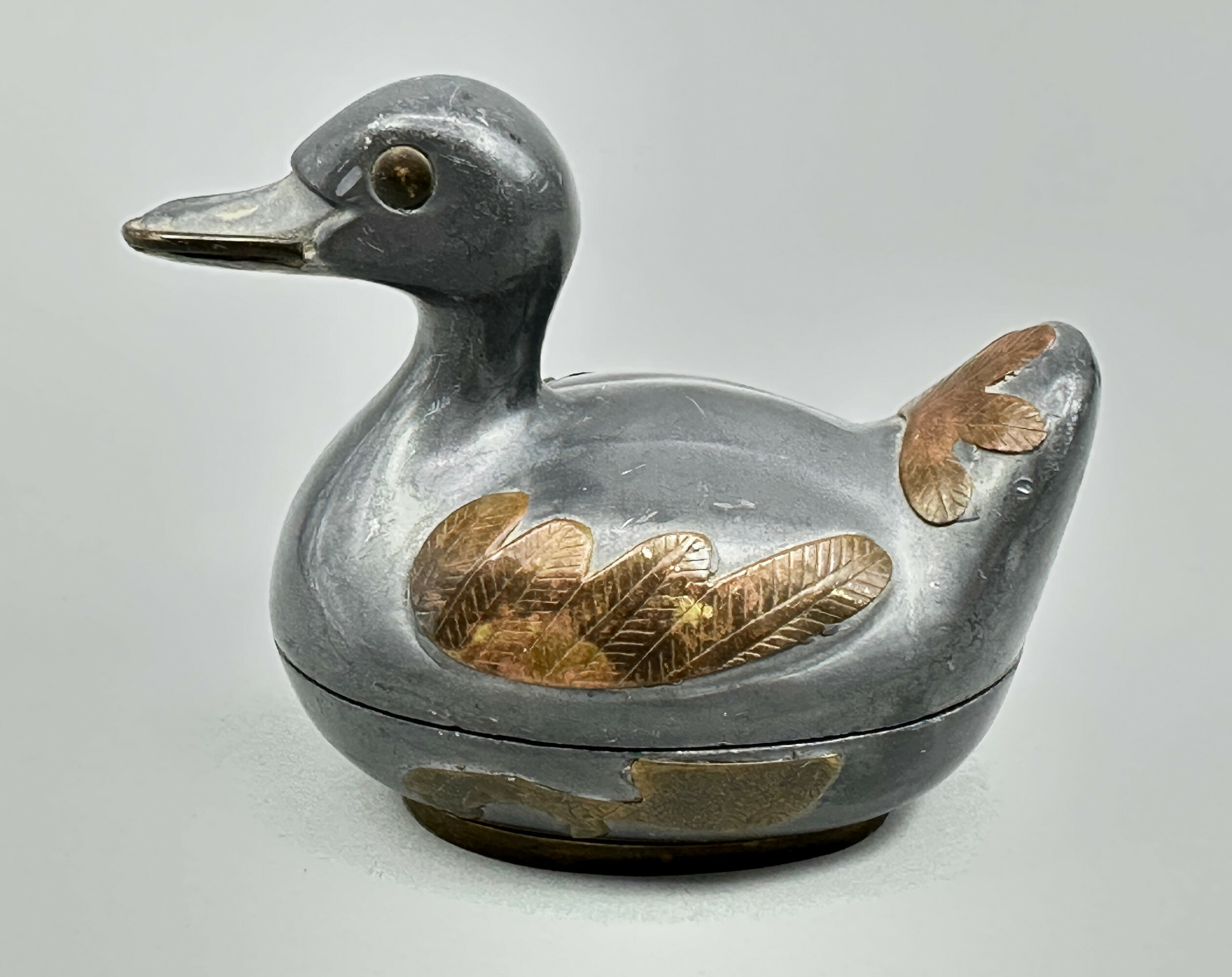
Pewter and brass box and cover in the form of a Mallard Duck, Gatco, Hong Kong, 1960s
Price: £25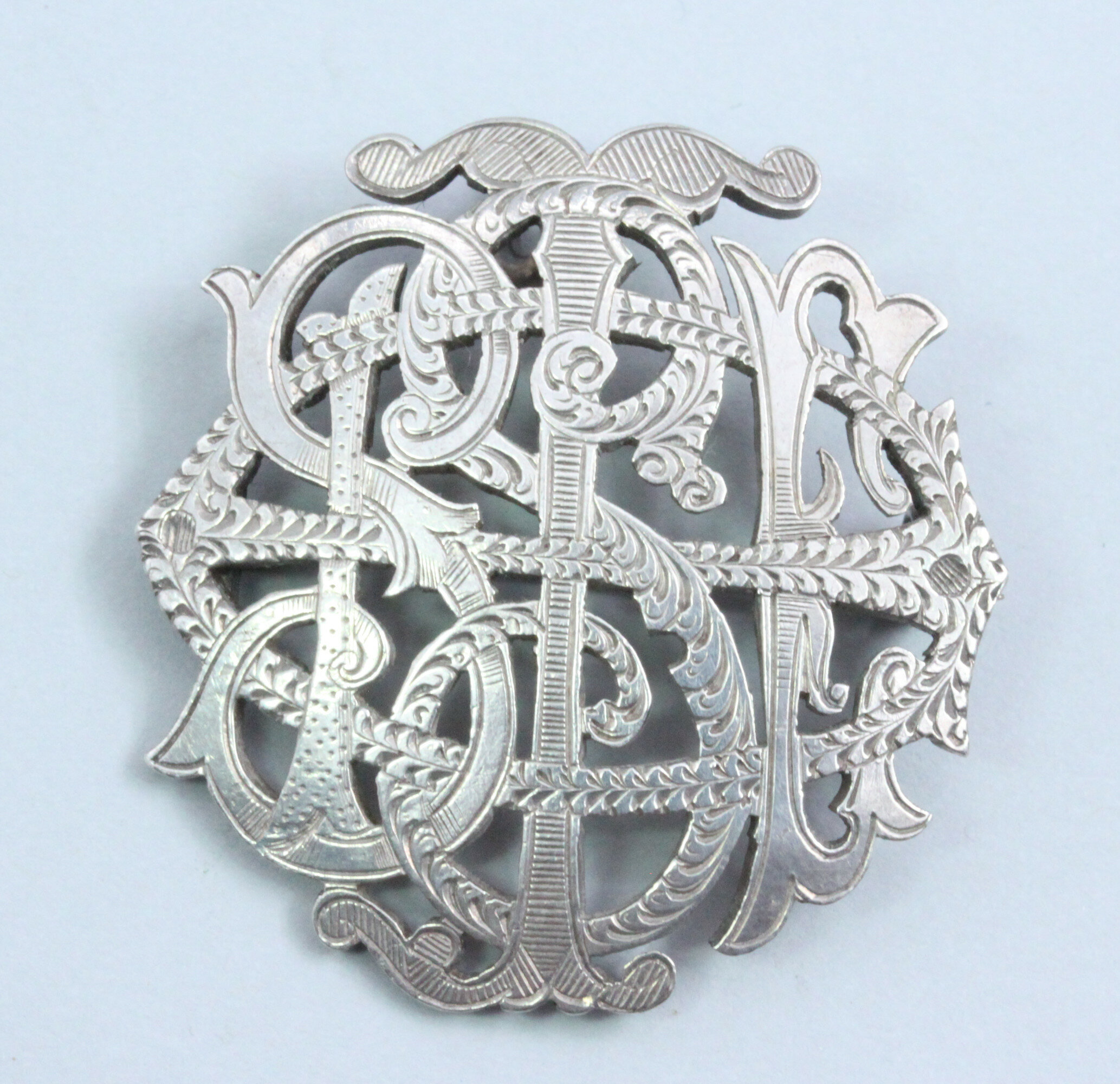
Silver Monogram Celtic Style Brooch Hallmarked 1878/1879
Price: £45An advert for Edwin Umfreville appeared in 'The Bazaar, The Exchange and Mart - 19th April 1879' where one of his pieces is described. "Like all the “ E. U." jewellery that we have seen, the workmanship is first-class, and the design most tasteful."
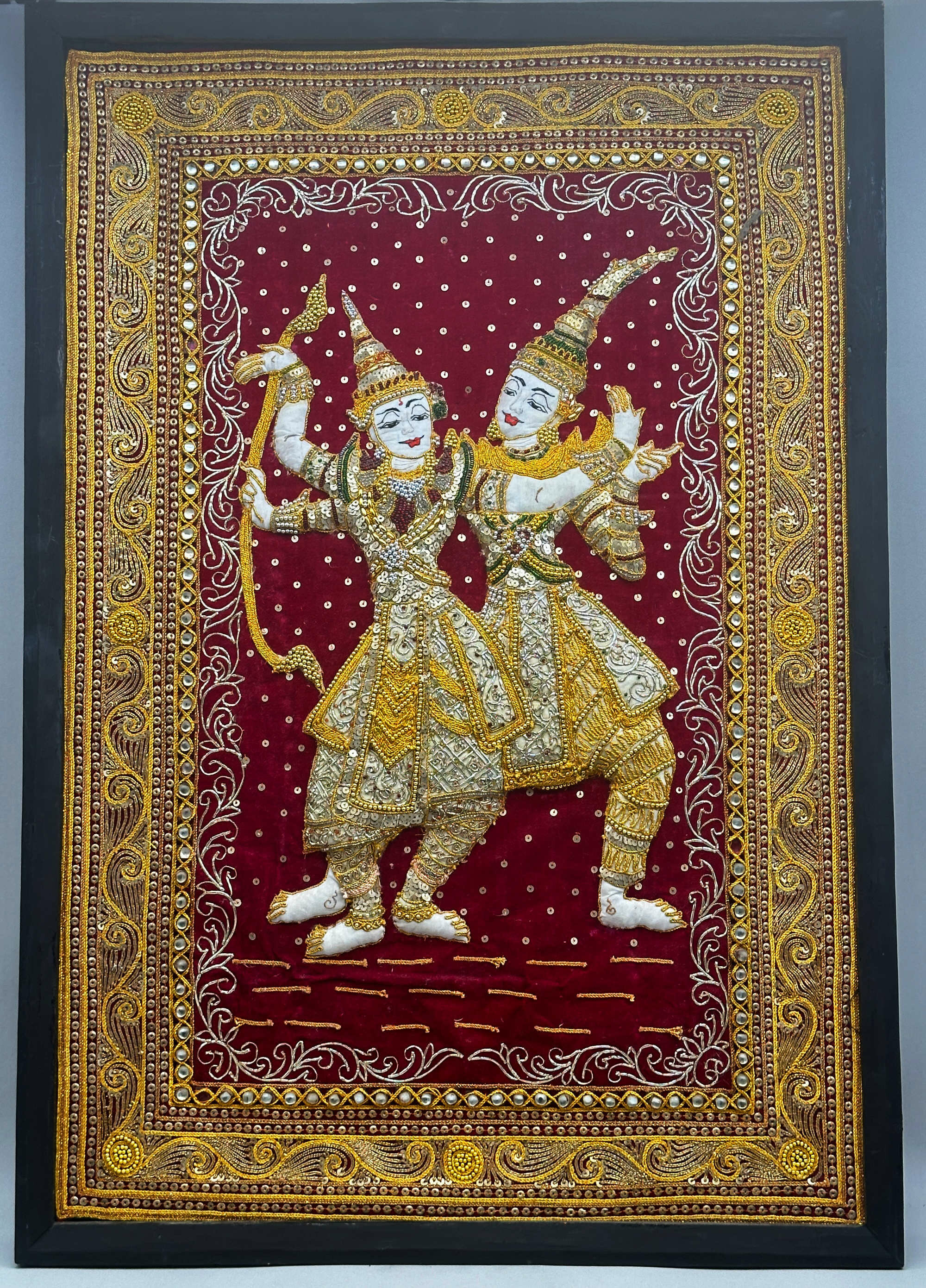
Large Burmese Textile with two dancing figures, probably second half C20th
Price: £110The distinctive style of embroidery and applied work here is typical of Burmese work known as ‘Kalaga’ which means ‘curtain’ in Burmese and is used to refer to heavily embroidered appliqué tapestry sewn with a technique called ‘shwe gyi do’. First produced around 150 years ago, Kalagas are generally linen, silk, cotton or velvet background fabrics embellished with sequins, embroidery, beads, coloured stones, tiny pearls, coral, braids and metal threads, the choice of materials depending in part on the client’s budget. Cotton padding was used to produce the ‘3D’ effect seen here and on many other examples of the work. The elaborate decoration meant that some of the larger pieces could take many months to produce which is likely to have been the case here. Dating is difficult and a mid C20th attribution here is probably sensible but an earlier period of manufacture is quite possible. The hanging has been recently mounted on board and fitted with a simple frame making it ready for display in a contemporary interior.

